This document provides a table of contents for the Book of Jasher, which is referenced in the Bible but not included. It lists 51 chapters that summarize major biblical stories like the creation, Noah's ark, Abraham offering Isaac, Joseph's dreams and being sold into slavery in Egypt. The introduction questions whether this is the actual lost Book of Jasher referenced in the Bible or a later work based on biblical stories. It was translated from Hebrew to English and published in 1887 in Salt Lake City.
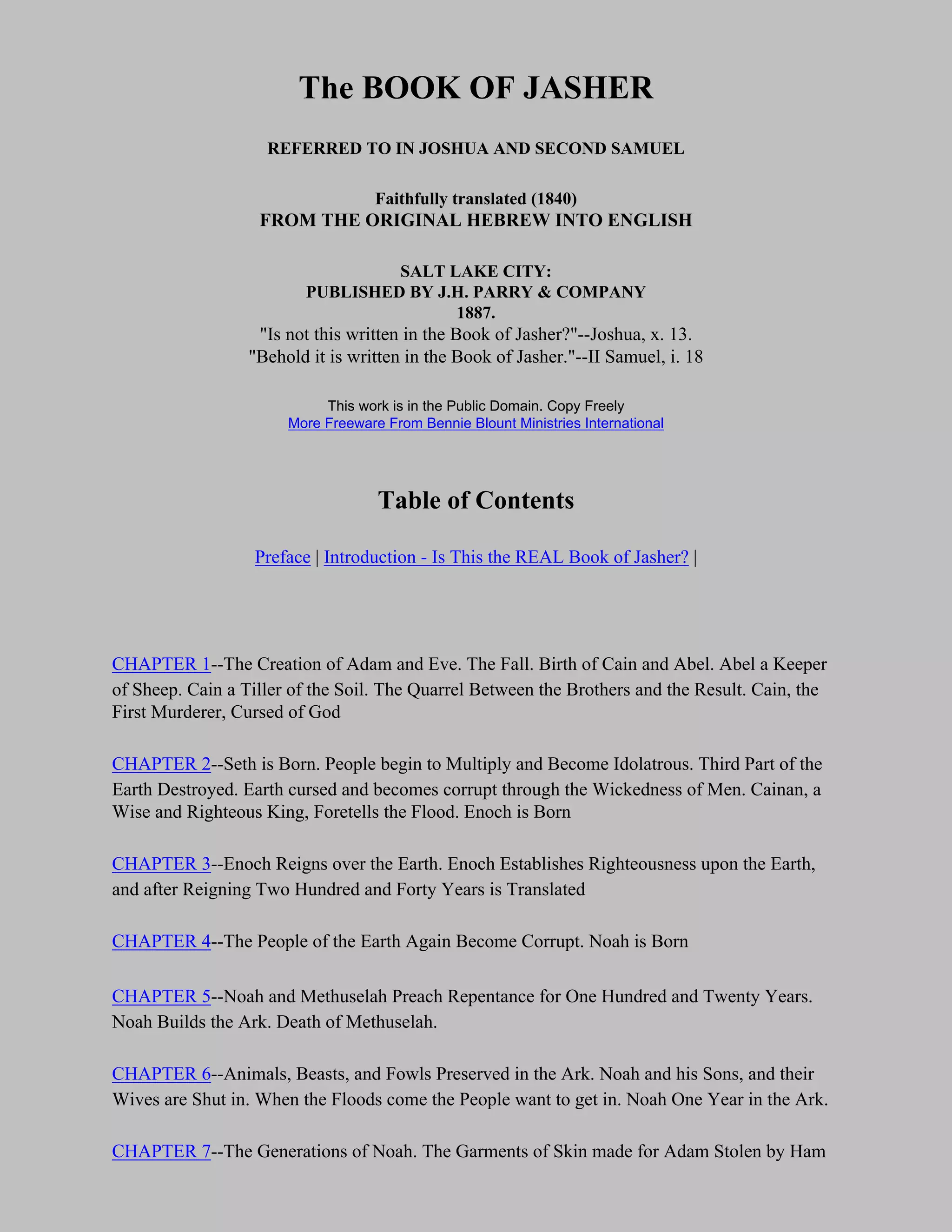
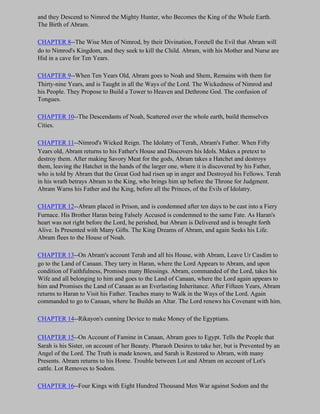
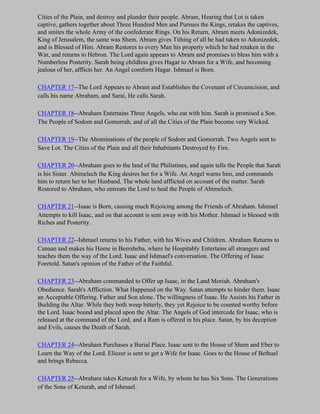
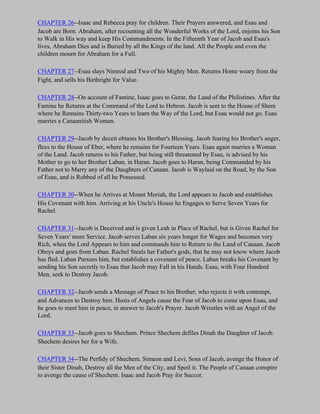
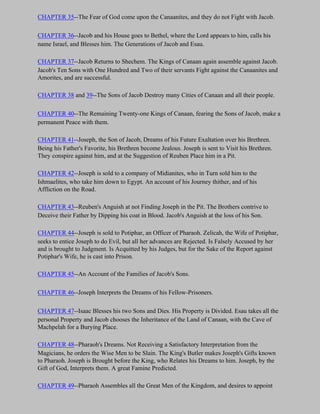
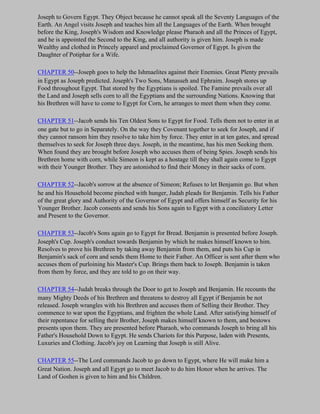
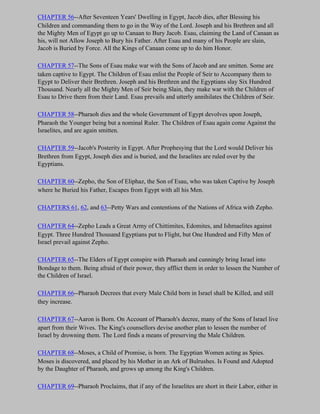
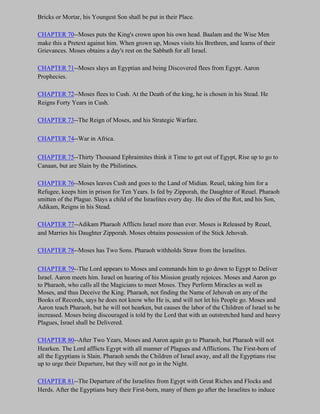
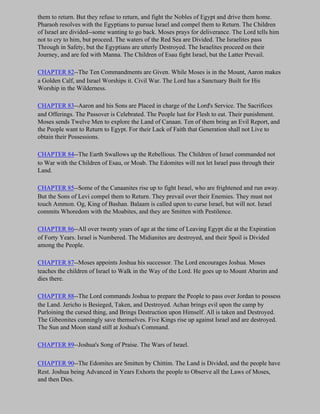
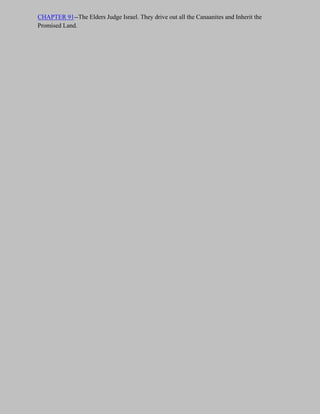
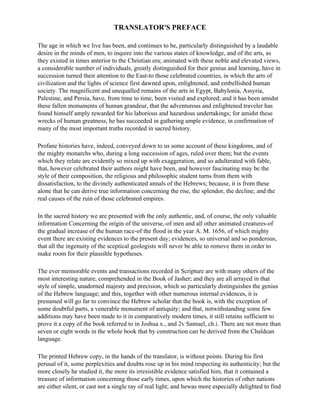
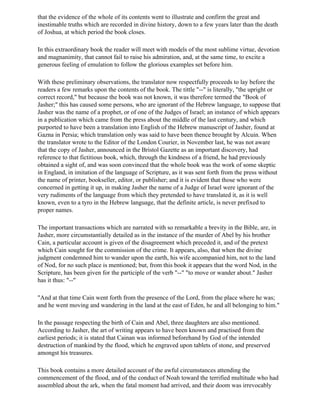
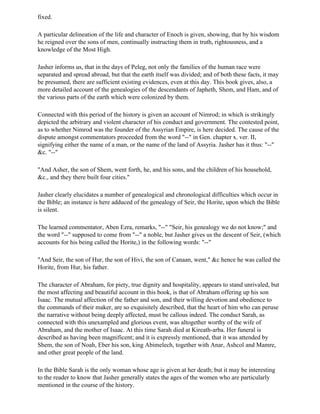
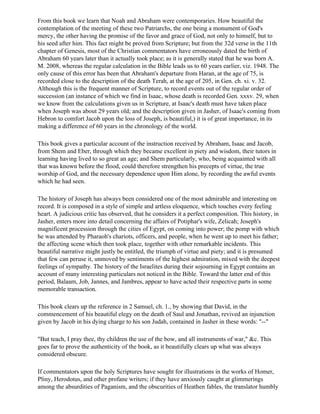
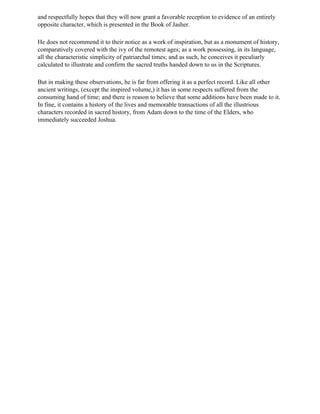
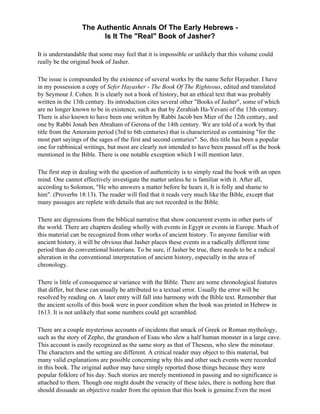
![casual reader will find Jasher enlightening. Accounts in the Bible can be made more lucid and
easier to understand with the background of Jasher in mind.
The next issue to investigate in regard to the authenticity of this book is the two passages which
mention the book by name. The first is Joshua 10.12-13:
"... and he [Joshua] said in the sight of Israel, Sun, stand thou still upon Gibeon; and
thou, moon, in the valley of Ajalon. And the sun stood still, and the moon stayed, until
the people avenged themselves upon their enemies. Is it not written in the book of
Jasher? So the sun stood still in the midst of heaven, and hasted not to go down about
a whole day. And there was no day like that before it or after it, that the Lord
hearkened to the voice of man: for the Lord fought for Israel."
And now compare it with the following passage in Jasher 88.63-64:
"...and Joshua said in the sight of all the people, Sun, stand thou still upon Gibeon, and
thou moon in the valley of Ajalon, until the nation shall have revenged itself upon its
enemies... And the sun stood still in the midst of the heavens, and it stood still six and
thirty moments, and the moon also stood still and hastened not to go down a whole
day. And there was no day like that before it or after it, that the Lord hearkened to the
voice of man, for the Lord fought for Israel."
A comparison of the text preceding also shows a high degree of correlation, indicating that
much more than a couple of verses was probably quoted by the Bible writer.
A second mention of the Book of Jasher occurs in II Samuel 1.17. In contrast, this incident is not
a direct quotation of a historical event from Jasher, as is the case in Joshua. Jasher's narrative
ends long before the time of David. However, as part of his lamentation over the death of Saul
and Jonathan, David referred to a comment by Jacob that is quoted in the Book of Jasher. He
said:
"Also he bade them teach the children of Judah the use of the bow: Behold it is written
in the book of Jasher."
David is referring to the dying words of Jacob to Judah in Jasher 56:9,
"...only teach thy sons the use of the bow and all weapons of war, in order that they
may fight the battles of their brother who will rule over his enemies."
This passage in the Bible has no reference to anything in the Bible itself, but it is made clear
from the passage in Jasher.
While the above two references pass the test, it will be up to the reader to satisfy himself as to
the general agreement of the entirety of the book with the Bible narrative. This is such an
extensive comparison, and such an obvious one, that I will not attempt to make any verse by
verse comparison. Certainly any reader who is familiar with the Bible will recognize its
similarity to the text of Jasher.](https://image.slidesharecdn.com/jasher-101002213610-phpapp02/85/Jasher-17-320.jpg)
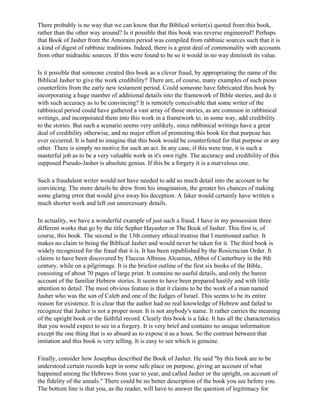
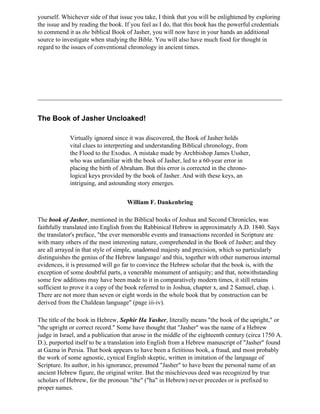
![How is the Book of Jasher important to us, today? It sheds marvelous light on the Biblical
story, from the time of Adam and Eve, the time of Enoch, and the account of Noah's Deluge, to
the Tower of Babel, the tyrant Nimrod, and the story of Abraham and his descendants. Needless
to say, I cannot discuss the details of this remarkable historical record, which completely
authenticates and corroborates Scriptural history, filling in many missing details deleted in the
Scriptural record, in this article. I highly recommend the book for any who desire to perfect their
knowledge of the ancient times, from Adam to the Exodus.
The book of Jasher provides a fascinating glimpse into the life of Enoch, who was a righteous
ruler over men, continually instructing them in truth and uprightness, and a knowledge of the
Most High God. It also tells us that in the days of "Peleg," not only were the nations at Babel
divided and scattered, but the earth itself was also divided. From this book we also learn that
Noah and Abraham were contemporaries.
Perhaps the most important key found in the Book of Jasher is that it corrects the erroneous
chronological date for the birth of Abraham assumed by many Christian commentators, in
particular archbishop James Ussher. Says the Translator of the book of Jasher:
q "From this book we learn that Noah and Abraham were contemporaries. How beautiful
the contemplation of the meeting of these two Patriarchs, the one being a monument of
God's mercy, the other having the promises of the favor and grace of God, not only to
himself, but to his seed after him. This fact might be proved from Scripture; but from
the 32nd verse in the 11th chapter of Genesis, most of the Christian commentators have
erroneously dated the birth of Abraham 60 years later than it actually took place; as it is
generally stated that he was born A.M. [after man, i.e., after Adam] 2008, whereas the
regular calculation in the Bible leads us to 60 years earlier, viz. 1948. The only cause of
this error has been that Abraham's departure from Haran, at the age of 75, is recorded
close to the description of the death of Terah, at the age of 205, in Gen. ch. xi, v. 32" (p.
vi).
How should we view the book of Jasher, today? The translator correctly points out that
although it is not divine Scripture, it nevertheless is a mighty historical and ancient work which
relates directly to Biblical historical times and events. Thus the translator does not recommend it
to people as Scripture, as a work of divine inspiration, but does "as a monument of history,
comparatively covered with the ivy of the remotest ages; as a work, possessing in its language,
all the characteristic simplicity of patriarchal times; and as such, he conceives it peculiarly
calculated to illustrate and confirm the sacred truths handed down to us in the Scriptures" (p.vii).
The translator concludes:
q "Like all other ancient writings, (except the inspired volume,) it has in some respects
suffered from the consuming hand of time; and there is reason to believe that some
additions have been made to it. In fine, it contains a history of the lives and memorable
transactions of all the illustrious characteres recorded in sacred history, from Adam
down to the time of the Elders, who immediately succeeded Joshua" (ibid.).
Having said these things, let's take a close look and see how the book of Jasher, then, impacts](https://image.slidesharecdn.com/jasher-101002213610-phpapp02/85/Jasher-20-320.jpg)
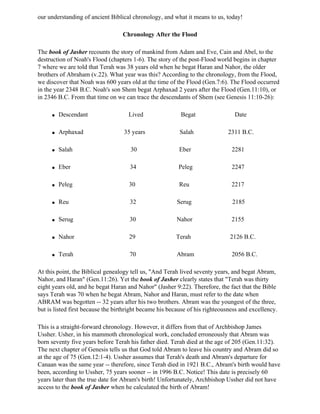
![When this correction is made, however, it suddenly frees up our understanding of events that
occurred after the Flood. Much of this illumination comes from the book of Jasher!
Nimrod and the Birth of Abram
Now let's pick up the story of Nimrod, the world's first tyrant, after the Flood. The book of
Jasher gives us a very interesting insight into Nimrod's kingdom and personality. The story
begins with his father Cush. We read:
q "And Cush, the son of Ham, the son of Noah, took a wife in those days, in his old age,
and she bare a son, and they called his name Nimrod, saying, At that time the sons ofd
men began to rebel and transgress against God, and the child grew up, and his father
loved him exceedingly, for he was the son of his old age.
q "And the garments of skin, which God made for Adam and his wife, when they went
out of the garden, were given to Cush. For after the death of Adam and his wife, the
garments were given to Enoch, the son of Jared, and when Enoch was taken up to God,
he gave them to Methuselah, his son. And at the death of Methuselah, Noah took them
and brought them to the ark, and they were with him until he went out of the ark. And in
their going out, Ham stole those garments from Noah his father, and he took them and
hid them from his brothers. And when Ham begat his firstborn Cush, he gave him the
garments in secret, and they were with Cush many days. And Cush also concealed them
from his sons and brothers, and when Cush had begotten Nimrod, he gave him those
garments through his love for him, and Nimrod grew up, and when he was twenty years
old he put on those garments.
q "And Nimrod became strong when he put on the garments, and God gave him might
and strength, and he was a mighty hunter in the earth. . . . And when Nimrod was forty
years old, at that time there was war between his brethren and the children of Japheth,
so that they were in the power of his enemies. . . . And when Nimrod had joyfully
returned from battle, after having conquered his enemies, all his brethren . . . assembled
to make him king over them, and they placed the regal crown upon his head.
q "And he placed TERAH THE SON OF NAHOR the prince of his host, and he dignified
him and elevated him above all h is princes" (Jasher 7:23-41).
Notice! Although the Bible does not mention these fine details in the Scriptural narrative,
nevertheless, Terah, Abram's father, was the commander-in-chief of Nimrod's army! He was a
very important man in the post-Flood world, and in the government of Nimrod. This occurred
when Nimrod was about forty years of age. The account goes on:
q ". . . . And Nimrod dwelt in Shinar . . . and his kingdom became very great . . . and
Nimrod reigned in the earth over all the sons of Noah, and they were all under his
power and counsel [he was the first World Ruler]. And all the earth was of one tongue
and words of union, but Nimrod did not go in the ways of the Lord. . . . And Terah, the
son of Nahor, prince of Nimrod's host, was in those days very great in the sight of the
king and his subjects, and the king and princes loved him, and they elevated him very](https://image.slidesharecdn.com/jasher-101002213610-phpapp02/85/Jasher-22-320.jpg)
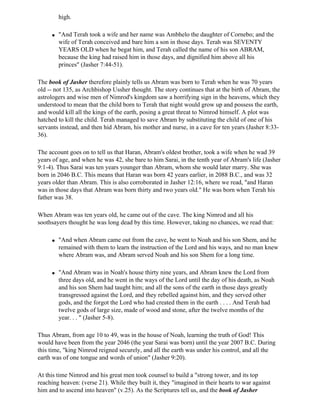
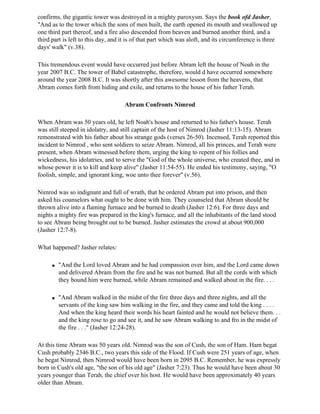
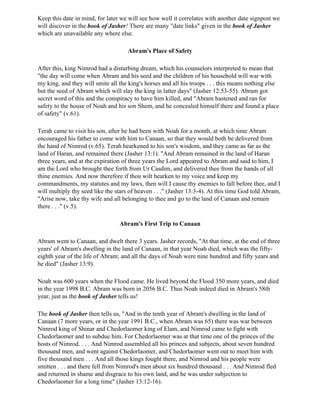
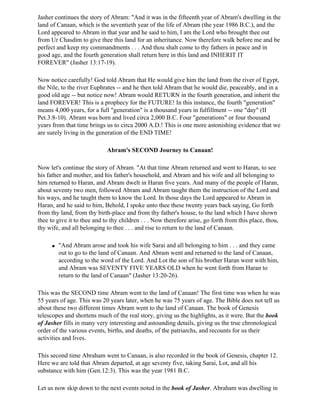
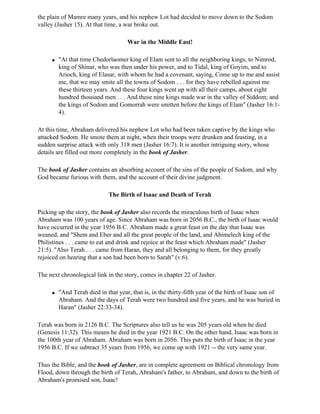
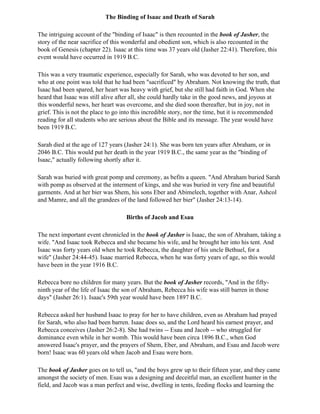
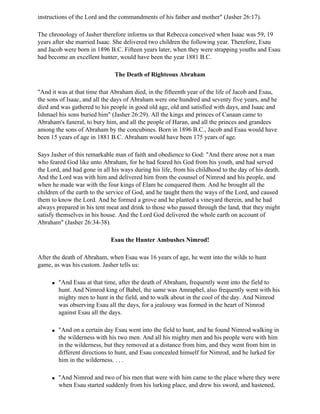
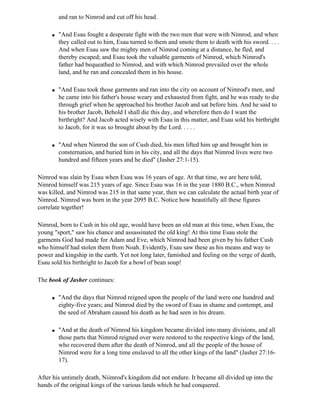
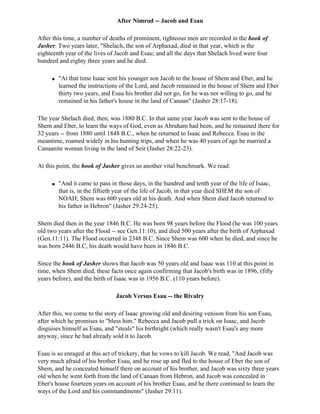
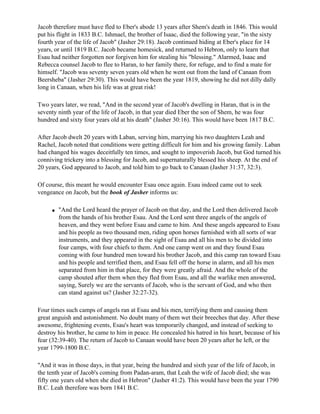
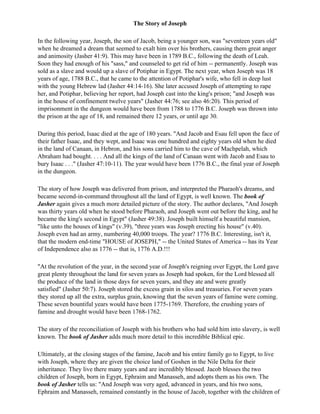
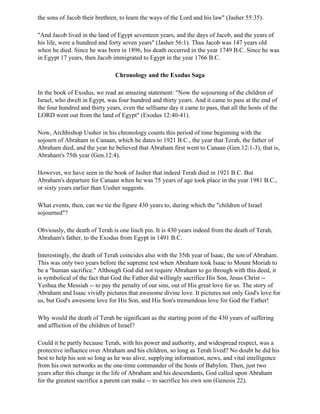
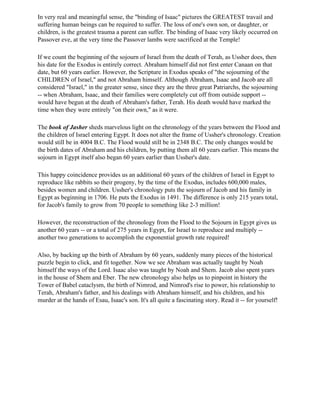
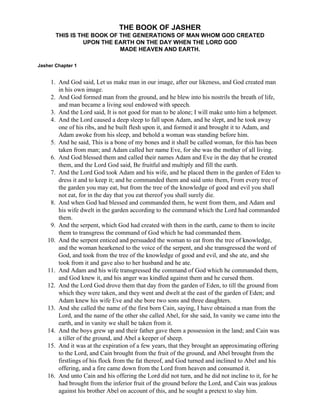
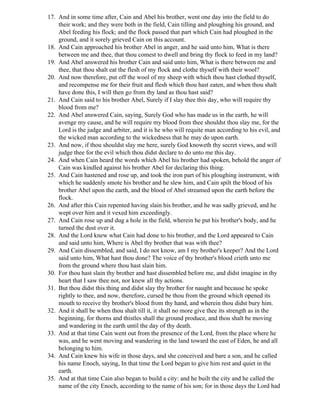
![given him rest upon the earth, and he did not move about and wander as in the
beginning.
36. And Irad was born to Enoch, and Irad begat Mechuyael and Mechuyael begat
Methusael.
[Book of Jasher Referred to in Joshua and Second Samuel. Faithfully translated (1840) from the
Original Hebrew into English. A Reprint of Photo Lithographic Reprint of Exact Edition
Published by J.H. Parry & Co., Salt Lake City: 1887]](https://image.slidesharecdn.com/jasher-101002213610-phpapp02/85/Jasher-38-320.jpg)
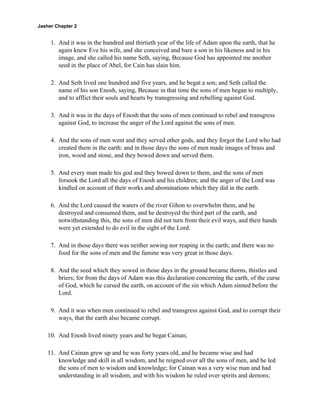
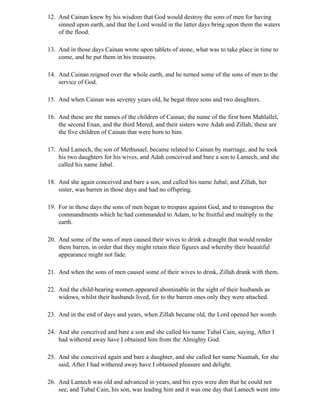
![the field and Tubal Cain his son was with him, and whilst they were walking in the
field, Cain the son of Adam advanced towards them; for Lamech was very old and
could not see much, and Tubal Cain his son was very young.
27. And Tubal Cain told his father to draw his bow, and with the arrows he smote Cain,
who was yet far off, and he slew him, for he appeared to them to be an animal.
28. And the arrows entered Cain's body although he was distant from them, and he fell to
the ground and died.
29. And the Lord requited Cain's evil according to his wickedness, which he had done to his
brother Abel, according to the word of the Lord which he had spoken.
30. And it came to pass when Cain had died, that Lamech and Tubal went to see the animal
which they had slain, and they saw, and behold Cain their grandfather was fallen dead
upon the earth.
31. And Lamech was very much grieved at having done this, and in clapping his hands
together he struck his son and caused his death.
32. And the wives of Lamech heard what Lamech had done, and they sought to kill him.
33. And the wives of Lamech hated him from that day, because he slew Cain and Tubal
Cain, and the wives of Lamech separated from him, and would not hearken to him in
those days.
34. And Lamech came to his wives, and he pressed them to listen to him about this matter.
35. And he said to his wives Adah and Zillah, Hear my voice O wives of Lamech, attend to
my words, for now you have imagined and said that I slew a man with my wounds, and
a child with my stripes for their having done no violence, but surely know that I am old
and grey-headed, and that my eyes are heavy through age, and I did this thing
unknowingly.
36. And the wives of Lamech listened to him in this matter, and they returned to him with
the advice of their father Adam, but they bore no children to him from that time,
knowing that God's anger was increasing in those days against the sons of men, to
destroy them with the waters of the flood for their evil doings.
37. And Mahlallel the son of Cainan lived sixty-five years and he begat Jared; and Jared
lived sixty-two years and he begat Enoch.
Faithfully translated (1840) from the Original Hebrew into English. A Reprint of Photo
Lithographic Reprint of Exact Edition Published by J.H. Parry & Co., Salt Lake City: 1887]](https://image.slidesharecdn.com/jasher-101002213610-phpapp02/85/Jasher-41-320.jpg)
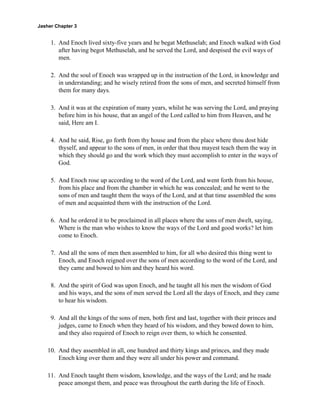
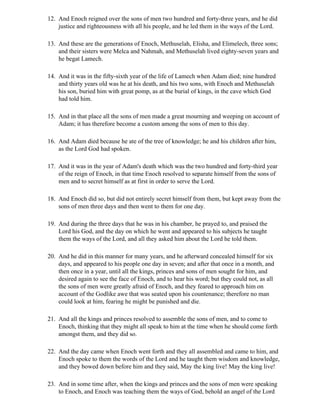
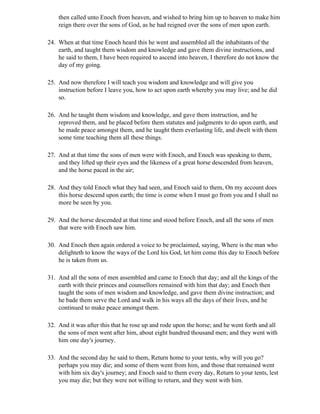
![34. And on the sixth day some of the men remained and clung to him, and they said to him,
We will go with thee to the place where thou goest; as the Lord liveth, death only shall
separate us.
35. And they urged so much to go with him, that he ceased speaking to them; and they went
after him and would not return;
36. And when the kings returned they caused a census to be taken, in order to know the
number of remaining men that went with Enoch; and it was upon the seventh day that
Enoch ascended into heaven in a whirlwind, with horses and chariots of fire.
37. And on the eighth day all the kings that had been with Enoch sent to bring back the
number of men that were with Enoch, in that place from which he ascended into heaven.
38. And all those kings went to the place and they found the earth there filled with snow,
and upon the snow were large stones of snow, and one said to the other, Come, let us
break through the snow and see, perhaps the men that remained with Enoch are dead,
and are now under the stones of snow, and they searched but could not find him, for he
had ascended into heaven.
Faithfully translated (1840) from the Original Hebrew into English. A Reprint of Photo
Lithographic Reprint of Exact Edition Published by J.H. Parry & Co., Salt Lake City: 1887]](https://image.slidesharecdn.com/jasher-101002213610-phpapp02/85/Jasher-45-320.jpg)
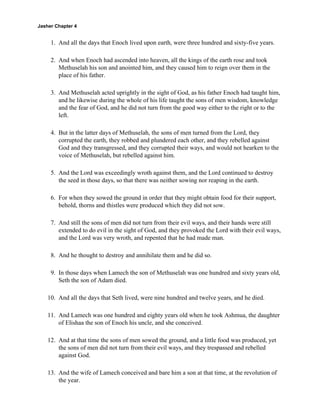
![14. And Methuselah called his name Noah, saying, The earth was in his days at rest and
free from corruption, and Lamech his father called his name Menachem, saying, This
one shall comfort us in our works and miserable toil in the earth, which God had cursed.
15. And the child grew up and was weaned, and he went in the ways of his father
Methuselah, perfect and upright with God.
16. And all the sons of men departed from the ways of the Lord in those days as they
multiplied upon the face of the earth with sons and daughters, and they taught one
another their evil practices and they continued sinning against the Lord.
17. And every man made unto himself a god, and they robbed and plundered every man his
neighbor as well as his relative, and they corrupted the earth, and the earth was filled
with violence.
18. And their judges and rulers went to the daughters of men and took their wives by force
from their husbands according to their choice, and the sons of men in those days took
from the cattle of the earth, the beasts of the field and the fowls of the air, and taught the
mixture of animals of one species with the other, in order therewith to provoke the
Lord; and God saw the whole earth and it was corrupt, for all flesh had corrupted its
ways upon earth, all men and all animals.
19. And the Lord said, I will blot out man that I created from the face of the earth, yea from
man to the birds of the air, together with cattle and beasts that are in the field for I
repent that I made them.
20. And all men who walked in the ways of the Lord, died in those days, before the Lord
brought the evil upon man which he had declared, for this was from the Lord, that they
should not see the evil which the Lord spoke of concerning the sons of men.
21. And Noah found grace in the sight of the Lord, and the Lord chose him and his children
to raise up seed from them upon the face of the whole earth.
Faithfully translated (1840) from the Original Hebrew into English. A Reprint of Photo
Lithographic Reprint of Exact Edition Published by J.H. Parry & Co., Salt Lake City: 1887]](https://image.slidesharecdn.com/jasher-101002213610-phpapp02/85/Jasher-47-320.jpg)
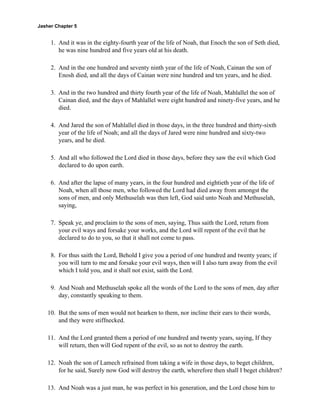
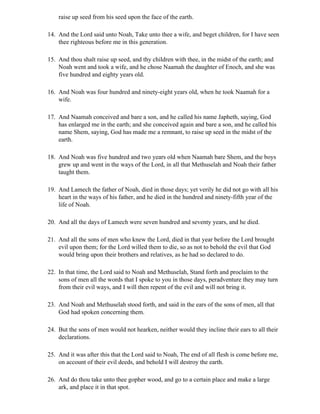
![27. And thus shalt thou make it; three hundred cubits its length, fifty cubits broad and thirty
cubits high.
28. And thou shalt make unto thee a door, open at its side, and to a cubit thou shalt finish
above, and cover it within and without with pitch.
29. And behold I will bring the flood of waters upon the earth, and all flesh be destroyed,
from under the heavens all that is upon earth shall perish.
30. And thou and thy household shall go and gather two couple of all living things, male
and female, and shall bring them to the ark, to raise up seed from them upon earth.
31. And gather unto thee all food that is eaten by all the animals, that there may be food for
thee and for them.
32. And thou shalt choose for thy sons three maidens, from the daughters of men, and they
shall be wives to thy sons.
33. And Noah rose up, and he made the ark, in the place where God had commanded him,
and Noah did as God had ordered him.
34. In his five hundred and ninety-fifth year Noah commenced to make the ark, and he
made the ark in five years, as the Lord had commanded.
35. Then Noah took the three daughters of Eliakim, son of Methuselah, for wives for his
sons, as the Lord had commanded Noah.
36. And it was at that time Methuselah the son of Enoch died, nine hundred and sixty years
old was he, at his death.
Faithfully translated (1840) from the Original Hebrew into English. A Reprint of Photo
Lithographic Reprint of Exact Edition Published by J.H. Parry & Co., Salt Lake City: 1887]](https://image.slidesharecdn.com/jasher-101002213610-phpapp02/85/Jasher-50-320.jpg)
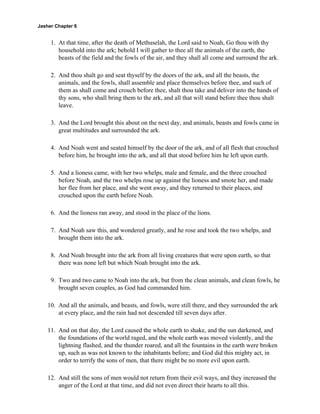
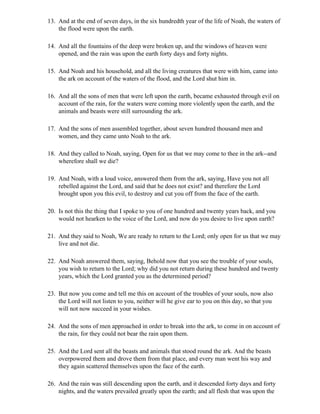
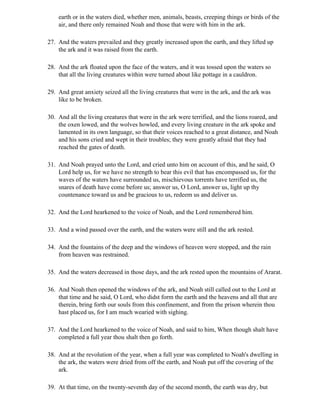
![Noah and his sons, and those that were with him, did not go out from the ark until the
Lord told them.
40. And the day came that the Lord told them to go out, and they all went out from the ark.
41. And they went and returned every one to his way and to his place, and Noah and his
sons dwelt in the land that God had told them, and they served the Lord all their days,
and the Lord blessed Noah and his sons on their going out from the ark.
42. And he said to them, Be fruitful and fill all the earth; become strong and increase
abundantly in the earth and multiply therein.
Faithfully translated (1840) from the Original Hebrew into English. A Reprint of Photo
Lithographic Reprint of Exact Edition Published by J.H. Parry & Co., Salt Lake City: 1887]](https://image.slidesharecdn.com/jasher-101002213610-phpapp02/85/Jasher-54-320.jpg)
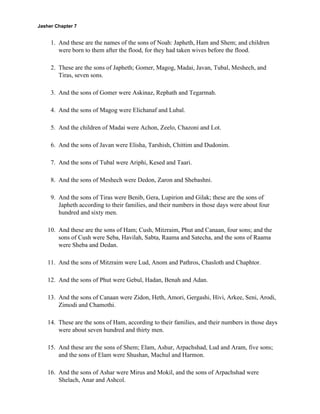
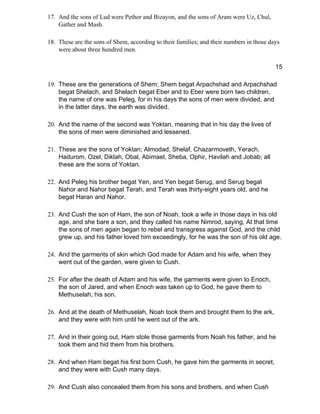
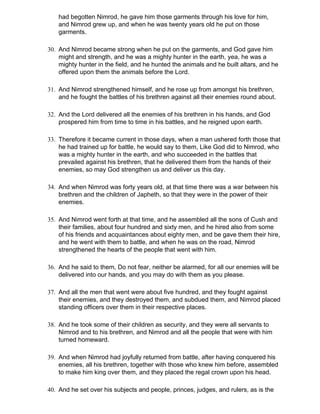
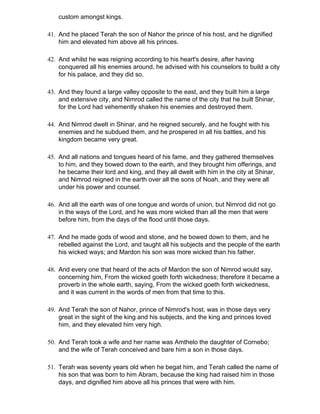
![Faithfully translated (1840) from the Original Hebrew into English. A Reprint of Photo
Lithographic Reprint of Exact Edition Published by J.H. Parry & Co., Salt Lake City:
1887]](https://image.slidesharecdn.com/jasher-101002213610-phpapp02/85/Jasher-59-320.jpg)
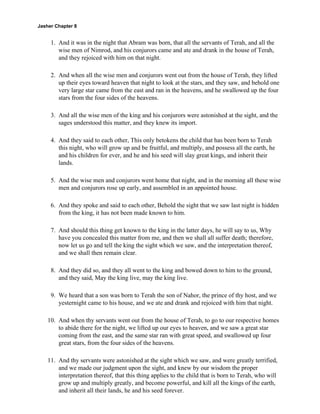
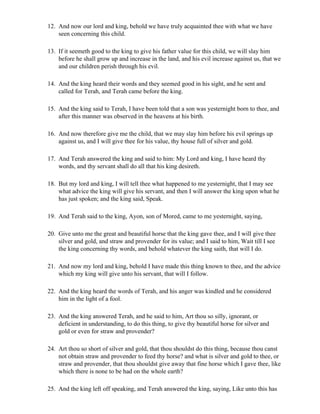
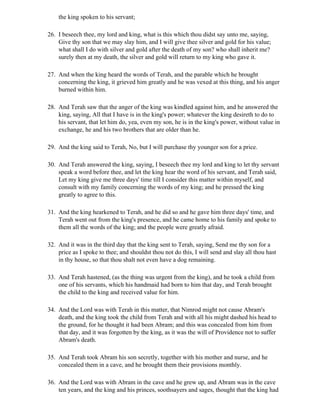
![killed Abram.
Faithfully translated (1840) from the Original Hebrew into English. A Reprint of Photo
Lithographic Reprint of Exact Edition Published by J.H. Parry & Co., Salt Lake City: 1887]](https://image.slidesharecdn.com/jasher-101002213610-phpapp02/85/Jasher-63-320.jpg)
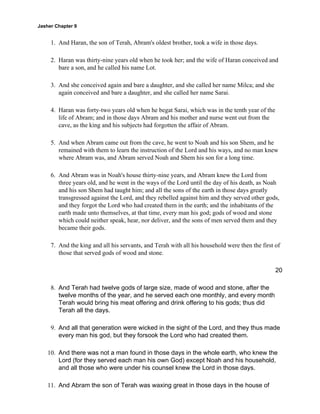
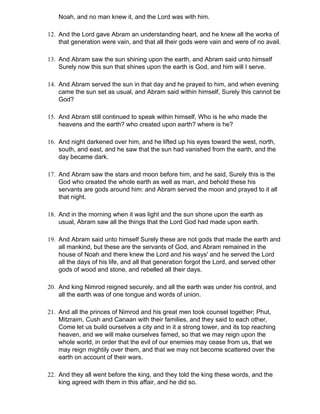
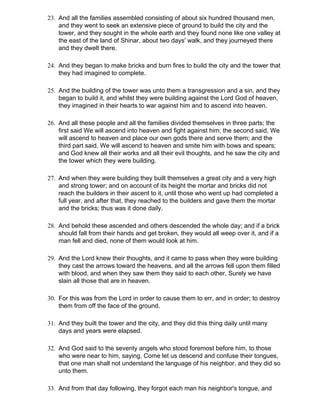
![they could not understand to speak in one tongue, and when the builder took
from the hands of his neighbor lime or stone which he did not order, the builder
would cast it away and throw it upon his neighbor, that he would die.
34. And they did so many days, and they killed many of them in this manner.
35. And the Lord smote the three divisions that were there, and he punished them
according to their works and designs; those who said, We will ascend to heaven
and serve our gods, became like apes and elephants; and those who said, We
will smite the heaven with arrows, the Lord killed them, one man through the
hand of his neighbor; and the third division of those who said, We will ascend to
heaven and fight against him, the Lord scattered them throughout the earth.
36. And those who were left amongst them, when they knew and understood the
evil which was coming upon them, they forsook the building, and they also
became scattered upon the face of the whole earth.
37. And they ceased building the city and the tower; therefore he called that place
Babel, for there the Lord confounded the Language of the whole earth; behold it
was at the east of the land of Shinar.
38. And as to the tower which the sons of men built, the earth opened its mouth and
swallowed up one third part thereof, and a fire also descended from heaven and
burned another third, and the other third is left to this day, and it is of that part
which was aloft, and its circumference is three days' walk.
39. And many of the sons of men died in that tower, a people without number.
Faithfully translated (1840) from the Original Hebrew into English. A Reprint of Photo
Lithographic Reprint of Exact Edition Published by J.H. Parry & Co., Salt Lake City:
1887]](https://image.slidesharecdn.com/jasher-101002213610-phpapp02/85/Jasher-67-320.jpg)
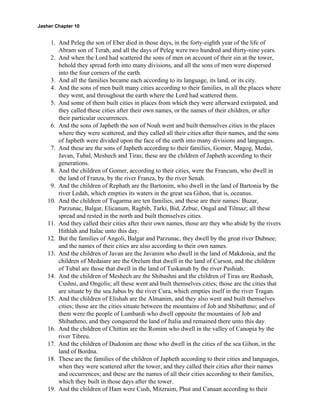
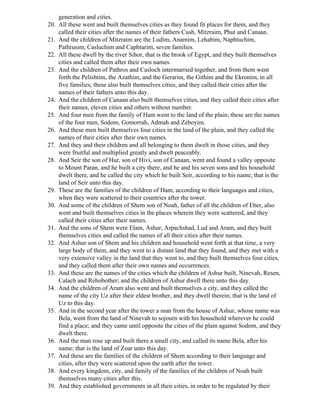
![orders; so did all the families of the children of Noah forever.
[Book of Jasher Referred to in Joshua and Second Samuel. Faithfully translated (1840) from the
Original Hebrew into English. A Reprint of Photo Lithographic Reprint of Exact Edition
Published by J.H. Parry & Co., Salt Lake City: 1887]](https://image.slidesharecdn.com/jasher-101002213610-phpapp02/85/Jasher-70-320.jpg)
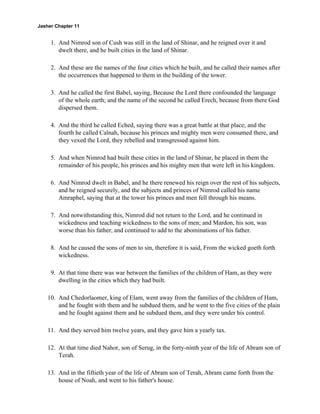
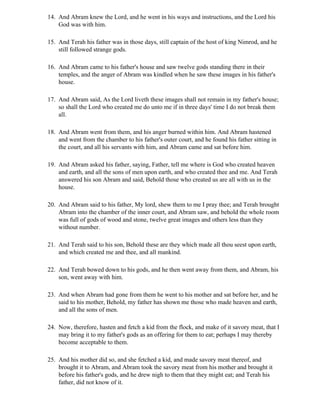
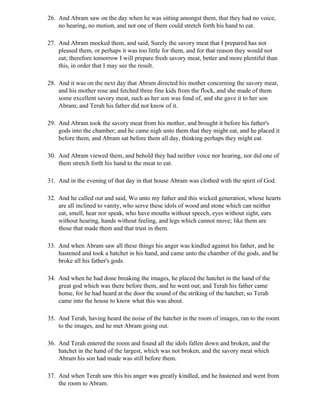
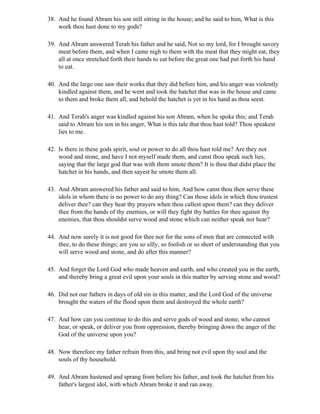
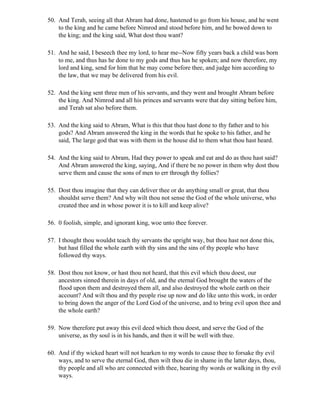
![61. And when Abram had ceased speaking before the king and princes, Abram lifted up his
eyes to the heavens, and he said, The Lord seeth all the wicked, and he will judge them.
Faithfully translated (1840) from the Original Hebrew into English. A Reprint of Photo
Lithographic Reprint of Exact Edition Published by J.H. Parry & Co., Salt Lake City: 1887]](https://image.slidesharecdn.com/jasher-101002213610-phpapp02/85/Jasher-76-320.jpg)
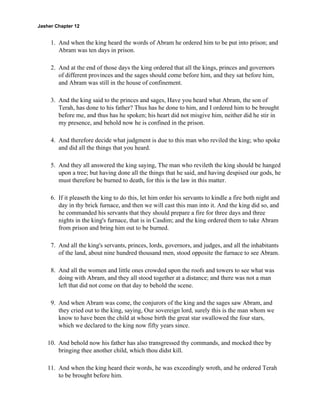
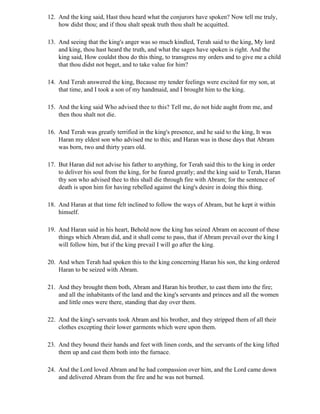
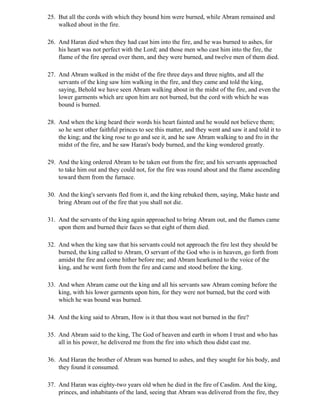
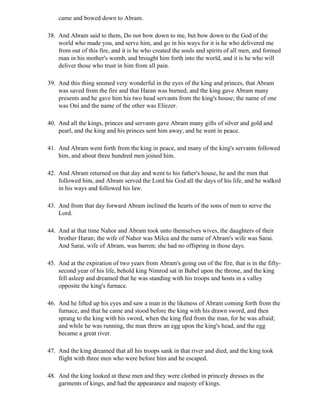
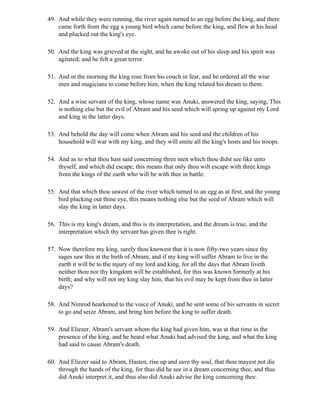
![61. And Abram hearkened to the voice of Eliezer, and Abram hastened and ran for safety to
the house of Noah and his son Shem, and he concealed himself there and found a place
of safety; and the king's servants came to Abram's house to seek him, but they could not
find him, and they searched through out the country and he was not to be found, and
they went and searched in every direction and he was not to be met with.
62. And when the king's servants could not find Abram they returned to the king, but the
king's anger against Abram was stilled, as they did not find him, and the king drove
from his mind this matter concerning Abram.
63. And Abram was concealed in Noah's house for one month, until the king had forgotten
this matter, but Abram was still afraid of the king; and Terah came to see Abram his son
secretly in the house of Noah, and Terah was very great in the eyes of the king.
64. And Abram said to his father, Dost thou not know that the king thinketh to slay me, and
to annihilate my name from the earth by the advice of his wicked counsellors?
65. Now whom hast thou here and what hast thou in this land? Arise, let us go together to
the land of Canaan, that we may be delivered from his hand, lest thou perish also
through him in the latter days.
66. Dost thou not know or hast thou not heard, that it is not through love that Nimrod giveth
thee all this honor, but it is only for his benefit that he bestoweth all this good upon thee?
67. And if he do unto thee greater good than this, surely these are only vanities of the world,
for wealth and riches cannot avail in the day of wrath and anger.
68. Now therefore hearken to my voice, and let us arise and go to the land of Canaan, out of
the reach of injury from Nimrod; and serve thou the Lord who created thee in the earth
and it will be well with thee; and cast away all the vain things which thou pursuest.
69. And Abram ceased to speak, when Noah and his son Shem answered Terah, saying,
True is the word which Abram hath said unto thee.
70. And Terah hearkened to the voice of his son Abram, and Terah did all that Abram said,
for this was from the Lord, that the king should not cause Abram's death.
Faithfully translated (1840) from the Original Hebrew into English. A Reprint of Photo
Lithographic Reprint of Exact Edition Published by J.H. Parry & Co., Salt Lake City: 1887]](https://image.slidesharecdn.com/jasher-101002213610-phpapp02/85/Jasher-82-320.jpg)
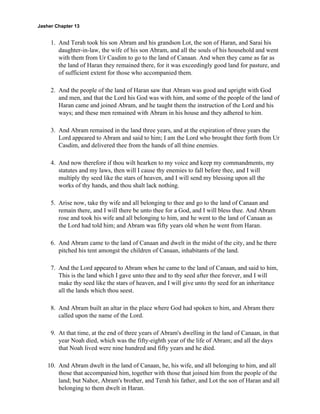
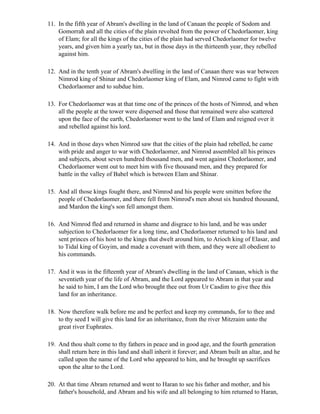
![and Abram dwelt in Haran five years.
21. And many of the people of Haran, about seventy-two men, followed Abram and Abram
taught them the instruction of the Lord and his ways, and he taught them to know the
Lord.
22. In those days the Lord appeared to Abram in Haran, and he said to him, Behold, I spoke
unto thee these twenty years back saying,
23. Go forth from thy land, from thy birth-place and from thy father's house, to the land
which I have shown thee to give it to thee and to thy children, for there in that land will
I bless thee, and make thee a great nation, and make thy name great, and in thee shall
the families of the earth be blessed.
24. Now therefore arise, go forth from this place, thou, thy wife, and all belonging to thee,
also every one born in thy house and all the souls thou hast made in Haran, and bring
them out with thee from here, and rise to return to the land of Canaan.
25. And Abram arose and took his wife Sarai and all belonging to him and all that were
born to him in his house and the souls which they had made in Haran, and they came
out to go to the land of Canaan.
26. And Abram went and returned to the land of Canaan, according to the word of the Lord.
And Lot the son of his brother Haran went with him, and Abram was seventy-five years
old when he went forth from Haran to return to the land of Canaan.
27. And he came to the land of Canaan according to the word of the Lord to Abram, and he
pitched his tent and he dwelt in the plain of Mamre, and with him was Lot his brother's
son, and all belonging to him.
28. And the Lord again appeared to Abram and said, To thy seed will I give this land; and
he there built an altar to the Lord who appeared to him, which is still to this day in the
plains of Mamre.
Faithfully translated (1840) from the Original Hebrew into English. A Reprint of Photo
Lithographic Reprint of Exact Edition Published by J.H. Parry & Co., Salt Lake City: 1887]](https://image.slidesharecdn.com/jasher-101002213610-phpapp02/85/Jasher-85-320.jpg)
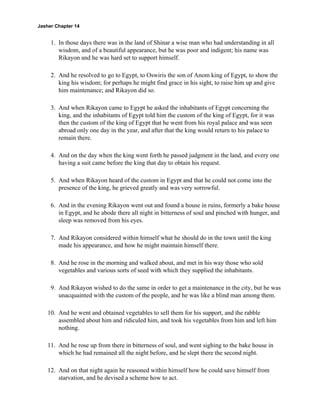
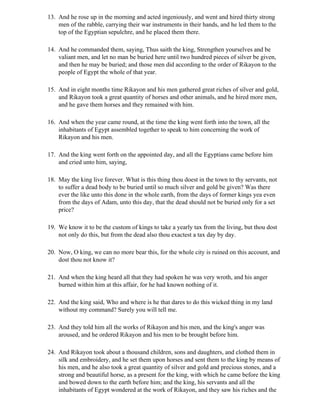
![present that he had brought to the king.
25. And it greatly pleased the king and he wondered at it; and when Rikayon sat before him
the king asked him concerning all his works, and Rikayon spoke all his words wisely
before the king, his servants and all the inhabitants of Egypt.
26. And when the king heard the words of Rikayon and his wisdom, Rikayon found grace
in his sight, and he met with grace and kindness from all the servants of the king and
from all the inhabitants of Egypt, on account of his wisdom and excellent speeches, and
from that time they loved him exceedingly.
27. And the king answered and said to Rikayon, Thy name shall no more be called Rikayon
but Pharaoh shall be thy name, since thou didst exact a tax from the dead; and he called
his name Pharaoh.
28. And the king and his subjects loved Rikayon for his wisdom, and they consulted with
all the inhabitants of Egypt to make him prefect under the king.
29. And all the inhabitants of Egypt and its wise men did so, and it was made a law in
Egypt.
30. And they made Rikayon Pharaoh prefect under Oswiris king of Egypt, and Rikayon
Pharaoh governed over Egypt, daily administering justice to the whole city, but Oswiris
the king would judge the people of the land one day in the year, when he went out to
make his appearance.
31. And Rikayon Pharaoh cunningly usurped the government of Egypt, and he exacted a tax
from all the inhabitants of Egypt.
32. And all the inhabitants of Egypt greatly loved Rikayon Pharaoh, and they made a decree
to call every king that should reign over them and their seed in Egypt, Pharaoh.
33. Therefore all the kings that reigned in Egypt from that time forward were called
Pharaoh unto this day.
Faithfully translated (1840) from the Original Hebrew into English. A Reprint of Photo
Lithographic Reprint of Exact Edition Published by J.H. Parry & Co., Salt Lake City: 1887]](https://image.slidesharecdn.com/jasher-101002213610-phpapp02/85/Jasher-88-320.jpg)
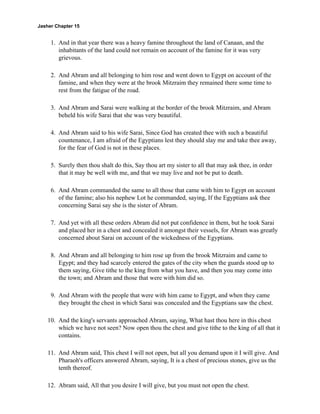
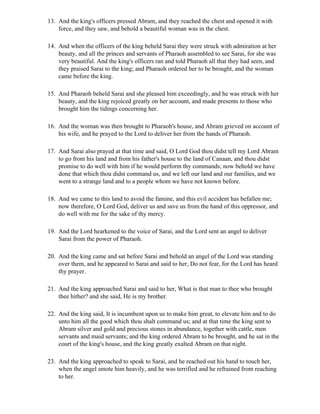
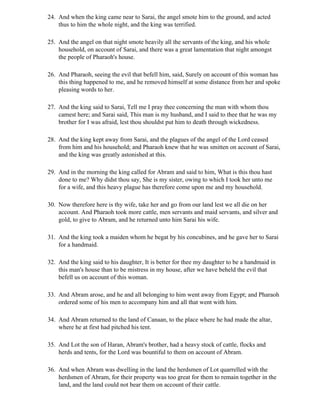
![37. And when Abram's herdsmen went to feed their flock they would not go into the fields
of the people of the land, but the cattle of Lot's herdsmen did otherwise, for they were
suffered to feed in the fields of the people of the land.
38. And the people of the land saw this occurrence daily, and they came to Abram and
quarrelled with him on account of Lot's herdsmen.
39. And Abram said to Lot, What is this thou art doing to me, to make me despicable to the
inhabitants of the land, that thou orderest thy herdsman to feed thy cattle in the fields of
other people? Dost thou not know that I am a stranger in this land amongst the children
of Canaan, and why wilt thou do this unto me?
40. And Abram quarrelled daily with Lot on account of this, but Lot would not listen to
Abram, and he continued to do the same and the inhabitants of the land came and told
Abram.
41. And Abram said unto Lot, How long wilt thou be to me for a stumbling block with the
inhabitants of the land? Now I beseech thee let there be no more quarrelling between us,
for we are kinsmen.
42. But I pray thee separate from me, go and choose a place where thou mayest dwell with
thy cattle and all belonging to thee, but Keep thyself at a distance from me, thou and thy
household.
43. And be not afraid in going from me, for if any one do an injury to thee, let me know and
I will avenge thy cause from him, only remove from me.
44. And when Abram had spoken all these words to Lot, then Lot arose and lifted up his
eyes toward the plain of Jordan.
45. And he saw that the whole of this place was well watered, and good for man as well as
affording pasture for the cattle.
46. And Lot went from Abram to that place, and he there pitched his tent and he dwelt in
Sodom, and they were separated from each other.
47. And Abram dwelt in the plain of Mamre, which is in Hebron, and he pitched his tent
there, and Abram remained in that place many years.
Faithfully translated (1840) from the Original Hebrew into English. A Reprint of Photo
Lithographic Reprint of Exact Edition Published by J.H. Parry & Co., Salt Lake City: 1887]](https://image.slidesharecdn.com/jasher-101002213610-phpapp02/85/Jasher-92-320.jpg)
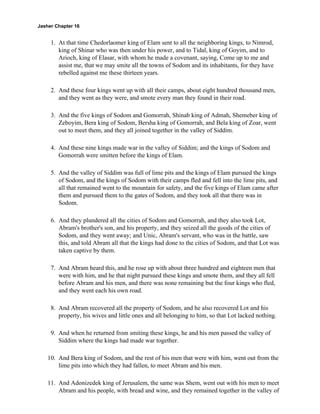
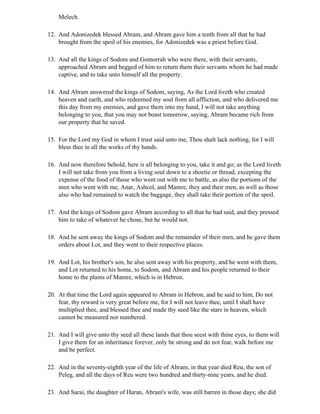
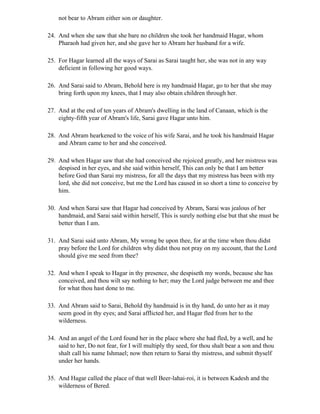
![36. And Hagar at that time returned to her master's house, and at the end of days Hagar bare
a son to Abram, and Abram called his name Ishmael; and Abram was eighty-six years
old when he begat him.
Faithfully translated (1840) from the Original Hebrew into English. A Reprint of Photo
Lithographic Reprint of Exact Edition Published by J.H. Parry & Co., Salt Lake City: 1887]](https://image.slidesharecdn.com/jasher-101002213610-phpapp02/85/Jasher-96-320.jpg)
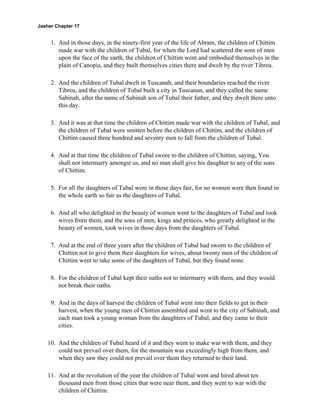
![12. And the children of Tubal went to war with the children of Chittim, to destroy their land
and to distress them, and in this engagement the children of Tubal prevailed over the
children of Chittim, and the children of Chittim, seeing that they were greatly
distressed, lifted up the children which they had had by the daughters of Tubal, upon the
wall which had been built, to be before the eyes of the children of Tubal.
13. And the children of Chittim said to them, Have you come to make war with your own
sons and daughters, and have we not been considered your flesh and bones from that
time till now?
14. And when the children of Tubal heard this they ceased to make war with the children of
Chittim, and they went away.
15. And they returned to their cities, and the children of Chittim at that time assembled and
built two cities by the sea, and they called one Purtu and the other Ariza.
16. And Abram the son of Terah was then ninety-nine years old.
17. At that time the Lord appeared to him and he said to him, I will make my covenant
between me and thee, and I will greatly multiply thy seed, and this is the covenant
which I make between me and thee, that every male child be circumcised, thou and thy
seed after thee.
18. At eight days old shall it be circumcised, and this covenant shall be in your flesh for an
everlasting covenant.
19. And now therefore thy name shall no more be called Abram but Abraham, and thy wife
shall no more be called Sarai but Sarah.
20. For I will bless you both, and I will multiply your seed after you that you shall become a
great nation, and kings shall come forth from you.
Faithfully translated (1840) from the Original Hebrew into English. A Reprint of Photo
Lithographic Reprint of Exact Edition Published by J.H. Parry & Co., Salt Lake City: 1887]](https://image.slidesharecdn.com/jasher-101002213610-phpapp02/85/Jasher-98-320.jpg)
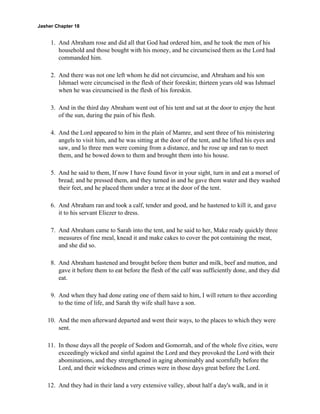
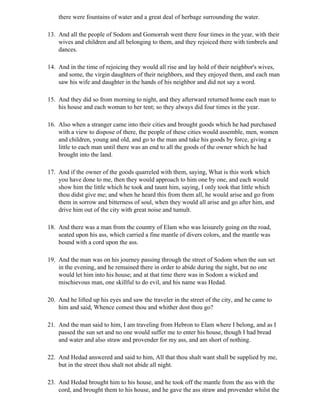
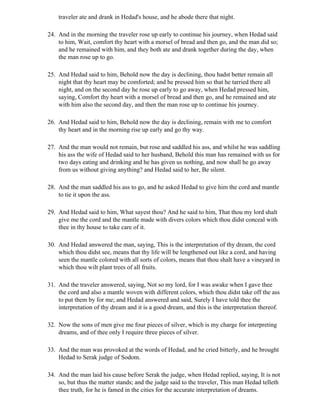
![35. And the man cried at the word of the judge, and he said, Not so my Lord, for it was in
the day that I gave him the cord and mantle which was upon the ass, in order to put
them by in his house; and they both disputed before the judge, the one saying, Thus the
matter was, and the other declaring otherwise.
36. And Hedad said to the man, Give me four pieces of silver that I charge for my
interpretations of dreams; I will not make any allowance; and give me the expense of
the four meals that thou didst eat in my house.
37. And the man said to Hedad, Truly I will pay thee for what I ate in thy house, only give
me the cord and mantle which thou didst conceal in thy house.
38. And Hedad replied before the judge and said to the man, Did I not tell thee the
interpretation of thy dream? the cord means that thy days shall be prolonged like a cord,
and the mantle, that thou wilt have a vineyard in which thou wilt plant all kinds of fruit
trees.
39. This is the proper interpretation of thy dream, now give me the four pieces of silver that
I require as a compensation, for I will make thee no allowance.
40. And the man cried at the words of Hedad and they both quarreled before the judge, and
the judge gave orders to his servants, who drove them rashly from the house.
41. And they went away quarreling from the judge, when the people of Sodom heard them,
and they gathered about them and they exclaimed against the stranger, and they drove
him rashly from the city.
42. And the man continued his journey upon his ass with bitterness of soul, lamenting and
weeping.
43. And whilst he was going along he wept at what had happened to him in the corrupt city
of Sodom.
Faithfully translated (1840) from the Original Hebrew into English. A Reprint of Photo
Lithographic Reprint of Exact Edition Published by J.H. Parry & Co., Salt Lake City: 1887]](https://image.slidesharecdn.com/jasher-101002213610-phpapp02/85/Jasher-102-320.jpg)
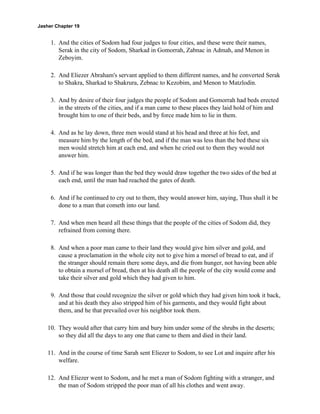
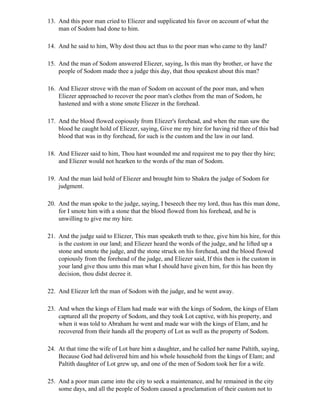
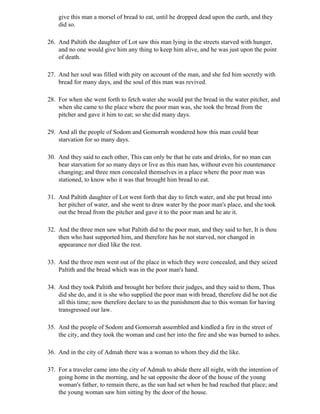
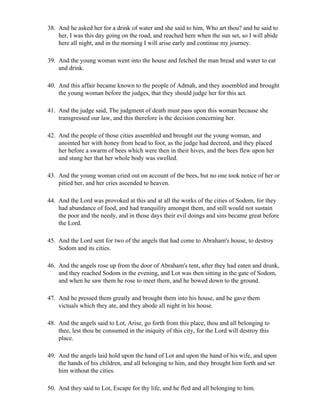
![51. Then the Lord rained upon Sodom and upon Gomorrah and upon all these cities
brimstone and fire from the Lord out of heaven.
52. And he overthrew these cities, all the plain and all the inhabitants of the cities, and that
which grew upon the ground; and Ado the wife of Lot looked back to see the
destruction of the cities, for her compassion was moved on account of her daughters
who remained in Sodom, for they did not go with her.
53. And when she looked back she became a pillar of salt, and it is yet in that place unto
this day.
54. And the oxen which stood in that place daily licked up the salt to the extremities of their
feet, and in the morning it would spring forth afresh, and they again licked it up unto
this day.
55. And Lot and two of his daughters that remained with him fled and escaped to the cave
of Adullam, and they remained there for some time.
56. And Abraham rose up early in the morning to see what had been done to the cities of
Sodom; and he looked and beheld the smoke of the cities going up like the smoke of a
furnace.
57. And Lot and his two daughters remained in the cave, and they made their father drink
wine, and they lay with him, for they said there was no man upon earth that could raise
up seed from them, for they thought that the whole earth was destroyed.
58. And they both lay with their father, and they conceived and bare sons, and the first born
called the name of her son Moab, saying, From my father did I conceive him; he is the
father of the Moabites unto this day.
59. And the younger also called her son Benami; he is the father of the children of Ammon
unto this day.
60. And after this Lot and his two daughters went away from there, and he dwelt on the
other side of the Jordan with his two daughters and their sons, and the sons of Lot grew
up, and they went and took themselves wives from the land of Canaan, and they begat
children and they were fruitful and multiplied.
Faithfully translated (1840) from the Original Hebrew into English. A Reprint of Photo
Lithographic Reprint of Exact Edition Published by J.H. Parry & Co., Salt Lake City: 1887]](https://image.slidesharecdn.com/jasher-101002213610-phpapp02/85/Jasher-107-320.jpg)
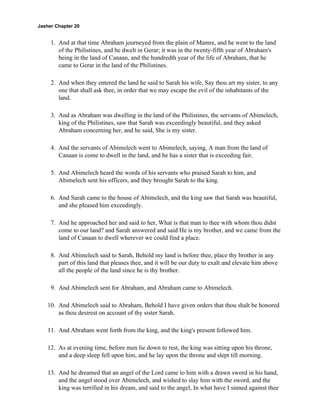
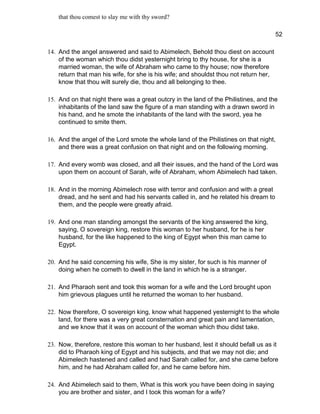
![25. And Abraham said, Because I thought I should suffer death on account of my
wife; and Abimelech took flocks and herds, and men servants and maid
servants, and a thousand pieces of silver, and he gave them to Abraham, and
he returned Sarah to him.
26. And Abimelech said to Abraham, Behold the whole land is before thee, dwell in
it wherever thou shalt choose.
27. And Abraham and Sarah, his wife, went forth from the king's presence with
honor and respect, and they dwelt in the land, even in Gerar.
28. And all the inhabitants of the land of the Philistines and the king's servants were
still in pain, through the plague which the angel had inflicted upon them the
whole night on account of Sarah.
29. And Abimelech sent for Abraham, saying, Pray now for thy servants to the Lord
thy God, that he may put away this mortality from amongst us.
30. And Abraham prayed on account of Abimelech and his subjects, and the Lord
heard the prayer of Abraham, and he healed Abimelech and all his subjects.
Faithfully translated (1840) from the Original Hebrew into English. A Reprint of Photo
Lithographic Reprint of Exact Edition Published by J.H. Parry & Co., Salt Lake City:
1887]](https://image.slidesharecdn.com/jasher-101002213610-phpapp02/85/Jasher-110-320.jpg)
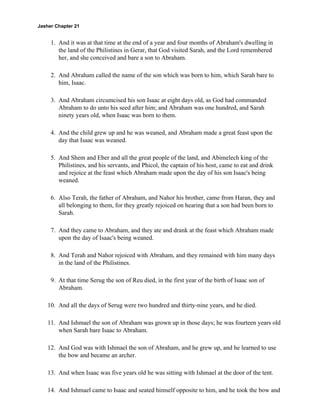
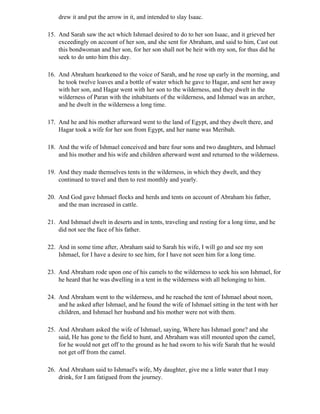
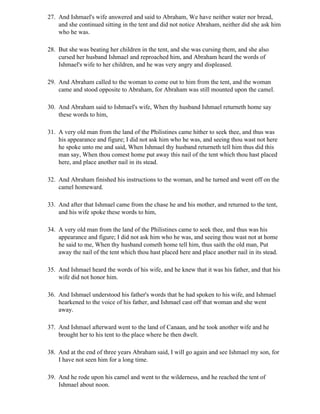
![40. And he asked after Ishmael, and his wife came out of the tent and she said, He is not
here my lord, for he has gone to hunt in the fields, and to feed the camels, and the
woman said to Abraham, Turn in my lord into the tent, and eat a morsel of bread, for
thy soul must be wearied on account of the journey.
41. And Abraham said to her, I will not stop for I am in haste to continue my journey, but
give me a little water to drink, for I have thirst; and the woman hastened and ran into the
tent and she brought out water and bread to Abraham, which she placed before him and
she urged him to eat, and he ate and drank and his heart was comforted and he blessed
his son Ishmael.
42. And he finished his meal and he blessed the Lord, and he said to Ishmael's wife, When
Ishmael cometh home say these words to him,
43. A very old man from the land of the Philistines came hither and asked after thee, and
thou wast not here; and I brought him out bread and water and he ate and drank and his
heart was comforted.
44. And he spoke these words to me: When Ishmael thy husband cometh home, say unto
him, The nail of the tent which thou hast is very good, do not put it away from the tent.
45. And Abraham finished commanding the woman, and he rode off to his home to the land
of the Philistines; and when Ishmael came to his tent his wife went forth to meet him
with joy and a cheerful heart.
46. And she said to him, An old man came here from the land of the Philistines and thus
was his appearance, and he asked after thee and thou wast not here, so I brought out
bread and water, and he ate and drank and his heart was comforted.
47. And he spoke these words to me, When Ishmael thy husband cometh home say to him,
The nail of the tent which thou hast is very good, do not put it away from the tent.
48. And Ishmael knew that it was his father, and that his wife had honored him, and the
Lord blessed Ishmael.
Faithfully translated (1840) from the Original Hebrew into English. A Reprint of Photo
Lithographic Reprint of Exact Edition Published by J.H. Parry & Co., Salt Lake City: 1887]](https://image.slidesharecdn.com/jasher-101002213610-phpapp02/85/Jasher-114-320.jpg)
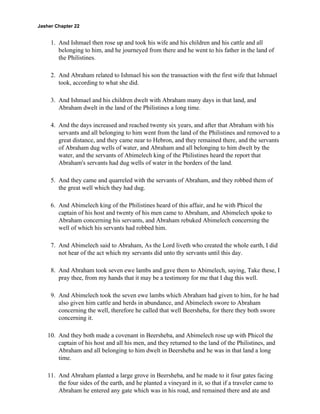
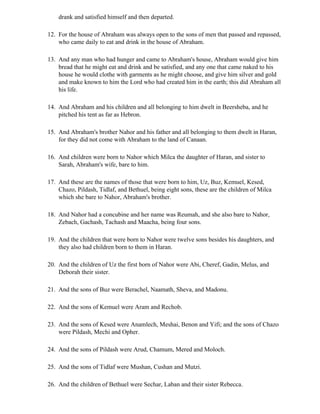
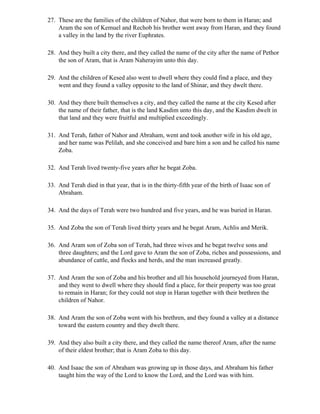
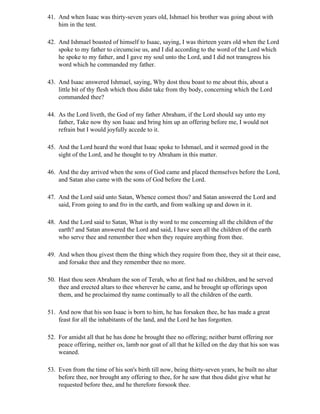
![54. And the Lord said to Satan, Hast thou thus considered my servant Abraham? for there is
none like him upon earth, a perfect and an upright man before me, one that feareth God
and avoideth evil; as I live, were I to say unto him, Bring up Isaac thy son before me, he
would not withhold him from me, much more if I told him to bring up a burnt offering
before me from his flock or herds.
55. And Satan answered the Lord and said, Speak then now unto Abraham as thou hast said,
and thou wilt see whether he will not this day transgress and cast aside thy words.
Faithfully translated (1840) from the Original Hebrew into English. A Reprint of Photo
Lithographic Reprint of Exact Edition Published by J.H. Parry & Co., Salt Lake City: 1887]](https://image.slidesharecdn.com/jasher-101002213610-phpapp02/85/Jasher-119-320.jpg)
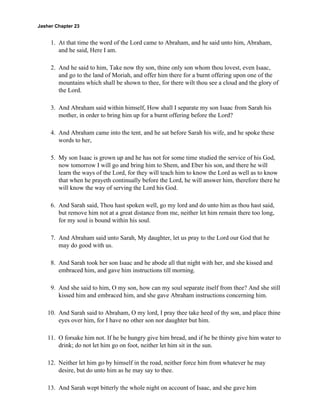
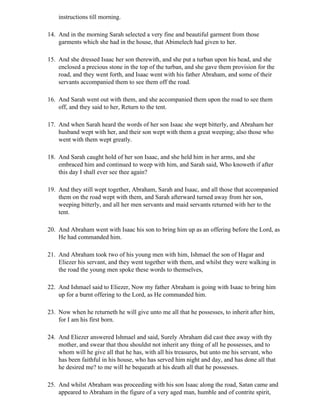
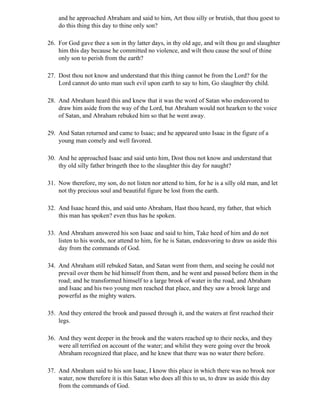
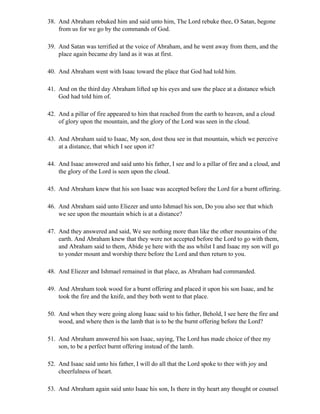
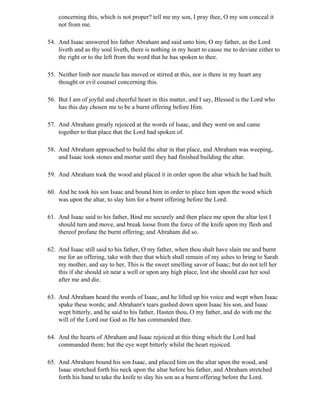
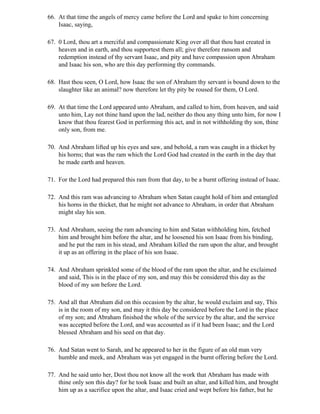
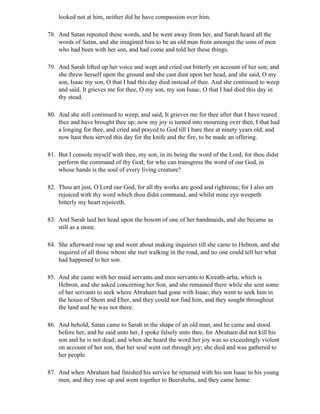
![88. And Abraham sought for Sarah, and could not find her, and he made inquiries
concerning her, and they said unto him, She went as far as Hebron to seek you both
where you had gone, for thus was she informed.
89. And Abraham and Isaac went to her to Hebron, and when they found that she was dead
they lifted up their voices and wept bitterly over her; and Isaac fell upon his mother's
face and wept over her, and he said, O my mother, my mother, how hast thou left me,
and where hast thou gone? O how, how hast thou left me!
90. And Abraham and Isaac wept greatly and all their servants wept with them on account
of Sarah, and they mourned over her a great and heavy mourning.
Faithfully translated (1840) from the Original Hebrew into English. A Reprint of Photo
Lithographic Reprint of Exact Edition Published by J.H. Parry & Co., Salt Lake City: 1887]](https://image.slidesharecdn.com/jasher-101002213610-phpapp02/85/Jasher-127-320.jpg)
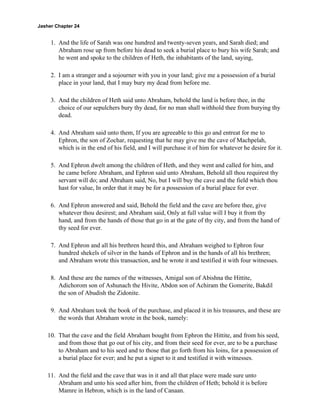
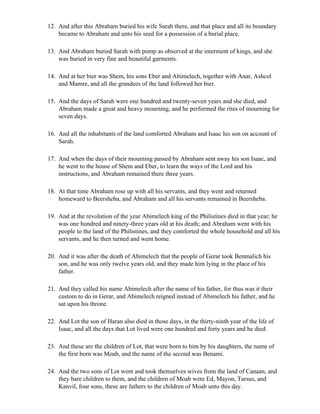
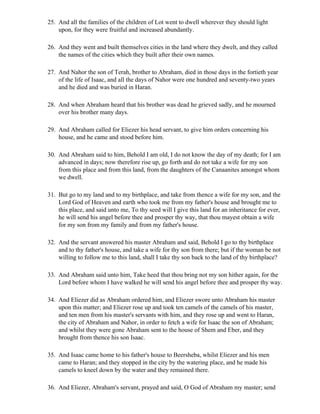
![me I pray thee good speed this day and show kindness unto my master, that thou shalt
appoint this day a wife for my master's son from his family.
37. And the Lord hearkened to the voice of Eliezer, for the sake of his servant Abraham,
and he happened to meet with the daughter of Bethuel, the son of Milcah, the wife of
Nahor, brother to Abraham, and Eliezer came to her house.
38. And Eliezer related to them all his concerns, and that he was Abraham's servant, and
they greatly rejoiced at him.
39. And they all blessed the Lord who brought this thing about, and they gave him Rebecca,
the daughter of Bethuel, for a wife for Isaac.
40. And the young woman was of very comely appearance, she was a virgin, and Rebecca
was ten years old in those days.
41. And Bethuel and Laban and his children made a feast on that night, and Eliezer and his
men came and ate and drank and rejoiced there on that night.
42. And Eliezer rose up in the morning, he and the men that were with him, and he called to
the whole household of Bethuel, saying, Send me away that I may go to my master; and
they rose up and sent away Rebecca and her nurse Deborah, the daughter of Uz, and
they gave her silver and gold, men servants and maid servants, and they blessed her.
43. And they sent Eliezer away with his men; and the servants took Rebecca, and he went
and returned to his master to the land of Canaan.
44. And Isaac took Rebecca and she became his wife, and he brought her into the tent.
45. And Isaac was forty years old when he took Rebecca, the daughter of his uncle Bethuel,
for a wife.
Faithfully translated (1840) from the Original Hebrew into English. A Reprint of Photo
Lithographic Reprint of Exact Edition Published by J.H. Parry & Co., Salt Lake City: 1887]](https://image.slidesharecdn.com/jasher-101002213610-phpapp02/85/Jasher-131-320.jpg)
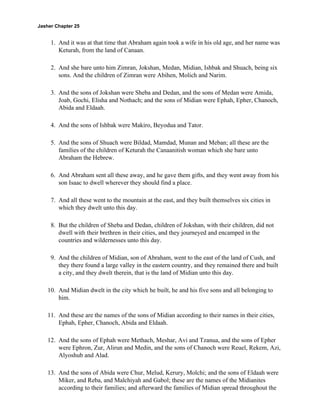
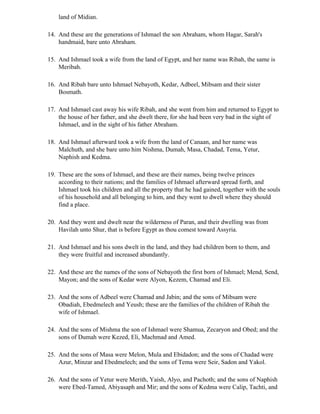
![Omir; these were the children of Malchuth the wife of Ishmael according to their
families.
27. All these are the families of Ishmael according to their generations, and they dwelt in
those lands wherein they had built themselves cities unto this day.
28. And Rebecca the daughter of Bethuel, the wife of Abraham's son Isaac, was barren in
those days, she had no offspring; and Isaac dwelt with his father in the land of Canaan;
and the Lord was with Isaac; and Arpachshad the son of Shem the son of Noah died in
those days, in the forty-eighth year of the life of Isaac, and all the days that Arpachshad
lived were four hundred and thirty-eight years, and he died.
Faithfully translated (1840) from the Original Hebrew into English. A Reprint of Photo
Lithographic Reprint of Exact Edition Published by J.H. Parry & Co., Salt Lake City: 1887]](https://image.slidesharecdn.com/jasher-101002213610-phpapp02/85/Jasher-134-320.jpg)
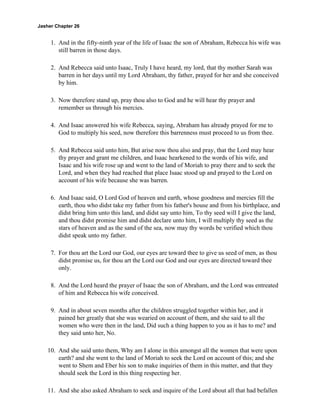
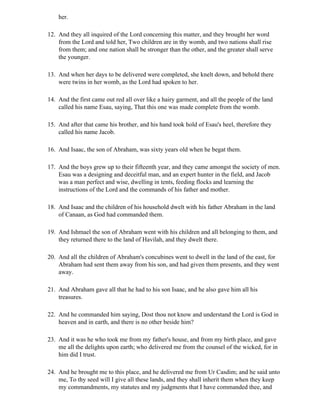
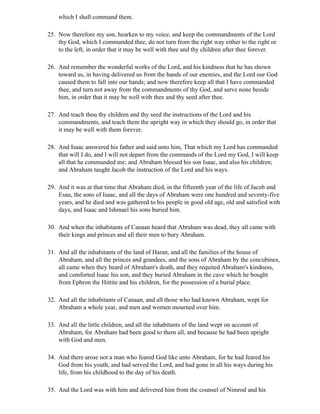
![people, and when he made war with the four kings of Elam he conquered them.
36. And he brought all the children of the earth to the service of God, and he taught them
the ways of the Lord, and caused them to know the Lord.
37. And he formed a grove and he planted a vineyard therein, and he had always prepared
in his tent meat and drink to those that passed through the land, that they might satisfy
themselves in his house.
38. And the Lord God delivered the whole earth on account of Abraham.
39. And it was after the death of Abraham that God blessed his son Isaac and his children,
and the Lord was with Isaac as he had been with his father Abraham, for Isaac kept all
the commandments of the Lord as Abraham his father had commanded him; he did not
turn to the right or to the left from the right path which his father had commanded him.
Faithfully translated (1840) from the Original Hebrew into English. A Reprint of Photo
Lithographic Reprint of Exact Edition Published by J.H. Parry & Co., Salt Lake City: 1887]](https://image.slidesharecdn.com/jasher-101002213610-phpapp02/85/Jasher-138-320.jpg)
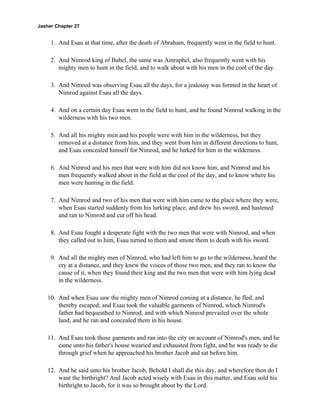
![13. And Esau's portion in the cave of the field of Machpelah, which Abraham had bought
from the children of Heth for the possession of a burial ground, Esau also sold to Jacob,
and Jacob bought all this from his brother Esau for value given.
14. And Jacob wrote the whole of this in a book, and he testified the same with witnesses,
and he sealed it, and the book remained in the hands of Jacob.
15. And when Nimrod the son of Cush died, his men lifted him up and brought him in
consternation, and buried him in his city, and all the days that Nimrod lived were two
hundred and fifteen years and he died.
16. And the days that Nimrod reigned upon the people of the land were one hundred and
eighty-five years; and Nimrod died by the sword of Esau in shame and contempt, and
the seed of Abraham caused his death as he had seen in his dream.
17. And at the death of Nimrod his kingdom became divided into many divisions, and all
those parts that Nimrod reigned over were restored to the respective kings of the land,
who recovered them after the death of Nimrod, and all the people of the house of
Nimrod were for a long time enslaved to all the other kings of the land.
Faithfully translated (1840) from the Original Hebrew into English. A Reprint of Photo
Lithographic Reprint of Exact Edition Published by J.H. Parry & Co., Salt Lake City: 1887]](https://image.slidesharecdn.com/jasher-101002213610-phpapp02/85/Jasher-140-320.jpg)
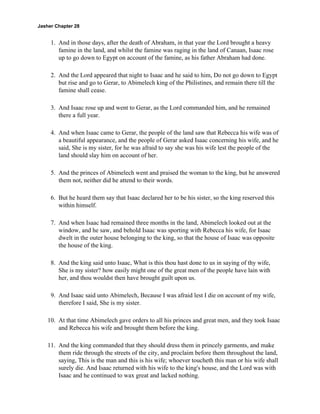
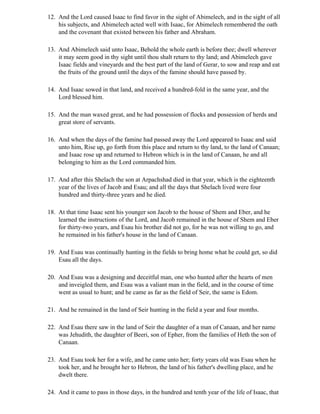
![is in the fiftieth year of the life of Jacob, in that year died Shem the son of Noah; Shem
was six hundred years old at his death.
25. And when Shem died Jacob returned to his father to Hebron which is in the land of
Canaan.
26. And in the fifty-sixth year of the life of Jacob, people came from Haran, and Rebecca
was told concerning her brother Laban the son of Bethuel.
27. For the wife of Laban was barren in those days, and bare no children, and also all his
handmaids bare none to him.
28. And the Lord afterward remembered Adinah the wife of Laban, and she conceived and
bare twin daughters, and Laban called the names of his daughters, the name of the elder
Leah, and the name of the younger Rachel.
29. And those people came and told these things to Rebecca, and Rebecca rejoiced greatly
that the Lord had visited her brother and that he had got children.
Faithfully translated (1840) from the Original Hebrew into English. A Reprint of Photo
Lithographic Reprint of Exact Edition Published by J.H. Parry & Co., Salt Lake City: 1887]](https://image.slidesharecdn.com/jasher-101002213610-phpapp02/85/Jasher-143-320.jpg)
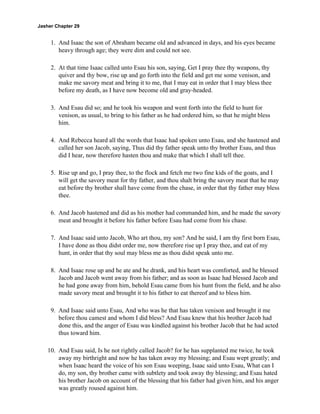
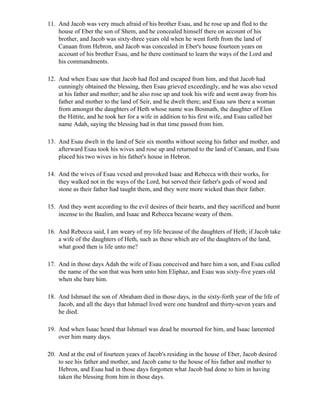
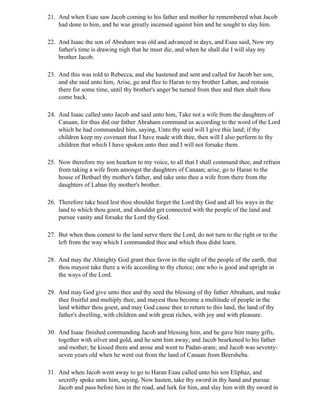
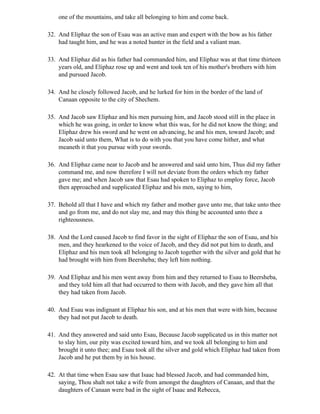
![43. Then he went to the house of Ishmael his uncle, and in addition to his older wives he
took Machlath the daughter of Ishmael, the sister of Nebayoth, for a wife.
Faithfully translated (1840) from the Original Hebrew into English. A Reprint of Photo
Lithographic Reprint of Exact Edition Published by J.H. Parry & Co., Salt Lake City: 1887]](https://image.slidesharecdn.com/jasher-101002213610-phpapp02/85/Jasher-148-320.jpg)
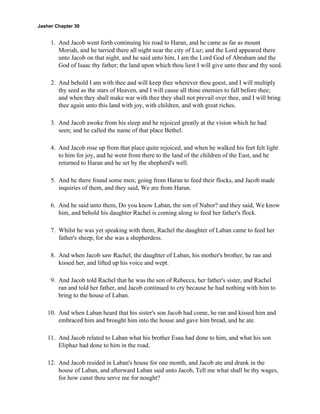
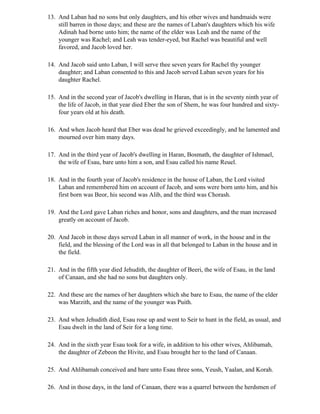
![Esau and the herdsmen of the inhabitants of the land of Canaan, for Esau's cattle and
goods were too abundant for him to remain in the land of Canaan, in his father's house,
and the land of Canaan could not bear him on account of his cattle.
27. And when Esau saw that his quarreling increased with the inhabitants of the land of
Canaan, he rose up and took his wives and his sons and his daughters, and all belonging
to him, and the cattle which he possessed, and all his property that he had acquired in
the land of Canaan, and he went away from the inhabitants of the land to the land of
Seir, and Esau and all belonging to him dwelt in the land of Seir.
28. But from time to time Esau would go and see his father and mother in the land of
Canaan, and Esau intermarried with the Horites, and he gave his daughters to the sons
of Seir, the Horite.
29. And he gave his elder daughter Marzith to Anah, the son of Zebeon, his wife's brother,
and Puith he gave to Azar, the son of Bilhan the Horite; and Esau dwelt in the mountain,
he and his children, and they were fruitful and multiplied.
Faithfully translated (1840) from the Original Hebrew into English. A Reprint of Photo
Lithographic Reprint of Exact Edition Published by J.H. Parry & Co., Salt Lake City: 1887]](https://image.slidesharecdn.com/jasher-101002213610-phpapp02/85/Jasher-151-320.jpg)
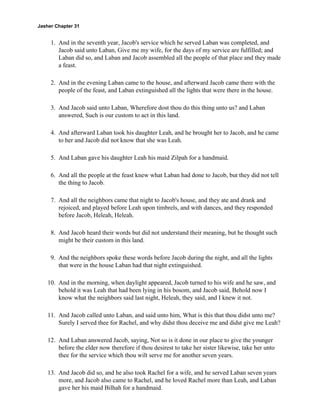
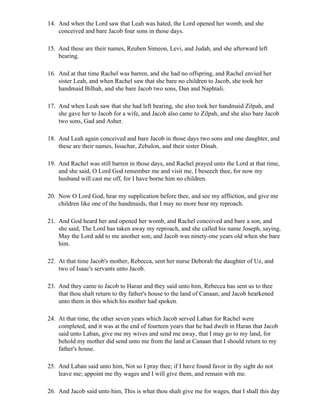
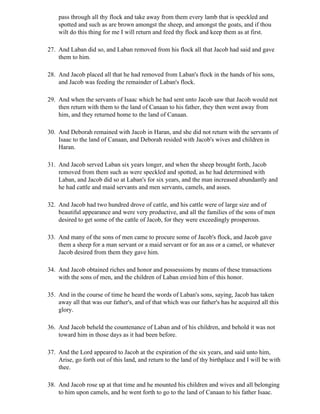
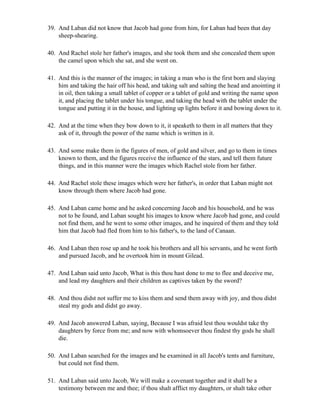
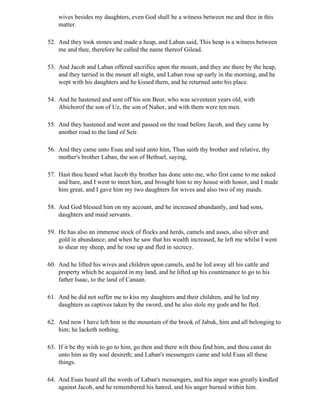
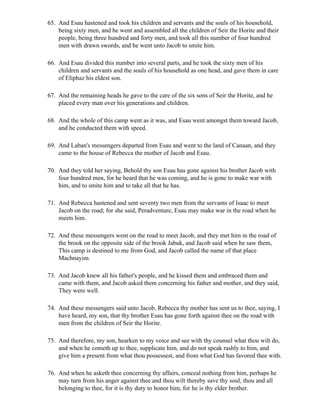
![77. And when Jacob heard the words of his mother which the messengers had spoken to
him, Jacob lifted up his voice and wept bitterly, and did as his mother then commanded
him.
Faithfully translated (1840) from the Original Hebrew into English. A Reprint of Photo
Lithographic Reprint of Exact Edition Published by J.H. Parry & Co., Salt Lake City: 1887]](https://image.slidesharecdn.com/jasher-101002213610-phpapp02/85/Jasher-158-320.jpg)
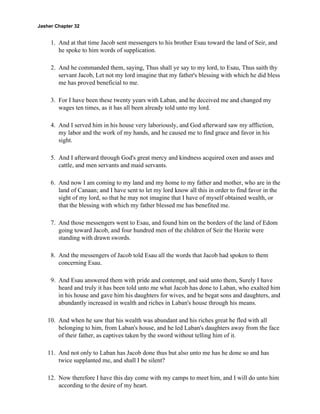
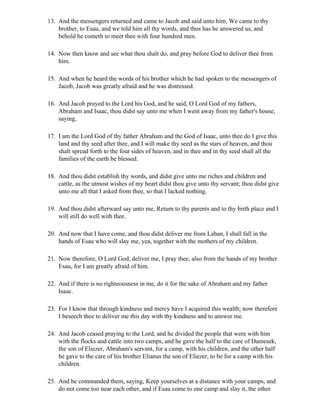
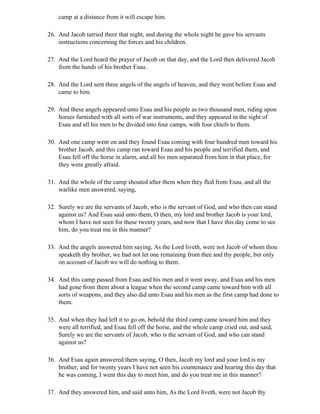
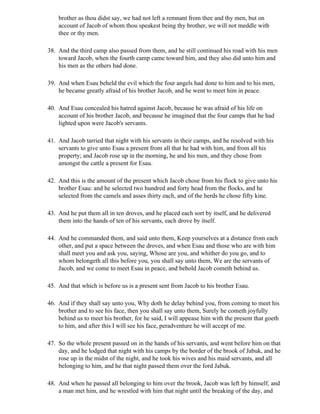
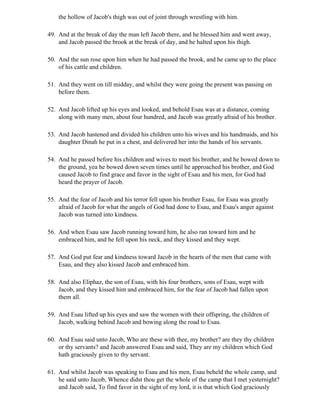
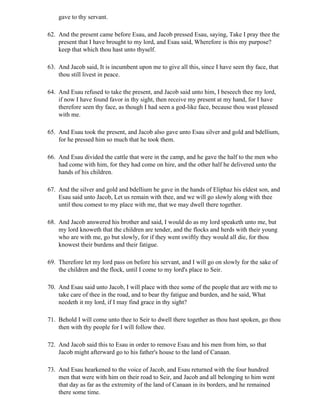
![Faithfully translated (1840) from the Original Hebrew into English. A Reprint of Photo
Lithographic Reprint of Exact Edition Published by J.H. Parry & Co., Salt Lake City: 1887]](https://image.slidesharecdn.com/jasher-101002213610-phpapp02/85/Jasher-165-320.jpg)
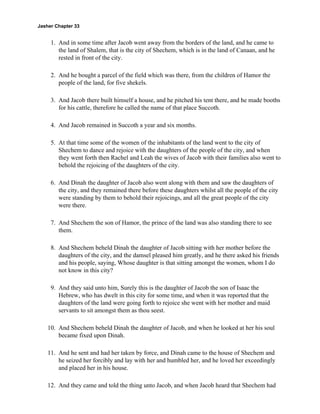
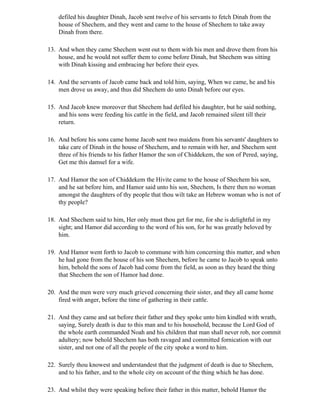
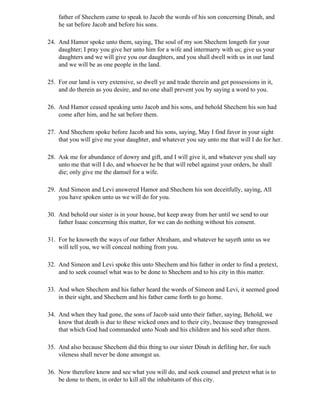
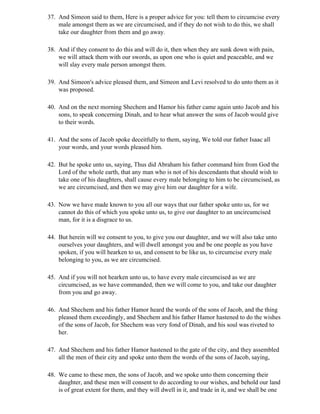
![people; we will take their daughters, and our daughters we will give unto them for
wives.
49. But only on this condition will these men consent to do this thing, that every male
amongst us be circumcised as they are circumcised, as their God commanded them, and
when we shall have done according to their instructions to be circumcised, then will
they dwell amongst us, together with their cattle and possessions, and we shall be as one
people with them.
50. And when all the men of the city heard the words of Shechem and his father Hamor,
then all the men of their city were agreeable to this proposal, and they obeyed to be
circumcised, for Shechem and his father Hamor were greatly esteemed by them, being
the princes of the land.
51. And on the next day, Shechem and Hamor his father rose up early in the morning, and
they assembled all the men of their city into the middle of the city, and they called for
the sons of Jacob, who circumcised every male belonging to them on that day and the
next.
52. And they circumcised Shechem and Hamor his father, and the five brothers of Shechem,
and then every one rose up and went home, for this thing was from the Lord against the
city of Shechem, and from the Lord was Simeon's counsel in this matter, in order that
the Lord might deliver the city of Shechem into the hands of Jacob's two sons.
Faithfully translated (1840) from the Original Hebrew into English. A Reprint of Photo
Lithographic Reprint of Exact Edition Published by J.H. Parry & Co., Salt Lake City: 1887]](https://image.slidesharecdn.com/jasher-101002213610-phpapp02/85/Jasher-170-320.jpg)
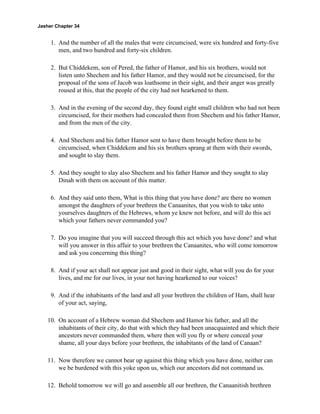
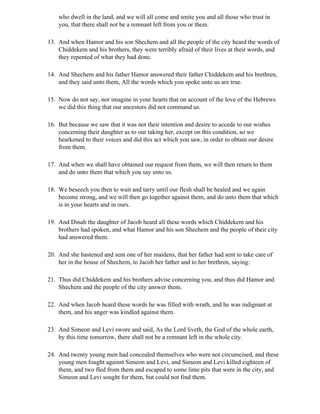
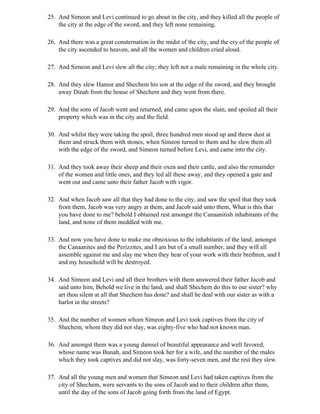
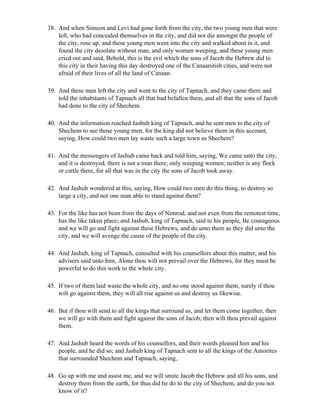
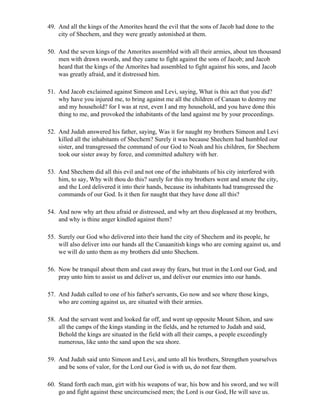
![61. And they rose up, and each girt on his weapons of war, great and small, eleven sons of
Jacob, and all the servants of Jacob with them.
62. And all the servants of Isaac who were with Isaac in Hebron, all came to them equipped
in all sorts of war instruments, and the sons of Jacob and their servants, being one
hundred and twelve men, went towards these kings, and Jacob also went with them.
63. And the sons of Jacob sent unto their father Isaac the son of Abraham to Hebron, the
same is Kireath-arba, saying,
64. Pray we beseech thee for us unto the Lord our God, to protect us from the hands of the
Canaanites who are coming against us, and to deliver them into our hands.
65. And Isaac the son of Abraham prayed unto the Lord for his sons, and he said, O Lord
God, thou didst promise my father, saying, I will multiply thy seed as the stars of
heaven, and thou didst also promise me, and establish thou thy word, now that the kings
of Canaan are coming together, to make war with my children because they committed
no violence.
66. Now therefore, O Lord God, God of the whole earth, pervert, I pray thee, the counsel of
these kings that they may not fight against my sons.
67. And impress the hearts of these kings and their people with the terror of my sons and
bring down their pride, and that they may turn away from my sons.
68. And with thy strong hand and outstretched arm deliver my sons and their servants from
them, for power and might are in thy hands to do all this.
69. And the sons of Jacob and their servants went toward these kings, and they trusted in
the Lord their God, and whilst they were going, Jacob their father also prayed unto the
Lord and said, O Lord God, powerful and exalted God, who has reigned from days of
old, from thence till now and forever;
70. Thou art He who stirreth up wars and causeth them to cease, in thy hand are power and
might to exalt and to bring down; O may my prayer be acceptable before thee that thou
mayest turn to me with thy mercies, to impress the hearts of these kings and their people
with the terror of my sons, and terrify them and their camps, and with thy great kindness
deliver all those that trust in thee, for it is thou who canst bring people under us and
reduce nations under our power.
Faithfully translated (1840) from the Original Hebrew into English. A Reprint of Photo
Lithographic Reprint of Exact Edition Published by J.H. Parry & Co., Salt Lake City: 1887]](https://image.slidesharecdn.com/jasher-101002213610-phpapp02/85/Jasher-176-320.jpg)
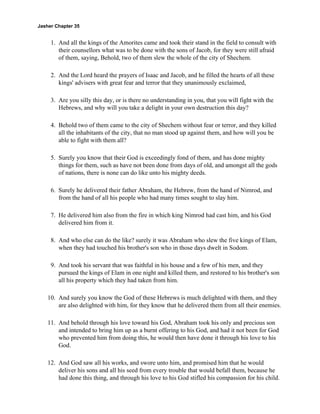
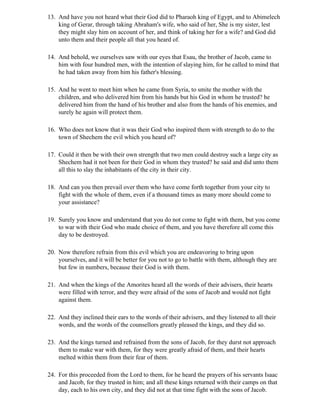
![25. And the sons of Jacob kept their station that day till evening opposite mount Sihon, and
seeing that these kings did not come to fight against them, the sons of Jacob returned
home.
Faithfully translated (1840) from the Original Hebrew into English. A Reprint of Photo
Lithographic Reprint of Exact Edition Published by J.H. Parry & Co., Salt Lake City: 1887]](https://image.slidesharecdn.com/jasher-101002213610-phpapp02/85/Jasher-179-320.jpg)
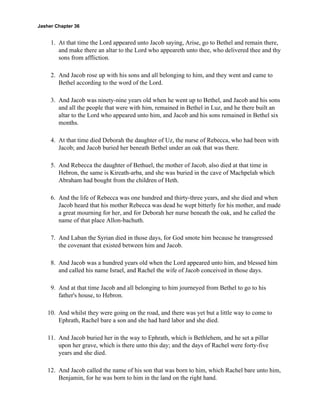
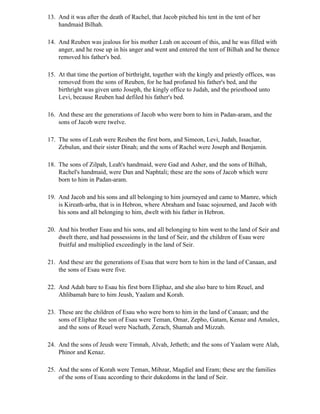
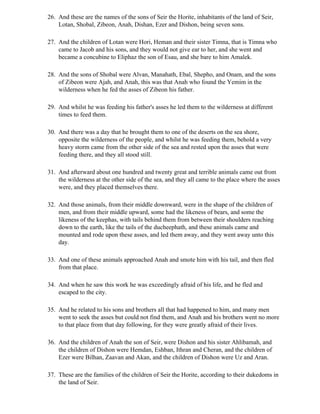
![38. And Esau and his children dwelt in the land of Seir the Horite, the inhabitant of the
land, and they had possessions in it and were fruitful and multiplied exceedingly, and
Jacob and his children and all belonging to them, dwelt with their father Isaac in the
land of Canaan, as the Lord had commanded Abraham their father.
Faithfully translated (1840) from the Original Hebrew into English. A Reprint of Photo
Lithographic Reprint of Exact Edition Published by J.H. Parry & Co., Salt Lake City: 1887]](https://image.slidesharecdn.com/jasher-101002213610-phpapp02/85/Jasher-183-320.jpg)
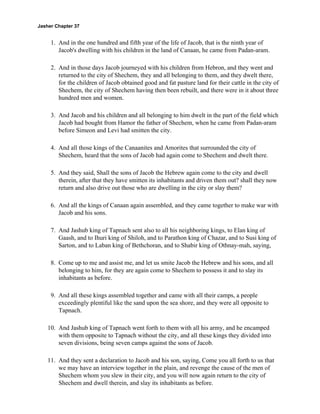
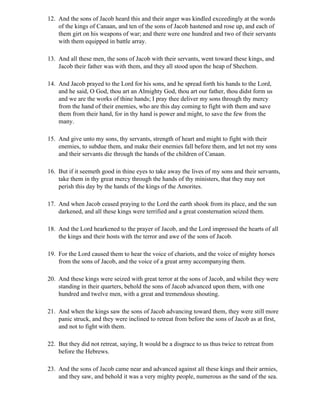
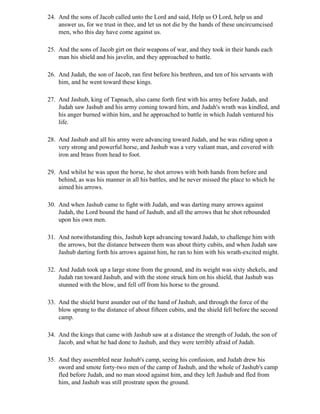
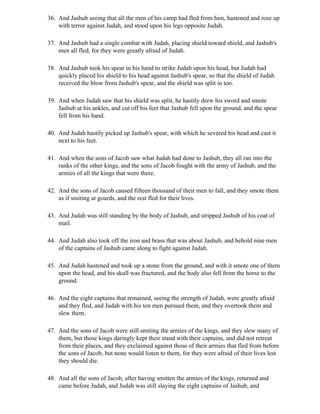
![stripping off their garments.
49. And Levi saw Elon, king of Gaash, advancing toward him, with his fourteen captains to
smite him, but Levi did not know it for certain.
50. And Elon with his captains approached nearer, and Levi looked back and saw that battle
was given him in the rear, and Levi ran with twelve of his servants, and they went and
slew Elon and his captains with the edge of the sword.
Faithfully translated (1840) from the Original Hebrew into English. A Reprint of Photo
Lithographic Reprint of Exact Edition Published by J.H. Parry & Co., Salt Lake City: 1887]](https://image.slidesharecdn.com/jasher-101002213610-phpapp02/85/Jasher-188-320.jpg)
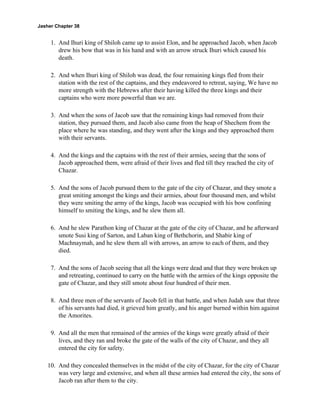
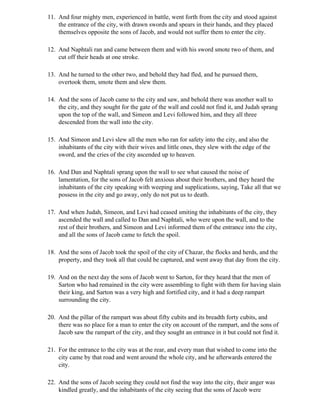
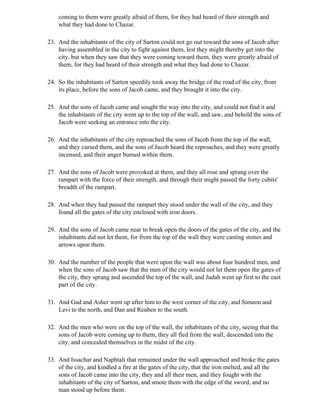
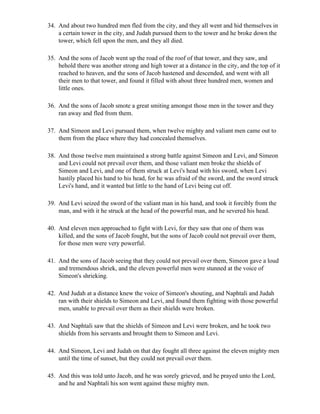
![46. And Jacob approached and drew his bow, and came nigh unto the mighty men, and slew
three of their men with the bow, and the remaining eight turned back, and behold, the
war waged against them in the front and rear, and they were greatly afraid of their lives,
and could not stand before the sons of Jacob, and they fled from before them.
47. And in their flight they met Dan and Asher coming toward them, and they suddenly fell
upon them, and fought with them, and slew two of them, and Judah and his brothers
pursued them, and smote the remainder of them, and slew them.
48. And all the sons of Jacob returned and walked about the city, searching if they could
find any men, and they found about twenty young men in a cave in the city, and Gad
and Asher smote them all, and Dan and Naphtali lighted upon the rest of the men who
had fled and escaped from the second tower, and they smote them all.
49. And the sons of Jacob smote all the inhabitants of the city of Sarton, but the women and
little ones they left in the city and did not slay them.
50. And all the inhabitants of the city of Sarton were powerful men, one of them would
pursue a thousand, and two of them would not flee from ten thousand of the rest of men.
51. And the sons of Jacob slew all the inhabitants of the city of Sarton with the edge of the
sword, that no man stood up against them, and they left the women in the city.
52. And the sons of Jacob took all the spoil of the city, and captured what they desired, and
they took flocks and herds and property from the city, and the sons of Jacob did unto
Sarton and its inhabitants as they had done to Chazar and its inhabitants, and they
turned and went away.
Faithfully translated (1840) from the Original Hebrew into English. A Reprint of Photo
Lithographic Reprint of Exact Edition Published by J.H. Parry & Co., Salt Lake City: 1887]](https://image.slidesharecdn.com/jasher-101002213610-phpapp02/85/Jasher-193-320.jpg)
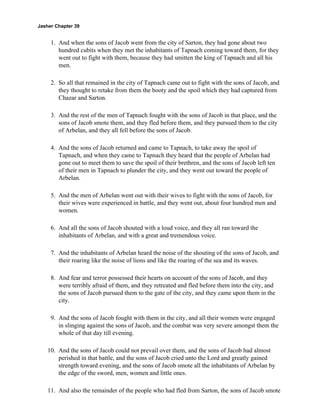
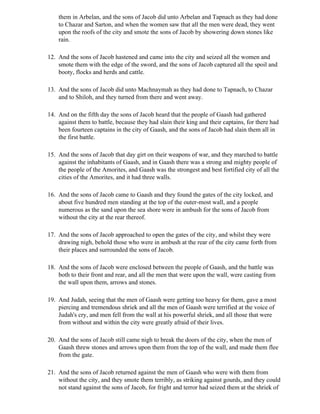
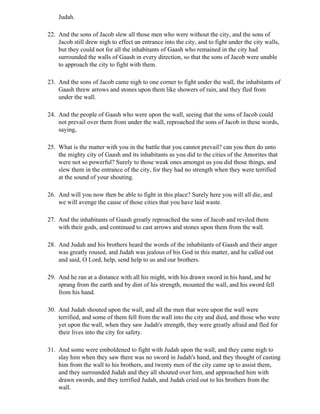
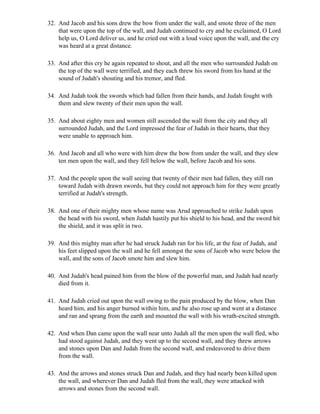
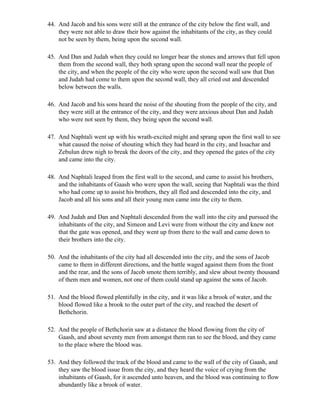
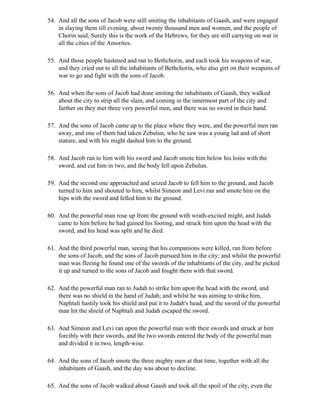
![little ones and women they did not suffer to live, and the sons of Jacob did unto Gaash
as they had done to Sarton and Shiloh.
Faithfully translated (1840) from the Original Hebrew into English. A Reprint of Photo
Lithographic Reprint of Exact Edition Published by J.H. Parry & Co., Salt Lake City: 1887]](https://image.slidesharecdn.com/jasher-101002213610-phpapp02/85/Jasher-200-320.jpg)
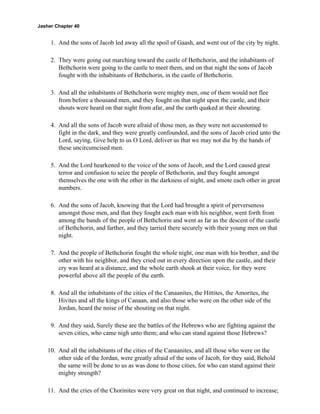
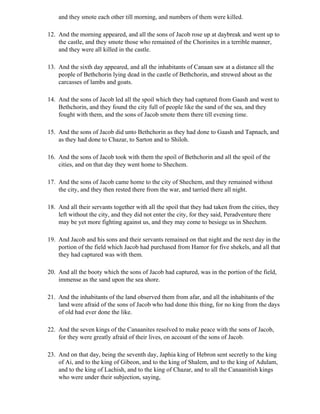
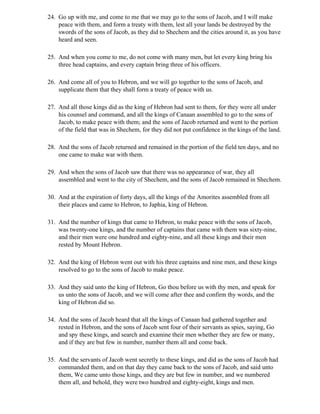
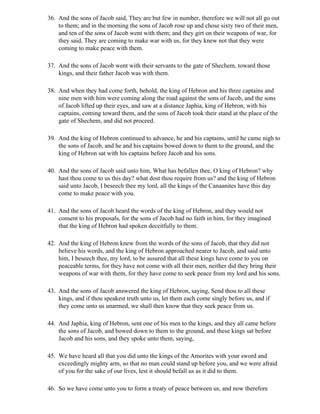
![contract with us a covenant of peace and truth, that you will not meddle with us,
inasmuch as we have not meddled with you.
47. And the sons of Jacob knew that they had really come to seek peace from them, and the
sons of Jacob listened to them, and formed a covenant with them.
48. And the sons of Jacob swore unto them that they would not meddle with them, and all
the kings of the Canaanites swore also to them, and the sons of Jacob made them
tributary from that day forward.
49. And after this all the captains of these kings came with their men before Jacob, with
presents in their hands for Jacob and his sons, and they bowed down to him to the
ground.
50. And these kings then urged the sons of Jacob and begged of them to return all the spoil
they had captured from the seven cities of the Amorites, and the sons of Jacob did so,
and they returned all that they had captured, the women, the little ones, the cattle and all
the spoil which they had taken, and they sent them off, and they went away each to his
city.
51. And all these kings again bowed down to the sons of Jacob, and they sent or brought
them many gifts in those days, and the sons of Jacob sent off these kings and their men,
and they went peaceably away from them to their cities, and the sons of Jacob also
returned to their home, to Shechem.
52. And there was peace from that day forward between the sons of Jacob and the kings of
the Canaanites, until the children of Israel came to inherit the land of Canaan.
Faithfully translated (1840) from the Original Hebrew into English. A Reprint of Photo
Lithographic Reprint of Exact Edition Published by J.H. Parry & Co., Salt Lake City: 1887]](https://image.slidesharecdn.com/jasher-101002213610-phpapp02/85/Jasher-205-320.jpg)
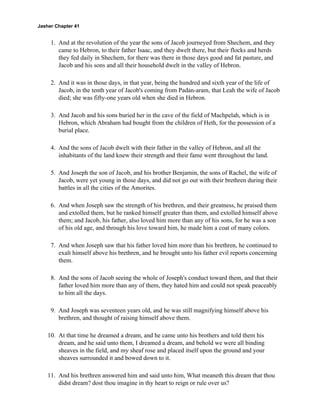
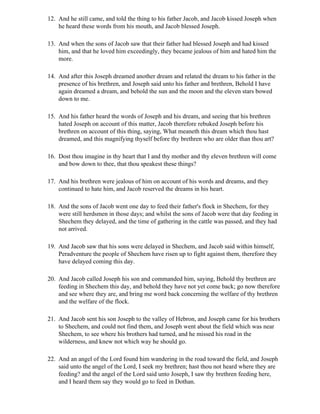
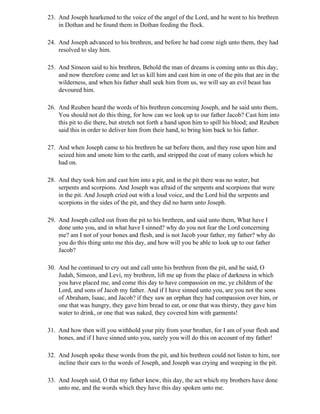
![34. And all his brethren heard his cries and weeping in the pit, and his brethren went and
removed themselves from the pit, so that they might not hear the cries of Joseph and his
weeping in the pit.
Faithfully translated (1840) from the Original Hebrew into English. A Reprint of Photo
Lithographic Reprint of Exact Edition Published by J.H. Parry & Co., Salt Lake City: 1887]](https://image.slidesharecdn.com/jasher-101002213610-phpapp02/85/Jasher-209-320.jpg)
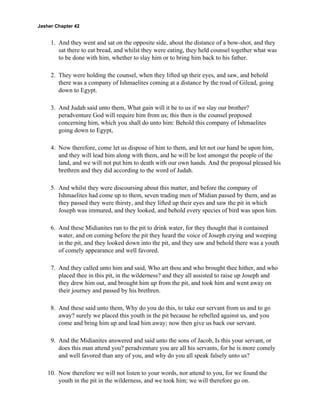
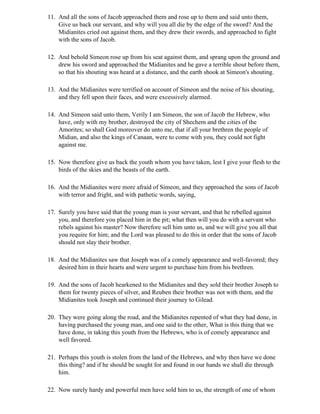
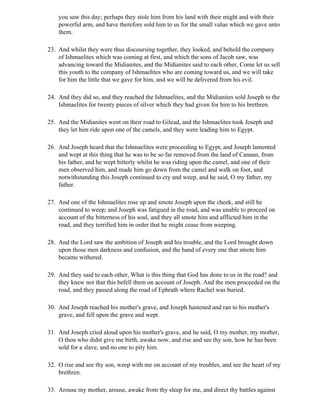
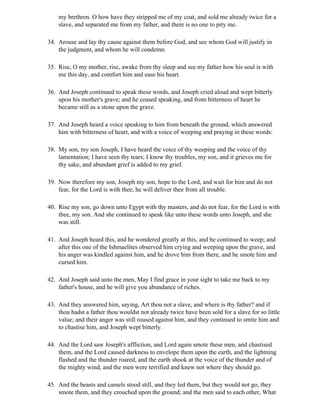
![is this that God has done to us? what are our transgressions, and what are our sins that
this thing has thus befallen us?
46. And one of them answered and said unto them, Perhaps on account of the sin of
afflicting this slave has this thing happened this day to us; now therefore implore him
strongly to forgive us, and then we shall know on whose account this evil befalleth us,
and if God shall have compassion over us, then we shall know that all this cometh to us
on account of the sin of afflicting this slave.
47. And the men did so, and they supplicated Joseph and pressed him to forgive them; and
they said, We have sinned to the Lord and to thee, now therefore vouchsafe to request
of thy God that he shall put away this death from amongst us, for we have sinned to him.
48. And Joseph did according to their words, and the Lord hearkened to Joseph, and the
Lord put away the plague which he had inflicted upon those men on account of Joseph,
and the beasts rose up from the ground and they conducted them, and they went on, and
the raging storm abated and the earth became tranquilized, and the men proceeded on
their journey to go down to Egypt, and the men knew that this evil had befallen them on
account of Joseph.
49. And they said to each other, Behold we know that it was on account of his affliction that
this evil befell us; now therefore why shall we bring this death upon our souls? Let us
hold counsel what to do to this slave.
50. And one answered and said, Surely he told us to bring him back to his father; now
therefore come, let us take him back and we will go to the place that he will tell us, and
take from his family the price that we gave for him and we will then go away.
51. And one answered again and said, Behold this counsel is very good, but we cannot do
so for the way is very far from us, and we cannot go out of our road.
52. And one more answered and said unto them, This is the counsel to be adopted, we will
not swerve from it; behold we are this day going to Egypt, and when we shall have
come to Egypt, we will sell him there at a high price, and we will be delivered from his
evil.
53. And this thing pleased the men and they did so, and they continued their journey to
Egypt with Joseph.
Faithfully translated (1840) from the Original Hebrew into English. A Reprint of Photo
Lithographic Reprint of Exact Edition Published by J.H. Parry & Co., Salt Lake City: 1887]](https://image.slidesharecdn.com/jasher-101002213610-phpapp02/85/Jasher-214-320.jpg)
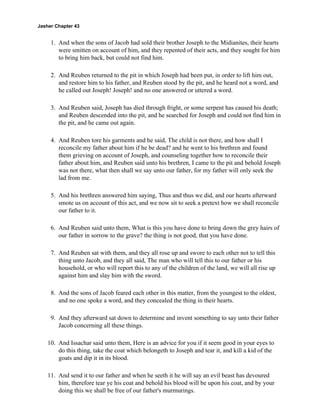
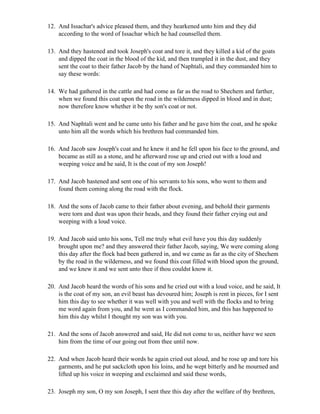
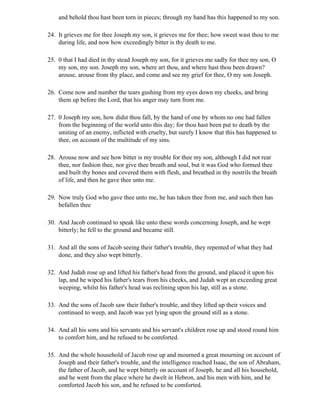
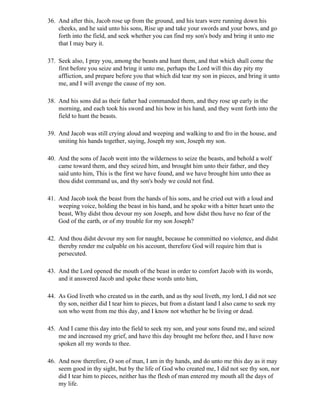
![47. And when Jacob heard the words of the beast he was greatly astonished, and sent forth
the beast from his hand, and she went her way.
48. And Jacob was still crying aloud and weeping for Joseph day after day, and he mourned
for his son many days.
Faithfully translated (1840) from the Original Hebrew into English. A Reprint of Photo
Lithographic Reprint of Exact Edition Published by J.H. Parry & Co., Salt Lake City: 1887]](https://image.slidesharecdn.com/jasher-101002213610-phpapp02/85/Jasher-219-320.jpg)
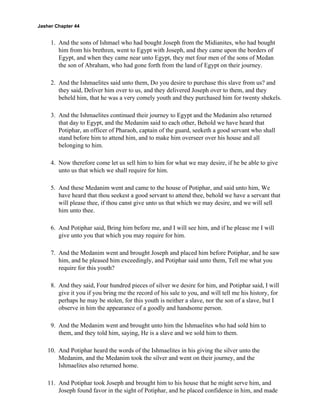
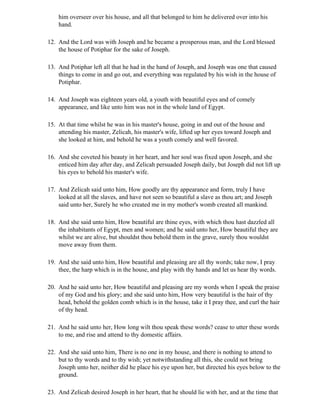
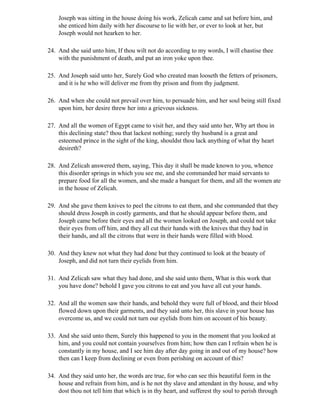
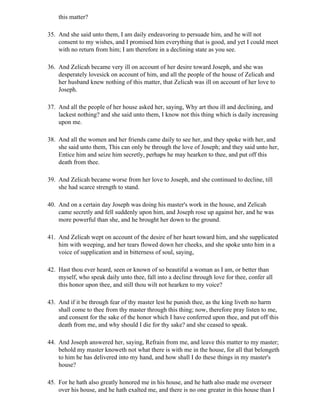
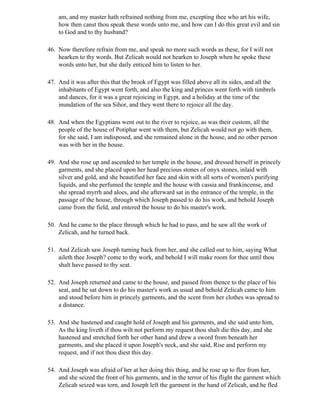
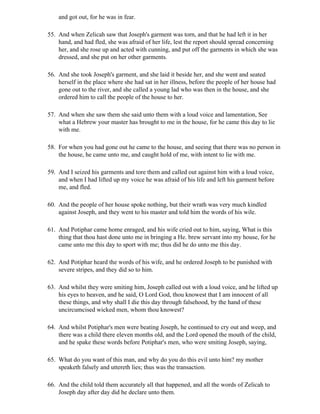
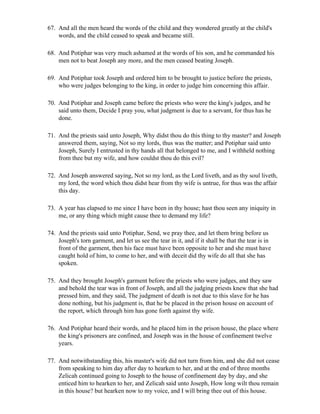
![78. And Joseph answered her, saying, It is better for me to remain in this house than to
hearken to thy words, to sin against God; and she said unto him, If thou wilt not perform
my wish, I will pluck out thine eyes, add fetters to thy feet, and will deliver thee into the
hands of them whom thou didst not know before.
79. And Joseph answered her and said, Behold the God of the whole earth is able to deliver
me from all that thou canst do unto me, for he openeth the eyes of the blind, and looseth
those that are bound, and preserveth all strangers who are unacquainted with the land.
80. And when Zelicah was unable to persuade Joseph to hearken to her, she left off going to
entice him; and Joseph was still confined in the house of confinement. And Jacob the
father of Joseph, and all his brethren who were in the land of Canaan still mourned and
wept in those days on account of Joseph, for Jacob refused to be comforted for his son
Joseph, and Jacob cried aloud, and wept and mourned all those days.
Faithfully translated (1840) from the Original Hebrew into English. A Reprint of Photo
Lithographic Reprint of Exact Edition Published by J.H. Parry & Co., Salt Lake City: 1887]](https://image.slidesharecdn.com/jasher-101002213610-phpapp02/85/Jasher-227-320.jpg)
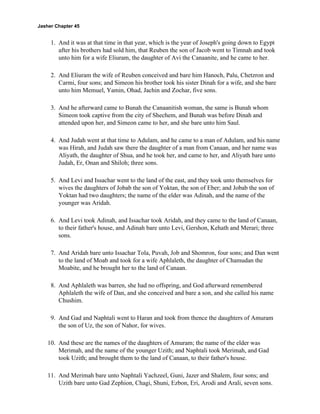
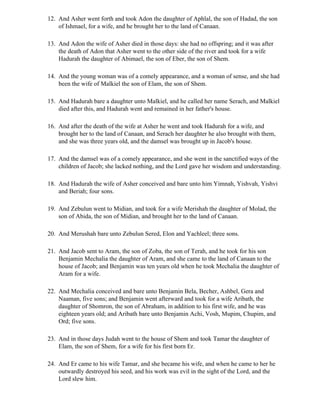
![25. And it was after the death of Er, Judah's first born, that Judah said unto Onan, go to thy
brother's wife and marry her as the next of kin, and raise up seed to thy brother.
26. And Onan took Tamar for a wife and he came to her, and Onan also did like unto the
work of his brother, and his work was evil in the sight of the Lord, and he slew him also.
27. And when Onan died, Judah said unto Tamar, Remain in thy father's house until my son
Shiloh shall have grown up, and Judah did no more delight in Tamar, to give her unto
Shiloh, for he said, Peradventure he will also die like his brothers.
28. And Tamar rose up and went and remained in her father's house, and Tamar was in her
father's house for some time.
29. And at the revolution of the year, Aliyath the wife of Judah died; and Judah was
comforted for his wife, and after the death of Aliyath, Judah went up with his friend
Hirah to Timnah to shear their sheep.
30. And Tamar heard that Judah had gone up to Timnah to shear the sheep, and that Shiloh
was grown up, and Judah did not delight in her.
31. And Tamar rose up and put off the garments of her widowhood, and she put a vail upon
her, and she entirely covered herself, and she went and sat in the public thoroughfare,
which is upon the road to Timnah.
32. And Judah passed and saw her and took her and he came to her, and she conceived by
him, and at the time of being delivered, behold, there were twins in her womb, and he
called the name of the first Perez, and the name of the second Zarah.
Faithfully translated (1840) from the Original Hebrew into English. A Reprint of Photo
Lithographic Reprint of Exact Edition Published by J.H. Parry & Co., Salt Lake City: 1887]](https://image.slidesharecdn.com/jasher-101002213610-phpapp02/85/Jasher-230-320.jpg)
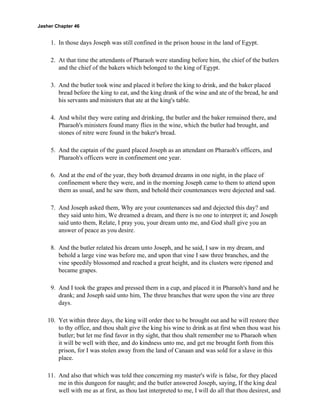
![get thee brought out of this dungeon.
12. And the baker, seeing that Joseph had accurately interpreted the butler's dream, also
approached, and related the whole of his dream to Joseph.
13. And he said unto him, In my dream I saw and behold three white baskets upon my head,
and I looked, and behold there were in the upper-most basket all manner of baked meats
for Pharaoh, and behold the birds were eating them from off my head.
14. And Joseph said unto him, The three baskets which thou didst see are three days, yet
within three days Pharaoh will take off thy head, and hang thee upon a tree, and the
birds will eat thy flesh from off thee, as thou sawest in thy dream.
15. In those days the queen was about to be delivered, and upon that day she bare a son unto
the king of Egypt, and they proclaimed that the king had gotten his first born son and all
the people of Egypt together with the officers and servants of Pharaoh rejoiced greatly.
16. And upon the third day of his birth Pharaoh made a feast for his officers and servants,
for the hosts of the land of Zoar and of the land of Egypt.
17. And all the people of Egypt and the servants of Pharaoh came to eat and drink with the
king at the feast of his son, and to rejoice at the king's rejoicing.
18. And all the officers of the king and his servants were rejoicing at that time for eight
days at the feast, and they made merry with all sorts of musical instruments, with
timbrels and with dances in the king's house for eight days.
19. And the butler, to whom Joseph had interpreted his dream, forgot Joseph, and he did not
mention him to the king as he had promised, for this thing was from the Lord in order to
punish Joseph because he had trusted in man.
20. And Joseph remained after this in the prison house two years, until he had completed
twelve years.
Faithfully translated (1840) from the Original Hebrew into English. A Reprint of Photo
Lithographic Reprint of Exact Edition Published by J.H. Parry & Co., Salt Lake City: 1887]](https://image.slidesharecdn.com/jasher-101002213610-phpapp02/85/Jasher-232-320.jpg)
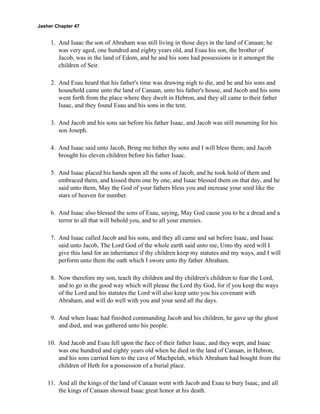
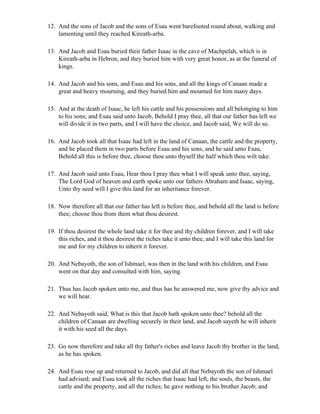
![Jacob took all the land of Canaan, from the brook of Egypt unto the river Euphrates, and
he took it for an everlasting possession, and for his children and for his seed after him
forever.
25. Jacob also took from his brother Esau the cave of Machpelah, which is in Hebron,
which Abraham had bought from Ephron for a possession of a burial place for him and
his seed forever.
26. And Jacob wrote all these things in the book of purchase, and he signed it, and he
testified all this with four faithful witnesses.
27. And these are the words which Jacob wrote in the book, saying: The land of Canaan and
all the cities of the Hittites, the Hivites, the Jebusites, the Amorites, the Perizzites, and
the Gergashites, all the seven nations from the river of Egypt unto the river Euphrates.
28. And the city of Hebron Kireath-arba, and the cave which is in it, the whole did Jacob
buy from his brother Esau for value, for a possession and for an inheritance for his seed
after him forever.
29. And Jacob took the book of purchase and the signature, the command and the statutes
and the revealed book, and he placed them in an earthen vessel in order that they should
remain for a long time, and he delivered them into the hands of his children.
30. Esau took all that his father had left him after his death from his brother Jacob, and he
took all the property, from man and beast, camel and ass, ox and lamb, silver and gold,
stones and bdellium, and all the riches which had belonged to Isaac the son of Abraham;
there was nothing left which Esau did not take unto himself, from all that Isaac had left
after his death.
31. And Esau took all this, and he and his children went home to the land of Seir the Horite,
away from his brother Jacob and his children.
32. And Esau had possessions amongst the children of Seir, and Esau returned not to the
land of Canaan from that day forward.
33. And the whole land of Canaan became an inheritance to the children of Israel for an
everlasting inheritance, and Esau with all his children inherited the mountain of Seir.
Faithfully translated (1840) from the Original Hebrew into English. A Reprint of Photo
Lithographic Reprint of Exact Edition Published by J.H. Parry & Co., Salt Lake City: 1887]](https://image.slidesharecdn.com/jasher-101002213610-phpapp02/85/Jasher-235-320.jpg)
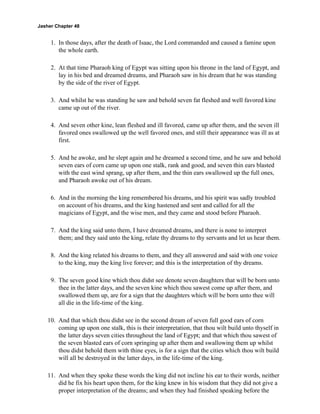
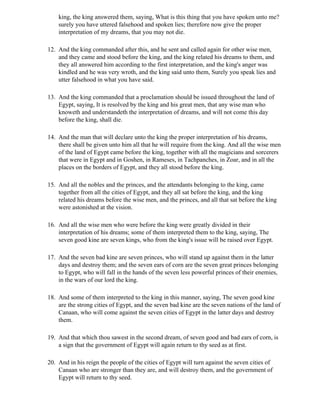
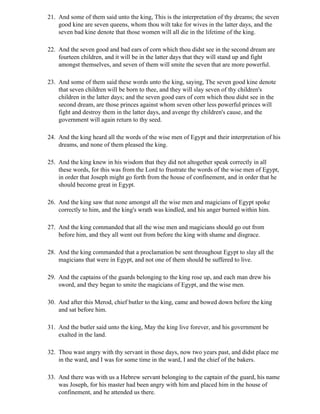
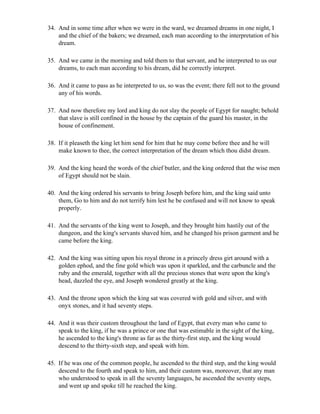
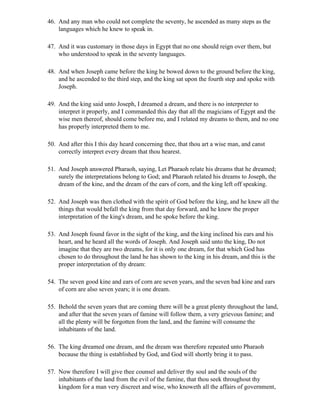
![and appoint him to superintend over the land of Egypt.
58. And let the man whom thou placest over Egypt appoint officers under him, that they
gather in all the food of the good years that are coming, and let them lay up corn and
deposit it in thy appointed stores.
59. And let them keep that food for the seven years of famine, that it may be found for thee
and thy people and thy whole land, and that thou and thy land be not cut off by the
famine.
60. Let all the inhabitants of the land be also ordered that they gather in, every man the
produce of his field, of all sorts of food, during the seven good years, and that they
place it in their stores, that it may be found for them in the days of the famine and that
they may live upon it.
61. This is the proper interpretation of thy dream, and this is the counsel given to save thy
soul and the souls of all thy subjects.
62. And the king answered and said unto Joseph, Who sayeth and who knoweth that thy
words are correct? And he said unto the king, This shall be a sign for thee respecting all
my words, that they are true and that my advice is good for thee.
63. Behold thy wife sitteth this day upon the stool of delivery, and she will bear thee a son
and thou wilt rejoice with him; when thy child shall have gone forth from his mother's
womb, thy first born son that has been born these two years back shall die, and thou wilt
be comforted in the child that will be born unto thee this day.
64. And Joseph finished speaking these words to the king, and he bowed down to the king
and he went out, and when Joseph had gone out from the king's presence, those signs
which Joseph had spoken unto the king came to pass on that day.
65. And the queen bare a son on that day and the king heard the glad tidings about his son,
and he rejoiced, and when the reporter had gone forth from the king's presence, the
king's servants found the first born son of the king fallen dead upon the ground.
66. And there was great lamentation and noise in the king's house, and the king heard it, and
he said, What is the noise and lamentation that I have heard in the house? and they told
the king that his first born son had died; then the king knew that all Joseph's words that
he had spoken were correct, and the king was consoled for his son by the child that was
born to him on that day as Joseph had spoken.
Faithfully translated (1840) from the Original Hebrew into English. A Reprint of Photo
Lithographic Reprint of Exact Edition Published by J.H. Parry & Co., Salt Lake City: 1887]](https://image.slidesharecdn.com/jasher-101002213610-phpapp02/85/Jasher-241-320.jpg)
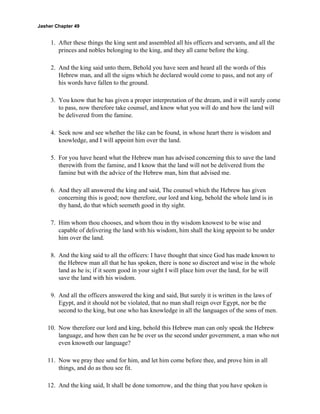
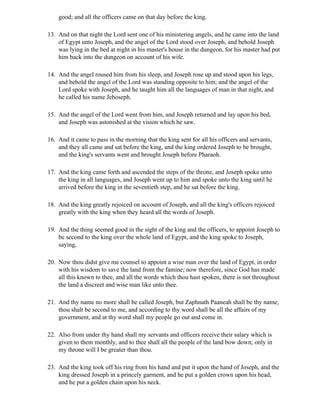
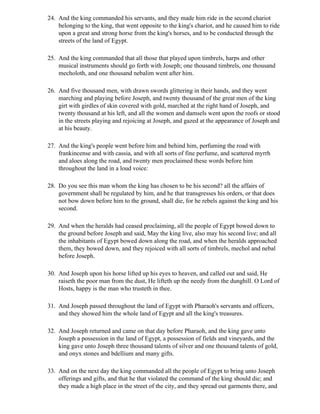
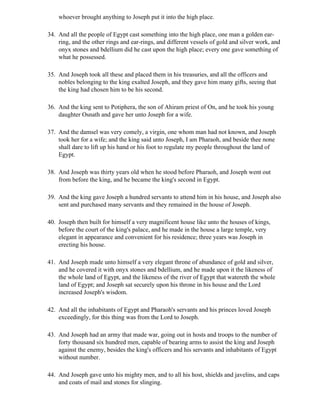
![Faithfully translated (1840) from the Original Hebrew into English. A Reprint of Photo
Lithographic Reprint of Exact Edition Published by J.H. Parry & Co., Salt Lake City: 1887]](https://image.slidesharecdn.com/jasher-101002213610-phpapp02/85/Jasher-246-320.jpg)
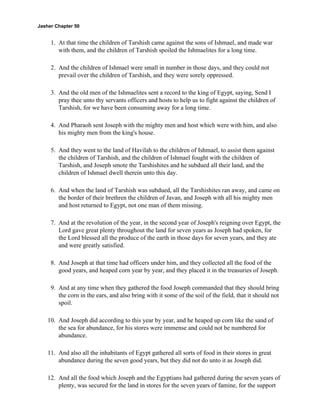
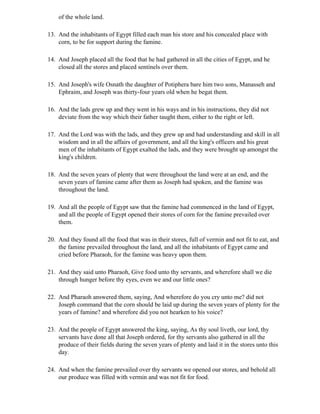
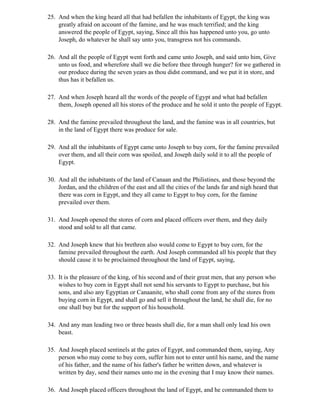
![do all these things.
37. And Joseph did all these things, and made these statutes, in order that he might know
when his brethren should come to Egypt to buy corn; and Joseph's people caused it
daily to be proclaimed in Egypt according to these words and statutes which Joseph had
commanded.
38. And all the inhabitants of the east and west country, and of all the earth, heard of the
statutes and regulations which Joseph had enacted in Egypt, and the inhabitants of the
extreme parts of the earth came and they bought corn in Egypt day after day, and then
went away.
39. And all the officers of Egypt did as Joseph had commanded, and all that came to Egypt
to buy corn, the gate keepers would write their names, and their fathers' names, and
daily bring them in the evening before Joseph.
Faithfully translated (1840) from the Original Hebrew into English. A Reprint of Photo
Lithographic Reprint of Exact Edition Published by J.H. Parry & Co., Salt Lake City: 1887]](https://image.slidesharecdn.com/jasher-101002213610-phpapp02/85/Jasher-250-320.jpg)
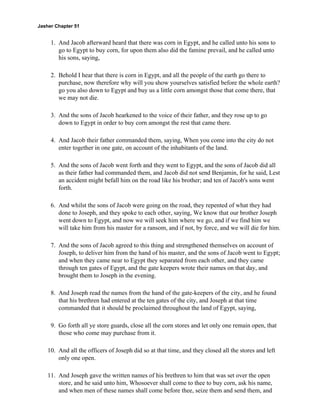
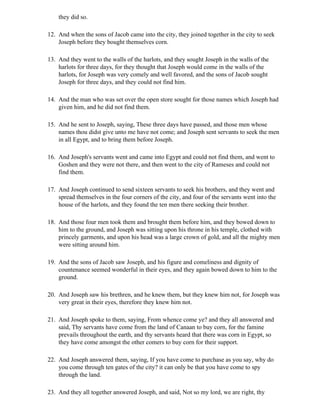
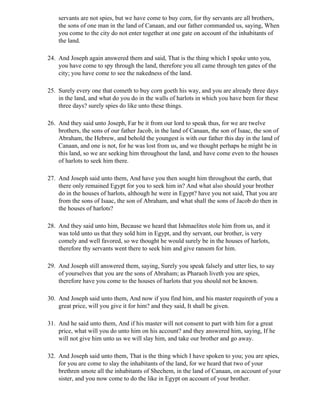
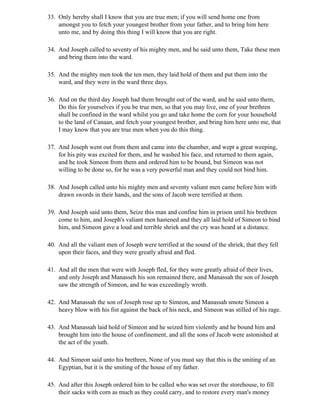
![into his sack, and to give them provision for the road, and thus did he unto them.
46. And Joseph commanded them, saying, Take heed lest you transgress my orders to bring
your brother as I have told you, and it shall be when you bring your brother hither unto
me, then will I know that you are true men, and you shall traffic in the land, and I will
restore unto you your brother, and you shall return in peace to your father.
47. And they all answered and said, According as our lord speaketh so will we do, and they
bowed down to him to the ground.
48. And every man lifted his corn upon his ass, and they went out to go to the land of
Canaan to their father; and they came to the inn and Levi spread his sack to give
provender to his ass, when he saw and behold his money in full weight was still in his
sack.
49. And the man was greatly afraid, and he said unto his brethren, My money is restored,
and lo, it is even in my sack, and the men were greatly afraid, and they said, What is this
that God hath done unto us?
50. And they all said, And where is the Lord's kindness with our fathers, with Abraham,
Isaac, end Jacob, that the Lord has this day delivered us into the hands of the king of
Egypt to contrive against us?
51. And Judah said unto them, Surely we are guilty sinners before the Lord our God in
having sold our brother, our own flesh, and wherefore do you say, Where is the Lord's
kindness with our fathers?
52. And Reuben said unto them, Said I not unto you, do not sin against the lad, and you
would not listen to me? now God requireth him from us, and how dare you say, Where
is the Lord's kindness with our fathers, whilst you have sinned unto the Lord?
53. And they tarried over night in that place, and they rose up early in the morning and
laded their asses with their corn, and they led them and went on and came to their
father's house in the land of Canaan.
54. And Jacob and his household went out to meet his sons, and Jacob saw and behold their
brother Simeon was not with them, and Jacob said unto his sons, Where is your brother
Simeon, whom I do not see? and his sons told him all that had befallen them in Egypt.
Faithfully translated (1840) from the Original Hebrew into English. A Reprint of Photo
Lithographic Reprint of Exact Edition Published by J.H. Parry & Co., Salt Lake City: 1887]](https://image.slidesharecdn.com/jasher-101002213610-phpapp02/85/Jasher-255-320.jpg)
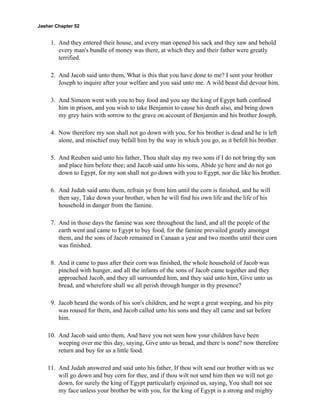
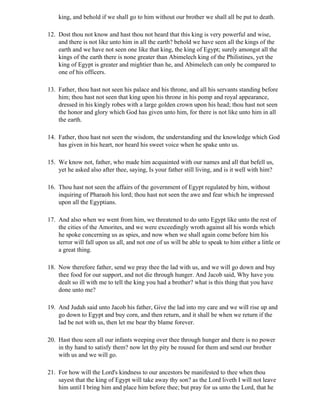
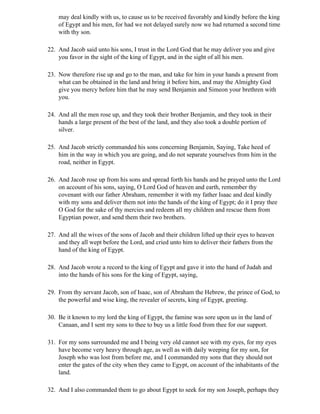
![might find him there, and they did so, and thou didst consider them as spies of the land.
33. Have we not heard concerning thee that thou didst interpret Pharaoh's dream and didst
speak truly unto him? how then dost thou not know in thy wisdom whether my sons are
spies or not?
34. Now therefore, my lord and king, behold I have sent my son before thee, as thou didst
speak unto my sons; I beseech thee to put thy eyes upon him until he is returned to me
in peace with his brethren.
35. For dost thou not know, or hast thou not heard that which our God did unto Pharaoh
when he took my mother Sarah, and what he did unto Abimelech king of the Philistines
on account of her, and also what our father Abraham did unto the nine kings of Elam,
how he smote them all with a few men that were with him?
36. And also what my two sons Simeon and Levi did unto the eight cities of the Amorites,
how they destroyed them on account of their sister Dinah?
37. And also on account of their brother Benjamin they consoled themselves for the loss of
his brother Joseph; what will they then do for him when they see the hand of any people
prevailing over them, for his sake?
38. Dost thou not know, O king of Egypt, that the power of God is with us, and that also
God ever heareth our prayers and forsaketh us not all the days?
39. And when my sons told me of thy dealings with them, I called not unto the Lord on
account of thee, for then thou wouldst have perished with thy men before my son
Benjamin came before thee, but I thought that as Simeon my son was in thy house,
perhaps thou mightest deal kindly with him, therefore I did not this thing unto thee.
40. Now therefore behold Benjamin my son cometh unto thee with my sons, take heed of
him and put thy eyes upon him, and then will God place his eyes over thee and
throughout thy kingdom.
41. Now I have told thee all that is in my heart, and behold my sons are coming to thee with
their brother, examine the face of the whole earth for their sake and send them back in
peace with their brethren.
42. And Jacob gave the record to his sons into the care of Judah to give it unto the king of
Egypt.
Faithfully translated (1840) from the Original Hebrew into English. A Reprint of Photo
Lithographic Reprint of Exact Edition Published by J.H. Parry & Co., Salt Lake City: 1887]](https://image.slidesharecdn.com/jasher-101002213610-phpapp02/85/Jasher-259-320.jpg)
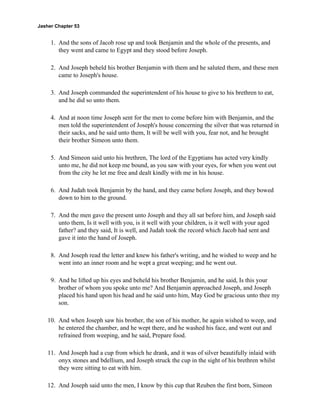
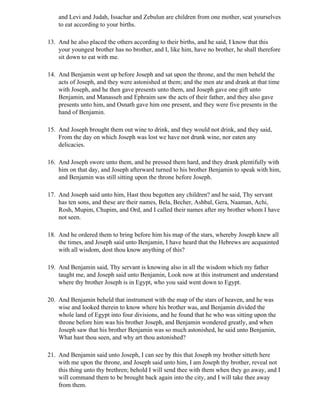
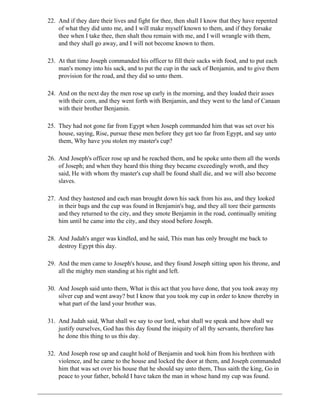
![Faithfully translated (1840) from the Original Hebrew into English. A Reprint of Photo
Lithographic Reprint of Exact Edition Published by J.H. Parry & Co., Salt Lake City: 1887]](https://image.slidesharecdn.com/jasher-101002213610-phpapp02/85/Jasher-263-320.jpg)
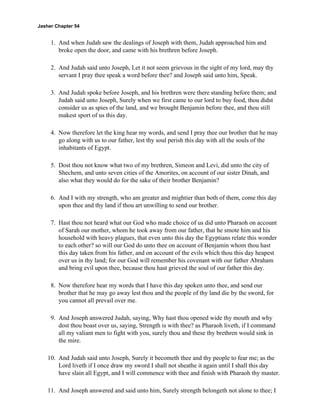
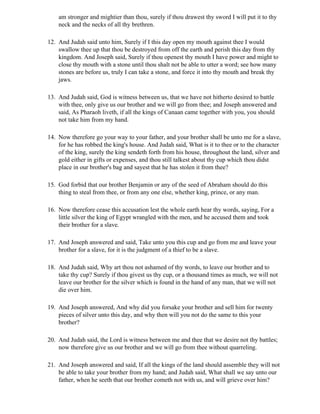
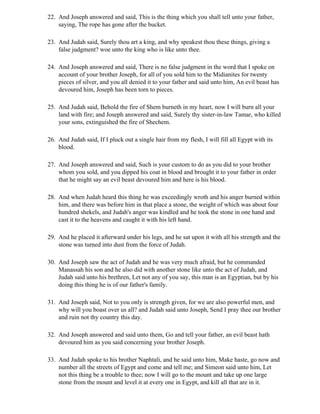
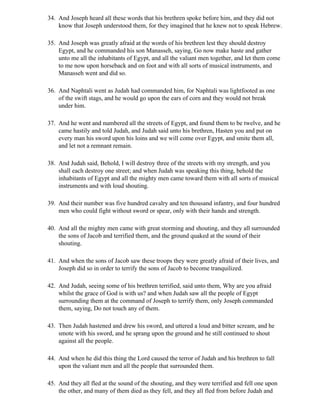
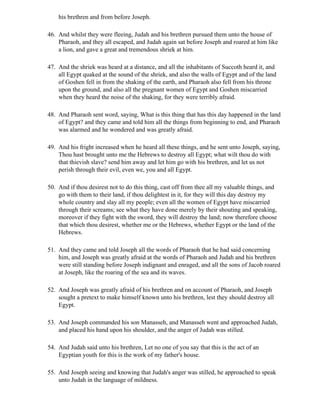
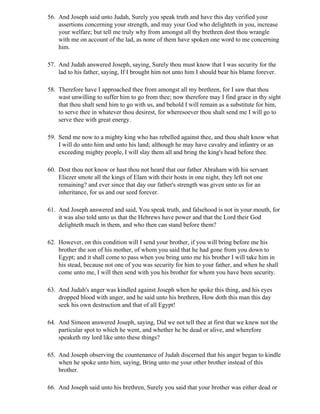
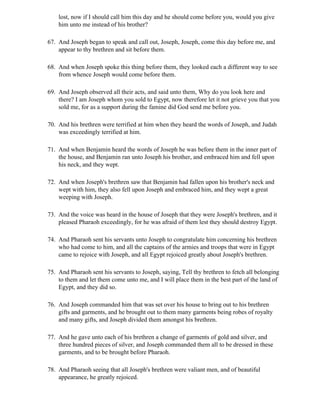
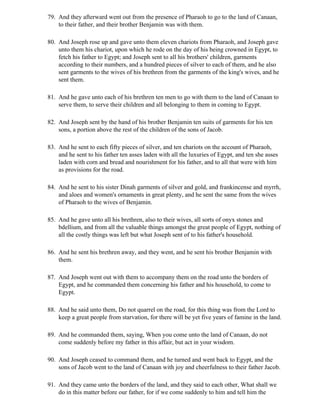
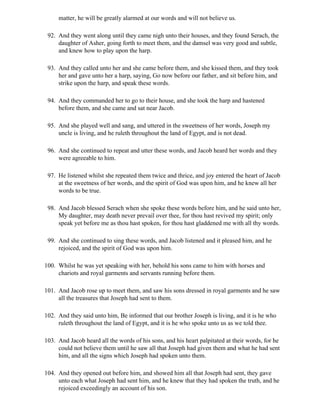
![105. And Jacob said, It is enough for me that my son Joseph is still living, I will go and see
him before I die.
106. And his sons told him all that had befallen them, and Jacob said, I will go down to
Egypt to see my son and his offspring.
107. And Jacob rose up and put on the garments which Joseph had sent him, and after he had
washed, and shaved his hair, he put upon his head the turban which Joseph had sent him.
108. And all the people of Jacob's house and their wives put on the garments which Joseph
had sent to them, and they greatly rejoiced at Joseph that he was still living and that he
was ruling in Egypt,
109. And all the inhabitants of Canaan heard of this thing, and they came and rejoiced much
with Jacob that he was still living.
110. And Jacob made a feast for them for three days, and all the kings of Canaan and nobles
of the land ate and drank and rejoiced in the house of Jacob.
Faithfully translated (1840) from the Original Hebrew into English. A Reprint of Photo
Lithographic Reprint of Exact Edition Published by J.H. Parry & Co., Salt Lake City: 1887]](https://image.slidesharecdn.com/jasher-101002213610-phpapp02/85/Jasher-273-320.jpg)
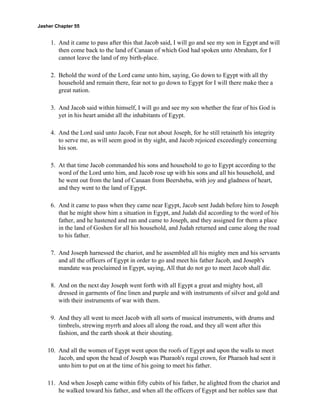
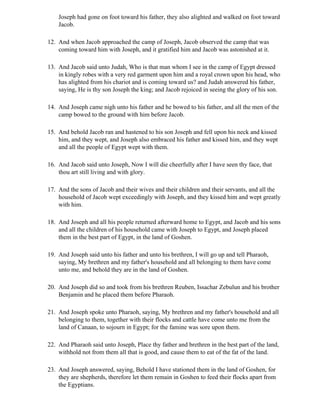
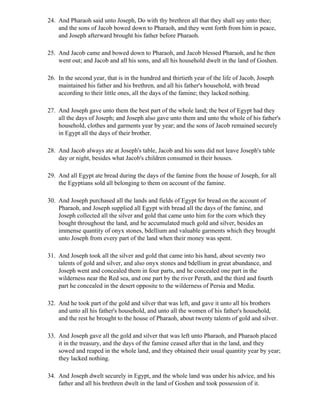
![35. And Joseph was very aged, advanced in days, and his two sons, Ephraim and Manasseh,
remained constantly in the house of Jacob, together with the children of the sons of
Jacob their brethren, to learn the ways of the Lord and his law.
36. And Jacob and his sons dwelt in the land of Egypt in the land of Goshen, and they took
possession in it, and they were fruitful and multiplied in it.
Faithfully translated (1840) from the Original Hebrew into English. A Reprint of Photo
Lithographic Reprint of Exact Edition Published by J.H. Parry & Co., Salt Lake City: 1887]](https://image.slidesharecdn.com/jasher-101002213610-phpapp02/85/Jasher-277-320.jpg)
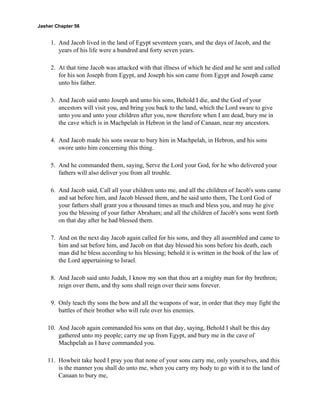
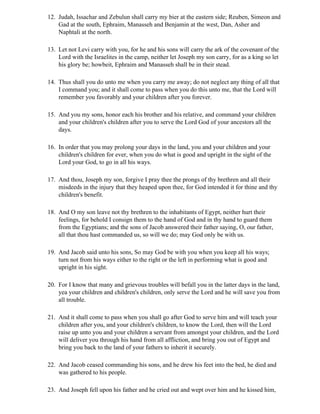
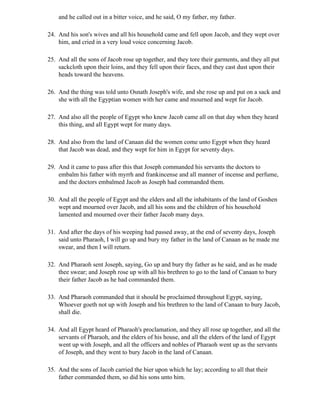
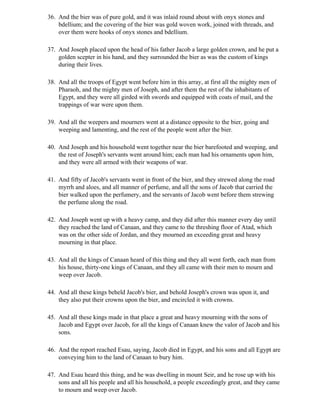
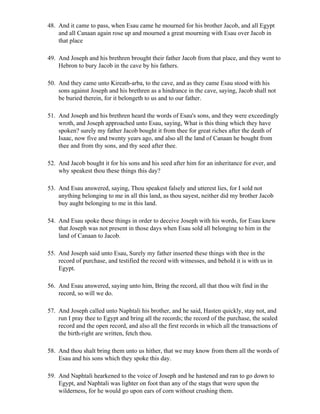
![60. And when Esau saw that Naphtali had gone to fetch the records, he and his sons
increased their resistance against the cave, and Esau and all his people rose up against
Joseph and his brethren to battle.
61. And all the sons of Jacob and the people of Egypt fought with Esau and his men, and
the sons of Esau and his people were smitten before the sons of Jacob, and the sons of
Jacob slew of Esau's people forty men.
62. And Chushim the son of Dan, the son of Jacob, was at that time with Jacob's sons, but
he was about a hundred cubits distant from the place of battle, for he remained with the
children of Jacob's sons by Jacob's bier to guard it.
63. And Chushim was dumb and deaf, still he understood the voice of consternation
amongst men.
64. And he asked, saying, Why do you not bury the dead, and what is this great
consternation? and they answered him the words of Esau and his sons; and he ran to
Esau in the midst of the battle, and he slew Esau with a sword, and he cut off his head,
and it sprang to a distance, and Esau fell amongst the people of the battle.
65. And when Chushim did this thing the sons of Jacob prevailed over the sons of Esau, and
the sons of Jacob buried their father Jacob by force in the cave, and the sons of Esau
beheld it.
66. And Jacob was buried in Hebron, in the cave of Machpelah which Abraham had bought
from the sons of Heth for the possession of a burial place, and he was buried in very
costly garments.
67. And no king had such honor paid him as Joseph paid unto his father at his death, for he
buried him with great honor like unto the burial of kings.
68. And Joseph and his brethren made a mourning of seven days for their father.
Faithfully translated (1840) from the Original Hebrew into English. A Reprint of Photo
Lithographic Reprint of Exact Edition Published by J.H. Parry & Co., Salt Lake City: 1887]](https://image.slidesharecdn.com/jasher-101002213610-phpapp02/85/Jasher-283-320.jpg)
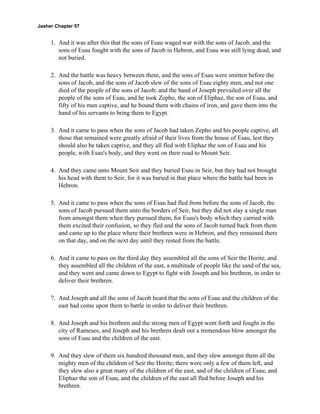
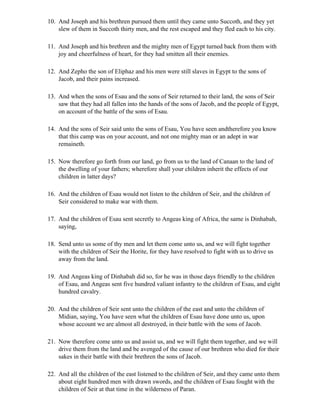
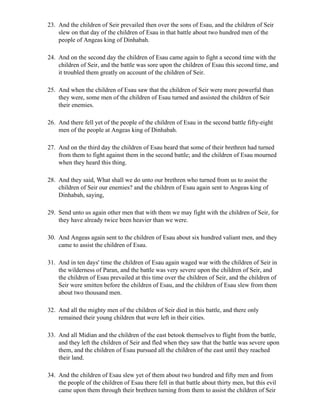
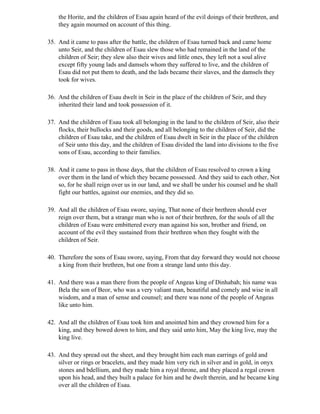
![44. And the people of Angeas took their hire for their battle from the children of Esau, and
they went and returned at that time to their master in Dinhabah.
45. And Bela reigned over the children of Esau thirty years, and the children of Esau dwelt
in the land instead of the children of Seir, and they dwelt securely in their stead unto
this day.
Faithfully translated (1840) from the Original Hebrew into English. A Reprint of Photo
Lithographic Reprint of Exact Edition Published by J.H. Parry & Co., Salt Lake City: 1887]](https://image.slidesharecdn.com/jasher-101002213610-phpapp02/85/Jasher-288-320.jpg)
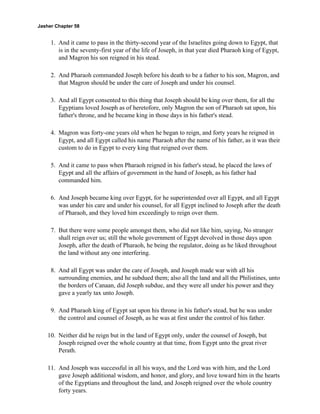
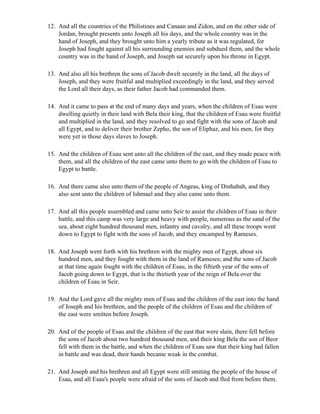
![22. And Joseph and his brethren and all Egypt pursued them a day's journey, and they slew
yet from them about three hundred men, continuing to smite them in the road; and they
afterward turned back from them.
23. And Joseph and all his brethren returned to Egypt, not one man was missing from them,
but of the Egyptians there fell twelve men.
24. And when Joseph returned to Egypt he ordered Zepho and his men to be additionally
bound, and they bound them in irons and they increased their grief.
25. And all the people of the children of Esau, and the children of the east, returned in
shame each unto his city, for all the mighty men that were with them had fallen in battle.
26. And when the children of Esau saw that their king had died in battle they hastened and
took a man from the people of the children of the east; his name was Jobab the son of
Zarach, from the land of Botzrah, and they caused him to reign over them instead of
Bela their king.
27. And Jobab sat upon the throne of Bela as king in his stead, and Jobab reigned in Edom
over all the children of Esau ten years, and the children of Esau went no more to fight
with the sons of Jacob from that day forward, for the sons of Esau knew the valor of the
sons of Jacob, and they were greatly afraid of them.
28. But from that day forward the children of Esau hated the sons of Jacob, and the hatred
and enmity were very strong between them all the days, unto this day.
29. And it came to pass after this, at the end of ten years, Jobab, the son of Zarach, from
Botzrah, died, and the children of Esau took a man whose name was Chusham, from the
land of Teman, and they made him king over them instead of Jobab, and Chusham
reigned in Edom over all the children of Esau for twenty years.
30. And Joseph, king of Egypt, and his brethren, and all the children of Israel dwelt
securely in Egypt in those days, together with all the children of Joseph and his
brethren, having no hindrance or evil accident and the land of Egypt was at that time at
rest from war in the days of Joseph and his brethren.
Faithfully translated (1840) from the Original Hebrew into English. A Reprint of Photo
Lithographic Reprint of Exact Edition Published by J.H. Parry & Co., Salt Lake City: 1887]](https://image.slidesharecdn.com/jasher-101002213610-phpapp02/85/Jasher-291-320.jpg)
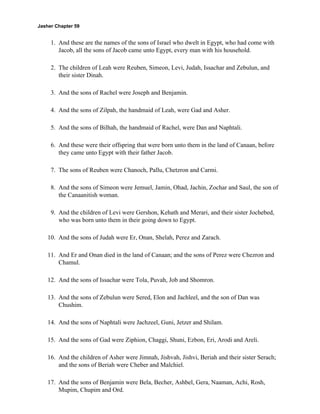
![18. And the sons of Joseph, that were born unto him in Egypt, were Manasseh and Ephraim.
19. And all the souls that went forth from the loins of Jacob, were seventy souls; these are
they who came with Jacob their father unto Egypt to dwell there: and Joseph and all his
brethren dwelt securely in Egypt, and they ate of the best of Egypt all the days of the
life of Joseph.
20. And Joseph lived in the land of Egypt ninety-three years, and Joseph reigned over all
Egypt eighty years.
21. And when the days of Joseph drew nigh that he should die, he sent and called for his
brethren and all his father's household, and they all came together and sat before him.
22. And Joseph said unto his brethren and unto the whole of his father's household, Behold
I die, and God will surely visit you and bring you up from this land to the land which he
swore to your fathers to give unto them.
23. And it shall be when God shall visit you to bring you up from here to the land of your
fathers, then bring up my bones with you from here.
24. And Joseph made the sons of Israel to swear for their seed after them, saying, God will
surely visit you and you shall bring up my bones with you from here.
25. And it came to pass after this that Joseph died in that year, the seventy-first year of the
Israelites going down to Egypt.
26. And Joseph was one hundred and ten years old when he died in the land of Egypt, and
all his brethren and all his servants rose up and they embalmed Joseph, as was their
custom, and his brethren and all Egypt mourned over him for seventy days.
27. And they put Joseph in a coffin filled with spices and all sorts of perfume, and they
buried him by the side of the river, that is Sihor, and his sons and all his brethren, and
the whole of his father's household made a seven day's mourning for him.
28. And it came to pass after the death of Joseph, all the Egyptians began in those days to
rule over the children of Israel, and Pharaoh, king of Egypt, who reigned in his father's
stead, took all the laws of Egypt and conducted the whole government of Egypt under
his counsel, and he reigned securely over his people.
Faithfully translated (1840) from the Original Hebrew into English. A Reprint of Photo
Lithographic Reprint of Exact Edition Published by J.H. Parry & Co., Salt Lake City: 1887]](https://image.slidesharecdn.com/jasher-101002213610-phpapp02/85/Jasher-293-320.jpg)
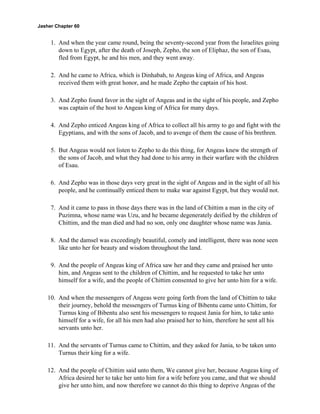
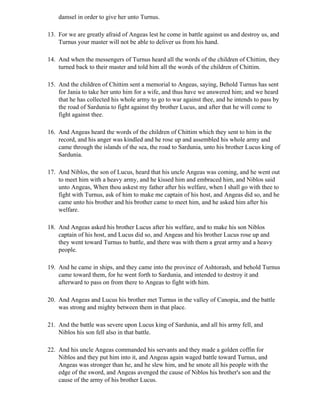
![23. And when Turnus died, the hands of those that survived the battle became weak, and
they fled from before Angeas and Lucus his brother.
24. And Angeas and his brother Lucus pursued them unto the highroad, which is between
Alphanu and Romah, and they slew the whole army of Turnus with the edge of the
sword.
25. And Lucus king of Sardunia commanded his servants that they should make a coffin of
brass, and that they should place therein the body of his son Niblos, and they buried him
in that place.
26. And they built upon it a high tower there upon the highroad, and they called its name
after the name of Niblos unto this day, and they also buried Turnus king of Bibentu
there in that place with Niblos.
27. And behold upon the highroad between Alphanu and Romah the grave of Niblos is on
one side and the grave of Turnus on the other, and a pavement between them unto this
day.
28. And when Niblos was buried, Lucus his father returned with his army to his land
Sardunia, and Angeas his brother king of Africa went with his people unto the city of
Bibentu, that is the city of Turnus.
29. And the inhabitants of Bibentu heard of his fame and they were greatly afraid of him,
and they went forth to meet him with weeping and supplication, and the inhabitants of
Bibentu entreated of Angeas not to slay them nor destroy their city; and he did so, for
Bibentu was in those days reckoned as one of the cities of the children of Chittim;
therefore he did not destroy the city.
30. But from that day forward the troops of the king of Africa would go to Chittim to spoil
and plunder it, and whenever they went, Zepho the captain of the host of Angeas would
go with them.
31. And it was after this that Angeas turned with his army and they came to the city of
Puzimna, and Angeas took thence Jania the daughter of Uzu for a wife and brought her
unto his city unto Africa.
Faithfully translated (1840) from the Original Hebrew into English. A Reprint of Photo
Lithographic Reprint of Exact Edition Published by J.H. Parry & Co., Salt Lake City: 1887]](https://image.slidesharecdn.com/jasher-101002213610-phpapp02/85/Jasher-296-320.jpg)
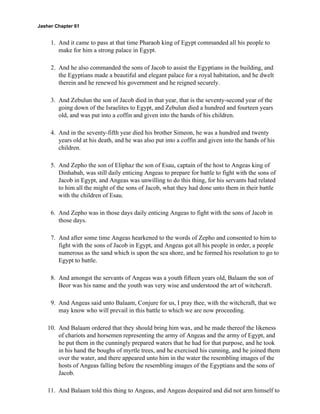
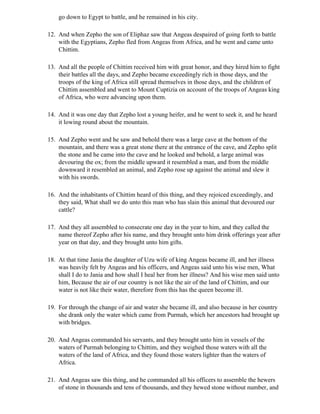
![the builders came and they built an exceedingly strong bridge, and they conveyed the
spring of water from the land of Chittim unto Africa, and those waters were for Jania
the queen and for all her concerns, to drink from and to bake, wash and bathe therewith,
and also to water therewith all seed from which food can be obtained, and all fruit of the
ground.
22. And the king commanded that they should bring of the soil of Chittim in large ships,
and they also brought stones to build therewith, and the builders built palaces for Jania
the queen, and the queen became healed of her illness.
23. And at the revolution of the year the troops of Africa continued coming to the land of
Chittim to plunder as usual, and Zepho son of Eliphaz heard their report, and he gave
orders concerning them and he fought with them, and they fled before him, and he
delivered the land of Chittim from them.
24. And the children of Chittim saw the valor of Zepho, and the children of Chittim
resolved and they made Zepho king over them, and he became king over them, and
whilst he reigned they went to subdue the children of Tubal, and all the surrounding
islands.
25. And their king Zepho went at their head and they made war with Tubal and the islands,
and they subdued them, and when they returned from the battle they renewed his
government for him, and they built for him a very large palace for his royal habitation
and seat, and they made a large throne for him, and Zepho reigned over the whole land
of Chittim and over the land of Italia fifty years.
Faithfully translated (1840) from the Original Hebrew into English. A Reprint of Photo
Lithographic Reprint of Exact Edition Published by J.H. Parry & Co., Salt Lake City: 1887]](https://image.slidesharecdn.com/jasher-101002213610-phpapp02/85/Jasher-299-320.jpg)
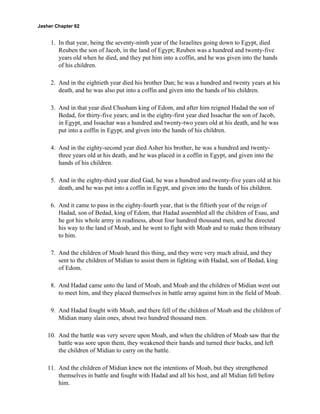
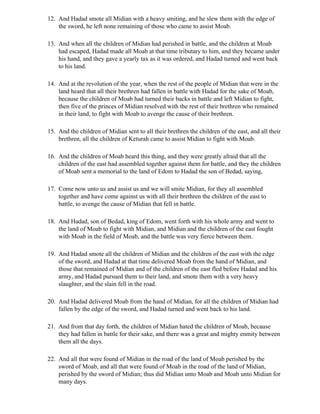
![23. And it came to pass at that time that Judah the son of Jacob died in Egypt, in the eighty-
sixth year of Jacob's going down to Egypt, and Judah was a hundred and twenty-nine
years old at his death, and they embalmed him and put him into a coffin, and he was
given into the hands of his children.
24. And in the eighty-ninth year died Naphtali, he was a hundred and thirty-two years old,
and he was put into a coffin and given into the hands of his children.
25. And it came to pass in the ninety-first year of the Israelites going down to Egypt, that is
in the thirtieth year of the reign of Zepho the son of Eliphaz, the son of Esau, over the
children of Chittim, the children of Africa came upon the children of Chittim to plunder
them as usual, but they had not come upon them for these thirteen years.
26. And they came to them in that year, and Zepho the son of Eliphaz went out to them with
some of his men and smote them desperately, and the troops of Africa fled from before
Zepho and the slain fell before him, and Zepho and his men pursued them, going on and
smiting them until they were near unto Africa.
27. And Angeas king of Africa heard the thing which Zepho had done, and it vexed him
exceedingly, and Angeas was afraid of Zepho all the days.
Faithfully translated (1840) from the Original Hebrew into English. A Reprint of Photo
Lithographic Reprint of Exact Edition Published by J.H. Parry & Co., Salt Lake City: 1887]](https://image.slidesharecdn.com/jasher-101002213610-phpapp02/85/Jasher-302-320.jpg)
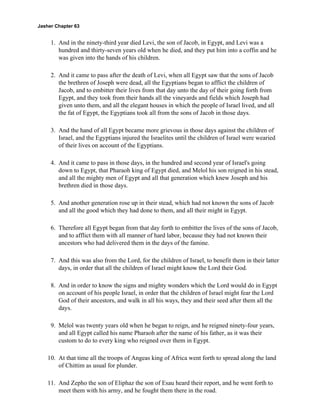
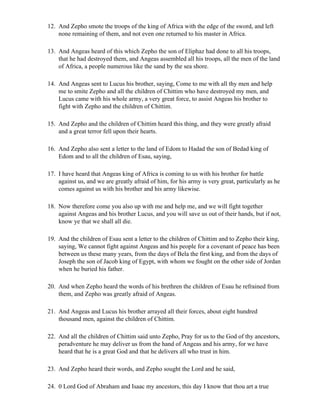
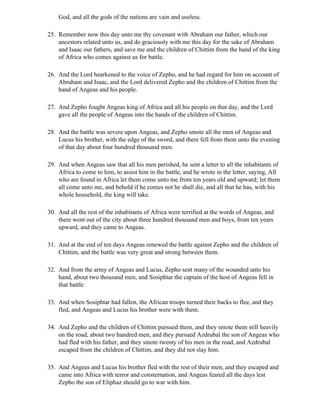
![Faithfully translated (1840) from the Original Hebrew into English. A Reprint of Photo
Lithographic Reprint of Exact Edition Published by J.H. Parry & Co., Salt Lake City: 1887]](https://image.slidesharecdn.com/jasher-101002213610-phpapp02/85/Jasher-306-320.jpg)
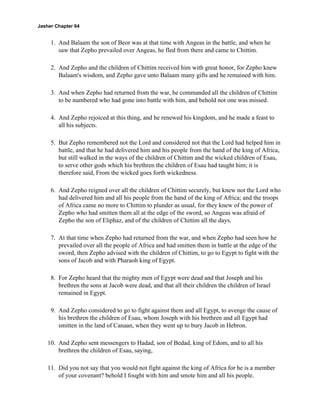
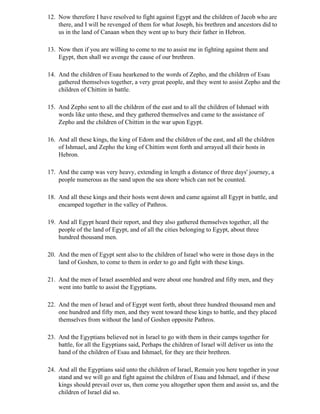
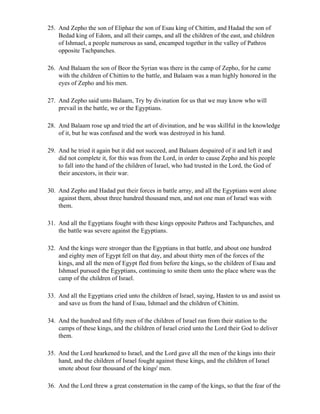
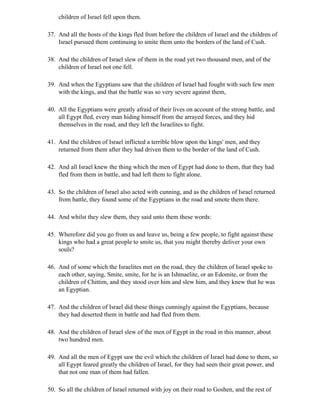
![Egypt returned each man to his place.
Faithfully translated (1840) from the Original Hebrew into English. A Reprint of Photo
Lithographic Reprint of Exact Edition Published by J.H. Parry & Co., Salt Lake City: 1887]](https://image.slidesharecdn.com/jasher-101002213610-phpapp02/85/Jasher-311-320.jpg)
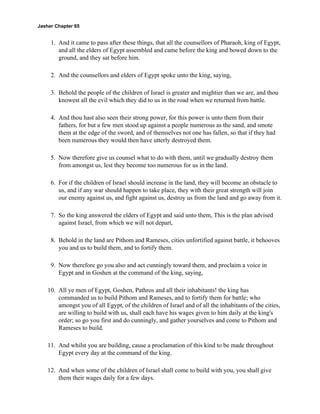
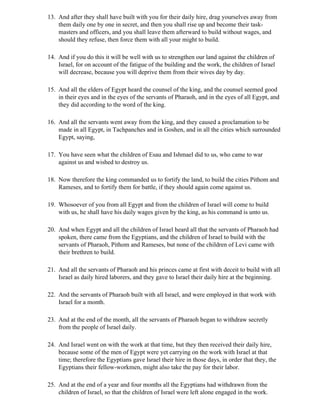
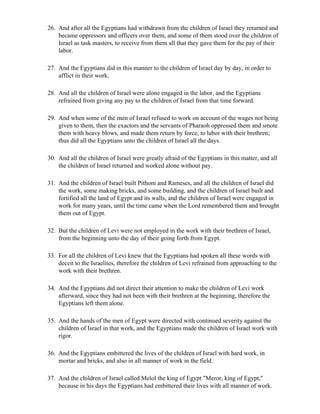
![38. And all the work wherein the Egyptians made the children of Israel labor, they exacted
with rigor, in order to afflict the children of Israel, but the more they afflicted them, the
more they increased and grew, and the Egyptians were grieved because of the children
of Israel.
Faithfully translated (1840) from the Original Hebrew into English. A Reprint of Photo
Lithographic Reprint of Exact Edition Published by J.H. Parry & Co., Salt Lake City: 1887]](https://image.slidesharecdn.com/jasher-101002213610-phpapp02/85/Jasher-315-320.jpg)
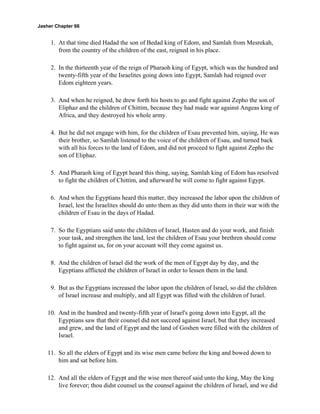
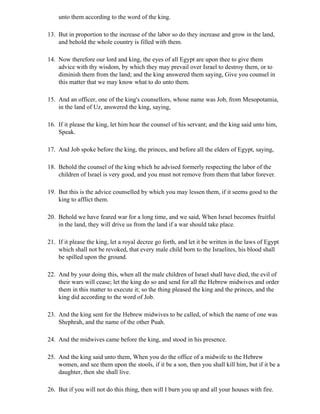
![27. But the midwives feared God and did not hearken to the king of Egypt nor to his words,
and when the Hebrew women brought forth to the midwife son or daughter, then did the
midwife do all that was necessary to the child and let it live; thus did the midwives all
the days.
28. And this thing was told to the king, and he sent and called for the midwives and he said
to them, Why have you done this thing and have saved the children alive?
29. And the midwives answered and spoke together before the king, saying,
30. Let not the king think that the Hebrew women are as the Egyptian women, for all the
children of Israel are hale, and before the midwife comes to them they are delivered,
and as for us thy handmaids, for many days no Hebrew woman has brought forth upon
us, for all the Hebrew women are their own midwives, because they are hale.
31. And Pharaoh heard their words and believed them in this matter, and the midwives went
away from the king, and God dealt well with them, and the people multiplied and waxed
exceedingly.
Faithfully translated (1840) from the Original Hebrew into English. A Reprint of Photo
Lithographic Reprint of Exact Edition Published by J.H. Parry & Co., Salt Lake City: 1887]](https://image.slidesharecdn.com/jasher-101002213610-phpapp02/85/Jasher-318-320.jpg)
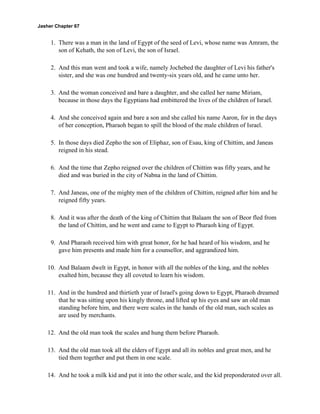
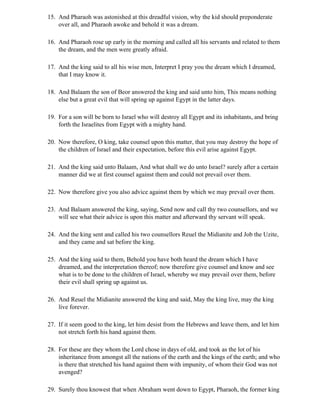
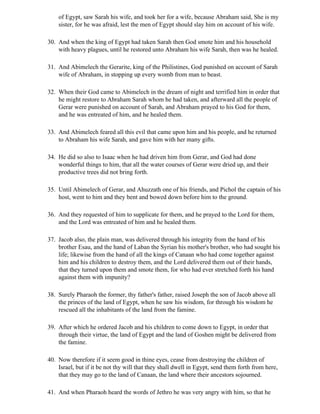
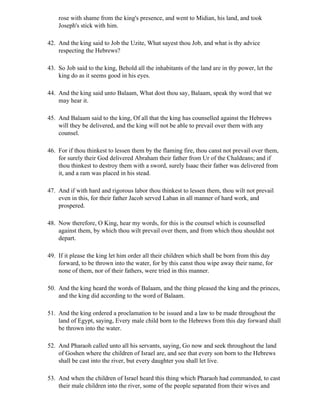
![others adhered to them.
54. And from that day forward, when the time of delivery arrived to those women of Israel
who had remained with their husbands, they went to the field to bring forth there, and
they brought forth in the field, and left their children upon the field and returned home.
55. And the Lord who had sworn to their ancestors to multiply them, sent one of his
ministering angels which are in heaven to wash each child in water, to anoint and
swathe it and to put into its hands two smooth stones from one of which it sucked milk
and from the other honey, and he caused its hair to grow to its knees, by which it might
cover itself; to comfort it and to cleave to it, through his compassion for it.
56. And when God had compassion over them and had desired to multiply them upon the
face of the land, he ordered his earth to receive them to be preserved therein till the time
of their growing up, after which the earth opened its mouth and vomited them forth and
they sprouted forth from the city like the herb of the earth, and the grass of the forest,
and they returned each to his family and to his father's house, and they remained with
them.
57. And the babes of the children of Israel were upon the earth like the herb of the field,
through God's grace to them.
58. And when all the Egyptians saw this thing, they went forth, each to his field with his
yoke of oxen and his ploughshare, and they ploughed it up as one ploughs the earth at
seed time.
59. And when they ploughed they were unable to hurt the infants of the children of Israel,
so the people increased and waxed exceedingly.
60. And Pharaoh ordered his officers daily to go to Goshen to seek for the babes of the
children of Israel.
61. And when they had sought and found one, they took it from its mother's bosom by
force, and threw it into the river, but the female child they left with its mother; thus did
the Egyptians do to the Israelites all the days.
Faithfully translated (1840) from the Original Hebrew into English. A Reprint of Photo
Lithographic Reprint of Exact Edition Published by J.H. Parry & Co., Salt Lake City: 1887]](https://image.slidesharecdn.com/jasher-101002213610-phpapp02/85/Jasher-323-320.jpg)
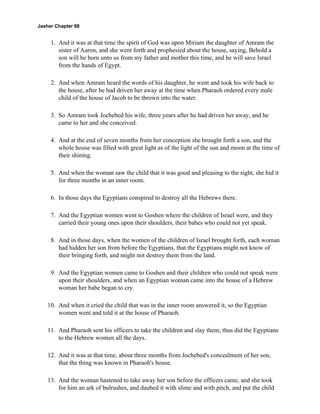
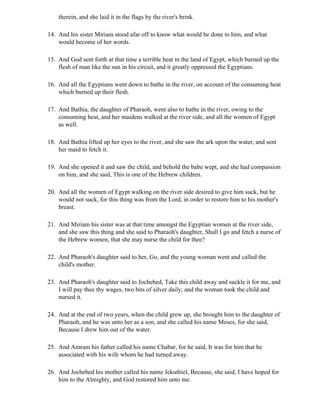
![27. And Miriam his sister called him Jered, for she descended after him to the river to know
what his end would be.
28. And Aaron his brother called his name Abi Zanuch, saying, My father left my mother
and returned to her on his account.
29. And Kehath the father of Amram called his name Abigdor, because on his account did
God repair the breach of the house of Jacob, that they could no longer throw their male
children into the water.
30. And their nurse called him Abi Socho, saying, In his tabernacle was he hidden for three
months, on account of the children of Ham.
31. And all Israel called his name Shemaiah, son of Nethanel, for they said, In his days has
God heard their cries and rescued them from their oppressors.
32. And Moses was in Pharaoh's house, and was unto Bathia, Pharaoh's daughter, as a son,
and Moses grew up amongst the king's children.
Faithfully translated (1840) from the Original Hebrew into English. A Reprint of Photo
Lithographic Reprint of Exact Edition Published by J.H. Parry & Co., Salt Lake City: 1887]](https://image.slidesharecdn.com/jasher-101002213610-phpapp02/85/Jasher-326-320.jpg)
![Jasher Chapter 69
1. And the king of Edom died in those days, in the eighteenth year of his reign, and was
buried in his temple which he had built for himself as his royal residence in the land of
Edom.
2. And the children of Esau sent to Pethor, which is upon the river, and they fetched from
there a young man of beautiful eyes and comely aspect, whose name was Saul, and they
made him king over them in the place of Samlah.
3. And Saul reigned over all the children of Esau in the land of Edom for forty years.
4. And when Pharaoh king of Egypt saw that the counsel which Balaam had advised
respecting the children of Israel did not succeed, but that still they were fruitful,
multiplied and increased throughout the land of Egypt,
5. Then Pharaoh commanded in those days that a proclamation should be issued
throughout Egypt to the children of Israel, saying, No man shall diminish any thing of
his daily labor.
6. And the man who shall be found deficient in his labor which he performs daily, whether
in mortar or in bricks, then his youngest son shall be put in their place.
7. And the labor of Egypt strengthened upon the children of Israel in those days, and
behold if one brick was deficient in any man's daily labor, the Egyptians took his
youngest boy by force from his mother, and put him into the building in the place of the
brick which his father had left wanting.
8. And the men of Egypt did so to all the children of Israel day by day, all the days for a
long period.
9. But the tribe of Levi did not at that time work with the Israelites their brethren, from the
beginning, for the children of Levi knew the cunning of the Egyptians which they
exercised at first toward the Israelites.
Faithfully translated (1840) from the Original Hebrew into English. A Reprint of Photo
Lithographic Reprint of Exact Edition Published by J.H. Parry & Co., Salt Lake City: 1887]](https://image.slidesharecdn.com/jasher-101002213610-phpapp02/85/Jasher-327-320.jpg)
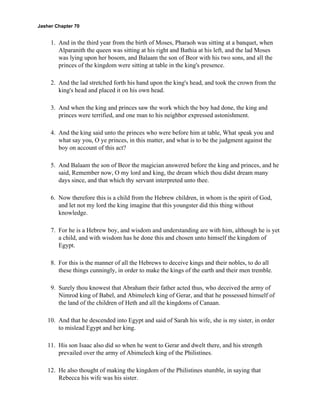
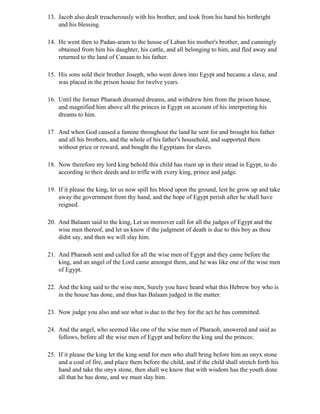
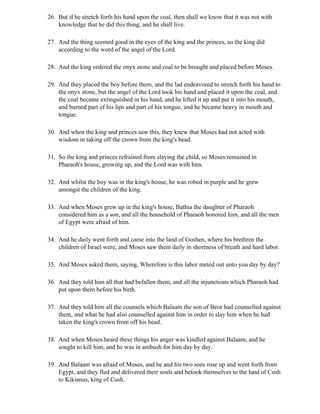
![40. And Moses was in the king's house going out and coming in, the Lord gave him favor in
the eyes of Pharaoh, and in the eyes of all his servants, and in the eyes of all the people
of Egypt, and they loved Moses exceedingly.
41. And the day arrived when Moses went to Goshen to see his brethren, that he saw the
children of Israel in their burdens and hard labor, and Moses was grieved on their
account.
42. And Moses returned to Egypt and came to the house of Pharaoh, and came before the
king, and Moses bowed down before the king.
43. And Moses said unto Pharaoh, I pray thee my lord, I have come to seek a small request
from thee, turn not away my face empty; and Pharaoh said unto him, Speak.
44. And Moses said unto Pharaoh, Let there be given unto thy servants the children of Israel
who are in Goshen, one day to rest therein from their labor.
45. And the king answered Moses and said, Behold I have lifted up thy face in this thing to
grant thy request.
46. And Pharaoh ordered a proclamation to be issued throughout Egypt and Goshen, saying,
47. To you, all the children of Israel, thus says the king, for six days you shall do your work
and labor, but on the seventh day you shall rest, and shall not preform any work, thus
shall you do all the days, as the king and Moses the son of Bathia have commanded.
48. And Moses rejoiced at this thing which the king had granted to him, and all the children
of Israel did as Moses ordered them.
49. For this thing was from the Lord to the children of Israel, for the Lord had begun to
remember the children of Israel to save them for the sake of their fathers.
50. And the Lord was with Moses and his fame went throughout Egypt.
51. And Moses became great in the eyes of all the Egyptians, and in the eyes of all the
children of Israel, seeking good for his people Israel and speaking words of peace
regarding them to the king.
Faithfully translated (1840) from the Original Hebrew into English. A Reprint of Photo
Lithographic Reprint of Exact Edition Published by J.H. Parry & Co., Salt Lake City: 1887]](https://image.slidesharecdn.com/jasher-101002213610-phpapp02/85/Jasher-331-320.jpg)
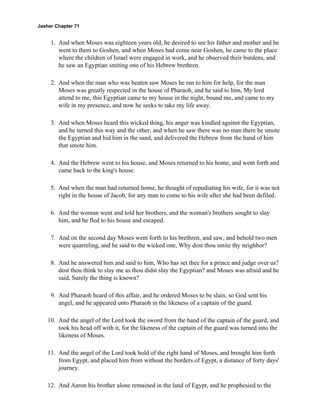
![children of Israel, saying,
13. Thus says the Lord God of your ancestors, Throw away, each man, the abominations of
his eyes, and do not defile yourselves with the idols of Egypt.
14. And the children of Israel rebelled and would not hearken to Aaron at that time.
15. And the Lord thought to destroy them, were it not that the Lord remembered the
covenant which he had made with Abraham, Isaac and Jacob.
16. In those days the hand of Pharaoh continued to be severe against the children of Israel,
and he crushed and oppressed them until the time when God sent forth his word and
took notice of them.
Faithfully translated (1840) from the Original Hebrew into English. A Reprint of Photo
Lithographic Reprint of Exact Edition Published by J.H. Parry & Co., Salt Lake City: 1887]](https://image.slidesharecdn.com/jasher-101002213610-phpapp02/85/Jasher-333-320.jpg)
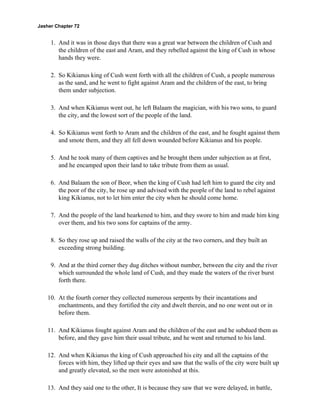
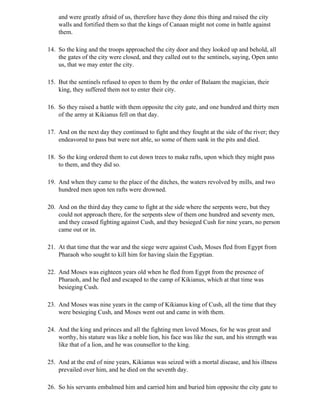
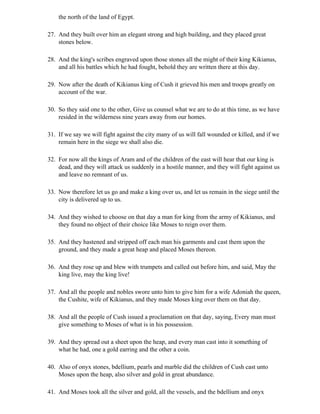
![stones, which all the children of Cush had given to him, and he placed them amongst his
treasures.
42. And Moses reigned over the children of Cush on that day, in the place of Kikianus king
of Cush.
Faithfully translated (1840) from the Original Hebrew into English. A Reprint of Photo
Lithographic Reprint of Exact Edition Published by J.H. Parry & Co., Salt Lake City: 1887]](https://image.slidesharecdn.com/jasher-101002213610-phpapp02/85/Jasher-337-320.jpg)
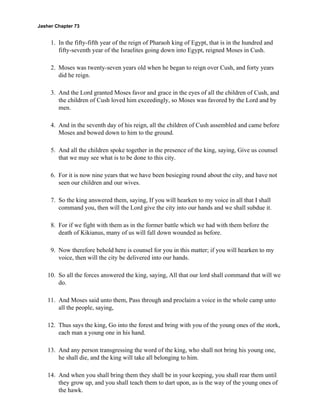
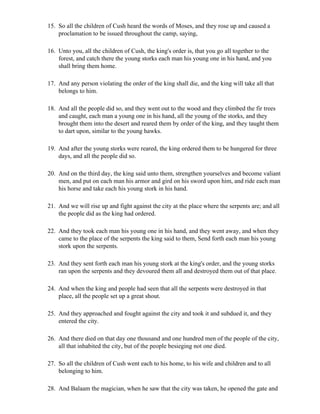
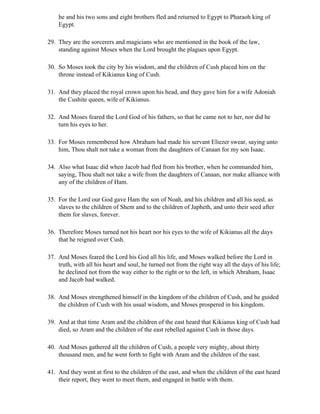
![42. And the war was severe against the children of the east, so the Lord gave all the
children of the east into the hand of Moses, and about three hundred men fell down slain.
43. And all the children of the east turned back and retreated, so Moses and the children of
Cush followed them and subdued them, and put a tax upon them, as was their custom.
44. So Moses and all the people with him passed from there to the land of Aram for battle.
45. And the people of Aram also went to meet them, and they fought against them, and the
Lord delivered them into the hand of Moses, and many of the men of Aram fell down
wounded.
46. And Aram also were subdued by Moses and the people of Cush, and also gave their
usual tax.
47. And Moses brought Aram and the children of the east under subjection to the children
of Cush, and Moses and all the people who were with him, turned to the land of Cush.
48. And Moses strengthened himself in the kingdom of the children of Cush, and the Lord
was with him, and all the children of Cush were afraid of him.
Faithfully translated (1840) from the Original Hebrew into English. A Reprint of Photo
Lithographic Reprint of Exact Edition Published by J.H. Parry & Co., Salt Lake City: 1887]](https://image.slidesharecdn.com/jasher-101002213610-phpapp02/85/Jasher-341-320.jpg)
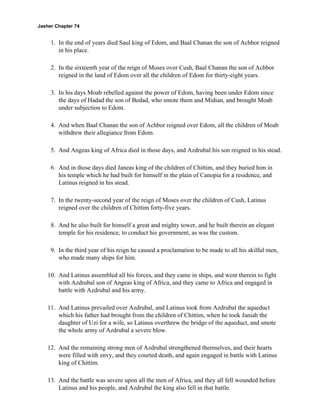
![14. And the king Azdrubal had a very beautiful daughter, whose name was Ushpezena, and
all the men of Africa embroidered her likeness on their garments, on account of her
great beauty and comely appearance.
15. And the men of Latinus saw Ushpezena, the daughter of Azdrubal, and praised her unto
Latinus their king.
16. And Latinus ordered her to be brought to him, and Latinus took Ushpezena for a wife,
and he turned back on his way to Chittim.
17. And it was after the death of Azdrubal son of Angeas, when Latinus had turned back to
his land from the battle, that all the inhabitants of Africa rose up and took Anibal the
son of Angeas, the younger brother of Azdrubal, and made him king instead at his
brother over the whole land at Africa.
18. And when he reigned, he resolved to go to Chittim to fight with the children of Chittim,
to avenge the cause of Azdrubal his brother, and the cause of the inhabitants of Africa,
and he did so.
19. And he made many ships, and he came therein with his whole army, and he went to
Chittim.
20. So Anibal fought with the children of Chittim, and the children of Chittim fell wounded
before Anibal and his army, and Anibal avenged his brother's cause.
21. And Anibal continued the war for eighteen years with the children of Chittim, and
Anibal dwelt in the land of Chittim and encamped there for a long time.
22. And Anibal smote the children of Chittim very severely, and he slew their great men
and princes, and of the rest of the people he smote about eighty thousand men.
23. And at the end of days and years, Anibal returned to his land of Africa, and he reigned
securely in the place of Azdrubal his brother.
Faithfully translated (1840) from the Original Hebrew into English. A Reprint of Photo
Lithographic Reprint of Exact Edition Published by J.H. Parry & Co., Salt Lake City: 1887]](https://image.slidesharecdn.com/jasher-101002213610-phpapp02/85/Jasher-343-320.jpg)
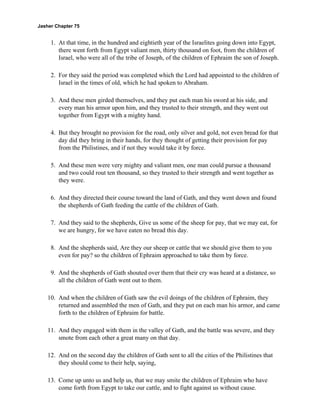
![14. Now the souls of the children of Ephraim were exhausted with hunger and thirst, for
they had eaten no bread for three days. And forty thousand men went forth from the
cities of the Philistines to the assistance of the men of Gath.
15. And these men were engaged in battle with the children of Ephraim, and the Lord
delivered the children of Ephraim into the hands of the Philistines.
16. And they smote all the children of Ephraim, all who had gone forth from Egypt, none
were remaining but ten men who had run away from the engagement.
17. For this evil was from the Lord against the children of Ephraim, for they transgressed
the word of the Lord in going forth from Egypt, before the period had arrived which the
Lord in the days of old had appointed to Israel.
18. And of the Philistines also there fell a great many, about twenty thousand men, and their
brethren carried them and buried them in their cities.
19. And the slain of the children of Ephraim remained forsaken in the valley of Gath for
many days and years, and were not brought to burial, and the valley was filled with
men's bones.
20. And the men who had escaped from the battle came to Egypt, and told all the children
of Israel all that had befallen them.
21. And their father Ephraim mourned over them for many days, and his brethren came to
console him.
22. And he came unto his wife and she bare a son, and he called his name Beriah, for she
was unfortunate in his house.
Faithfully translated (1840) from the Original Hebrew into English. A Reprint of Photo
Lithographic Reprint of Exact Edition Published by J.H. Parry & Co., Salt Lake City: 1887]](https://image.slidesharecdn.com/jasher-101002213610-phpapp02/85/Jasher-345-320.jpg)
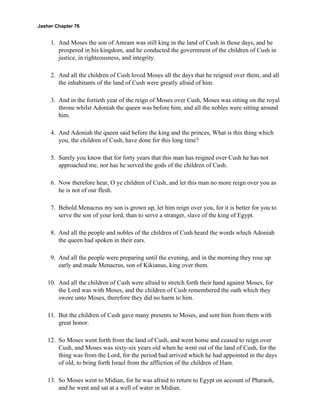
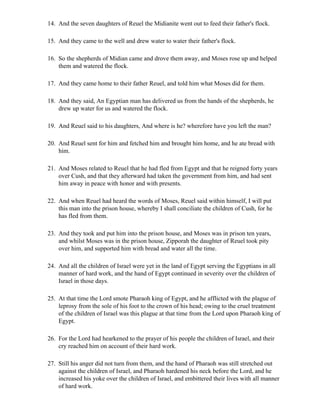
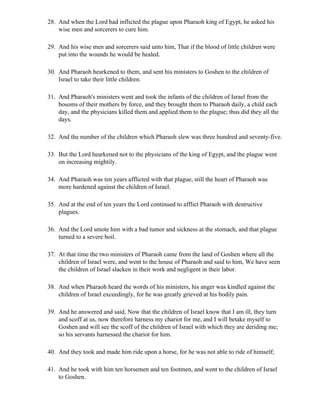
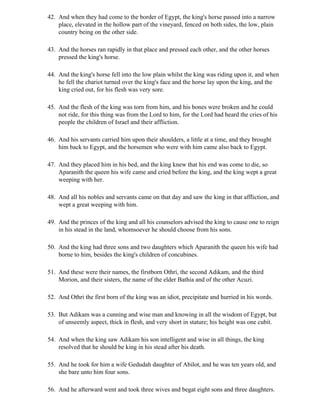
![57. And the disorder greatly prevailed over the king, and his flesh stank like the flesh of a
carcass cast upon the field in summer time, during the heat of the sun.
58. And when the king saw that his sickness had greatly strengthened itself over him, he
ordered his son Adikam to be brought to him, and they made him king over the land in
his place.
59. And at the end of three years, the king died, in shame, disgrace, and disgust, and his
servants carried him and buried him in the sepulcher of the kings of Egypt in Zoan
Mizraim.
60. But they embalmed him not as was usual with kings, for his flesh was putrid, and they
could not approach to embalm him on account of the stench, so they buried him in haste.
61. For this evil was from the Lord to him, for the Lord had requited him evil for the evil
which in his days he had done to Israel.
62. And he died with terror and with shame, and his son Adikam reigned in his place.<
Faithfully translated (1840) from the Original Hebrew into English. A Reprint of Photo
Lithographic Reprint of Exact Edition Published by J.H. Parry & Co., Salt Lake City: 1887]](https://image.slidesharecdn.com/jasher-101002213610-phpapp02/85/Jasher-350-320.jpg)
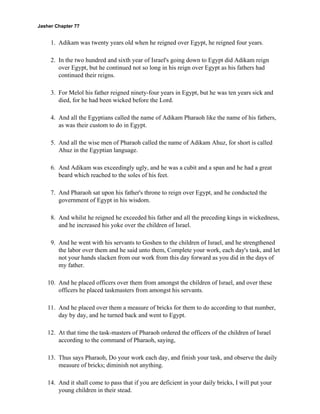
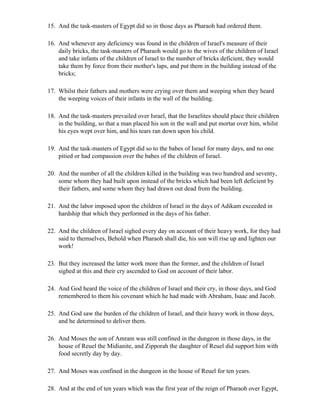
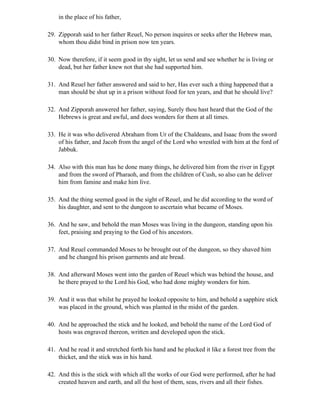
![43. And when God had driven Adam from the garden of Eden, he took the stick in his hand
and went and tilled the ground from which he was taken.
44. And the stick came down to Noah and was given to Shem and his descendants, until it
came into the hand of Abraham the Hebrew.
45. And when Abraham had given all he had to his son Isaac, he also gave to him this stick.
46. And when Jacob had fled to Padan-aram, he took it into his hand, and when he returned
to his father he had not left it behind him.
47. Also when he went down to Egypt he took it into his hand and gave it to Joseph, one
portion above his brethren, for Jacob had taken it by force from his brother Esau.
48. And after the death of Joseph, the nobles of Egypt came into the house of Joseph, and
the stick came into the hand of Reuel the Midianite, and when he went out of Egypt, he
took it in his hand and planted it in his garden.
49. And all the mighty men of the Kinites tried to pluck it when they endeavored to get
Zipporah his daughter, but they were unsuccessful.
50. So that stick remained planted in the garden of Reuel, until he came who had a right to
it and took it.
51. And when Reuel saw the stick in the hand of Moses, he wondered at it, and he gave him
his daughter Zipporah for a wife.
Faithfully translated (1840) from the Original Hebrew into English. A Reprint of Photo
Lithographic Reprint of Exact Edition Published by J.H. Parry & Co., Salt Lake City: 1887]](https://image.slidesharecdn.com/jasher-101002213610-phpapp02/85/Jasher-354-320.jpg)
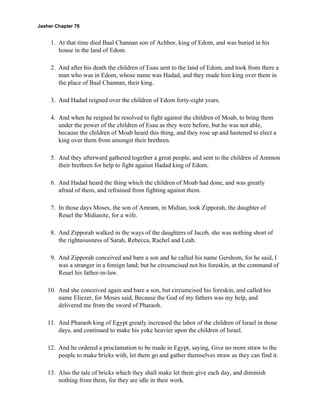
![14. And the children of Israel heard this, and they mourned and sighed, and they cried unto
the Lord on account of the bitterness of their souls.
15. And the Lord heard the cries of the children of Israel, and saw the oppression with
which the Egyptians oppressed them.
16. And the Lord was jealous of his people and his inheritance, and heard their voice, and
he resolved to take them out of the affliction of Egypt, to give them the land of Canaan
for a possession.
Faithfully translated (1840) from the Original Hebrew into English. A Reprint of Photo
Lithographic Reprint of Exact Edition Published by J.H. Parry & Co., Salt Lake City: 1887]](https://image.slidesharecdn.com/jasher-101002213610-phpapp02/85/Jasher-356-320.jpg)
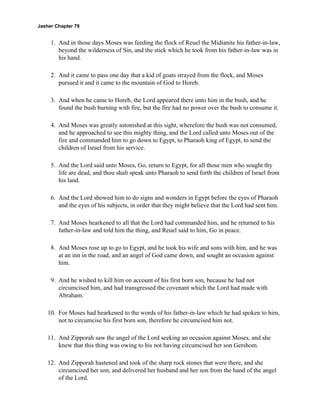
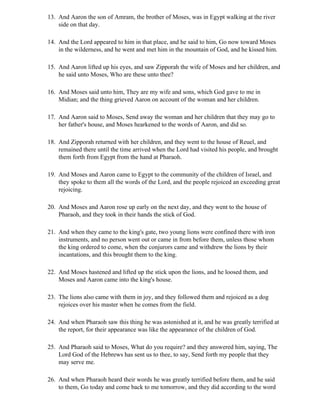
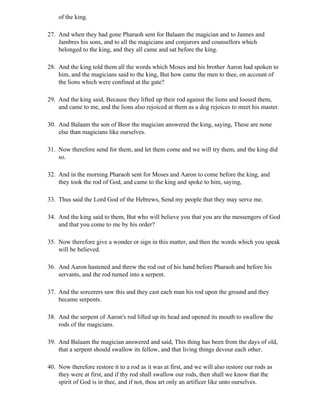
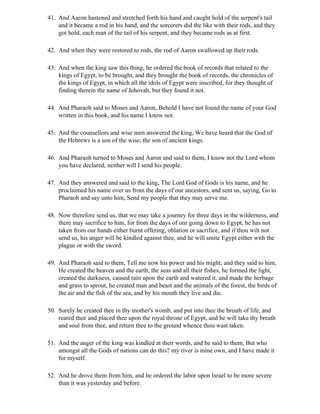
![53. And Moses and Aaron went out from the king's presence, and they saw the children of
Israel in an evil condition for the task-masters had made their labor exceedingly heavy.
54. And Moses returned to the Lord and said, Why hast thou ill treated thy people? for since
I came to speak to Pharaoh what thou didst send me for, he has exceedingly ill used the
children of Israel.
55. And the Lord said to Moses, Behold thou wilt see that with an outstretched hand and
heavy plagues, Pharaoh will send the children of Israel from his land.
56. And Moses and Aaron dwelt amongst their brethren the children of Israel in Egypt.
57. And as for the children of Israel the Egyptians embittered their lives, with the heavy
work which they imposed upon them.
Faithfully translated (1840) from the Original Hebrew into English. A Reprint of Photo
Lithographic Reprint of Exact Edition Published by J.H. Parry & Co., Salt Lake City: 1887]](https://image.slidesharecdn.com/jasher-101002213610-phpapp02/85/Jasher-361-320.jpg)
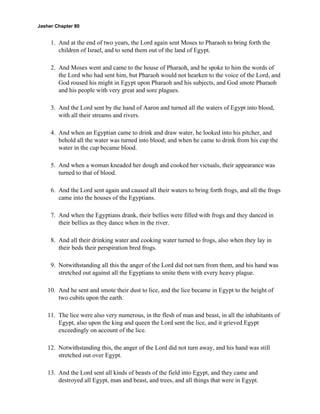
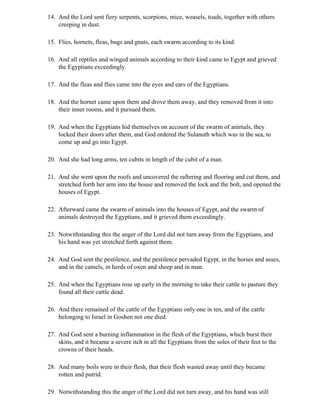
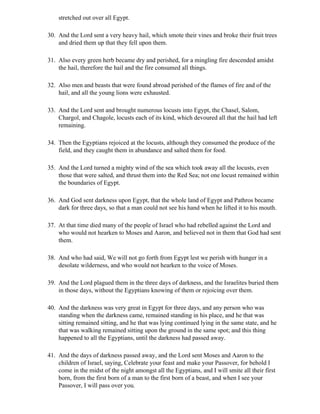
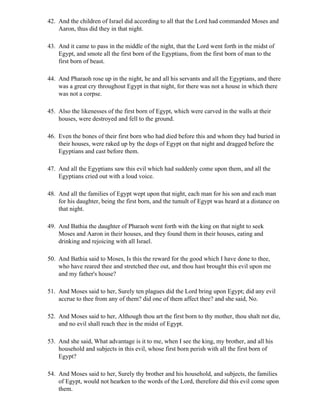
![55. And Pharaoh king of Egypt approached Moses and Aaron, and some of the children of
Israel who were with them in that place, and he prayed to them, saying,
56. Rise up and take your brethren, all the children of Israel who are in the land, with their
sheep and oxen, and all belonging to them, they shall leave nothing remaining, only
pray for me to the Lord your God.
57. And Moses said to Pharaoh, Behold though thou art thy mother's first born, yet fear not,
for thou wilt not die, for the Lord has commanded that thou shalt live, in order to show
thee his great might and strong stretched out arm.
58. And Pharaoh ordered the children of Israel to be sent away, and all the Egyptians
strengthened themselves to send them, for they said, We are all perishing.
59. And all the Egyptians sent the Israelites forth, with great riches, sheep and oxen and
precious things, according to the oath of the Lord between him and our Father Abraham.
60. And the children of Israel delayed going forth at night, and when the Egyptians came to
them to bring them out, they said to them, Are we thieves, that we should go forth at
night?
61. And the children of Israel asked of the Egyptians, vessels of silver, and vessels of gold,
and garments, and the children of Israel stripped the Egyptians.
62. And Moses hastened and rose up and went to the river of Egypt, and brought up from
thence the coffin of Joseph and took it with him.
63. The children of Israel also brought up, each man his father's coffin with him, and each
man the coffins of his tribe.
Faithfully translated (1840) from the Original Hebrew into English. A Reprint of Photo
Lithographic Reprint of Exact Edition Published by J.H. Parry & Co., Salt Lake City: 1887]](https://image.slidesharecdn.com/jasher-101002213610-phpapp02/85/Jasher-366-320.jpg)
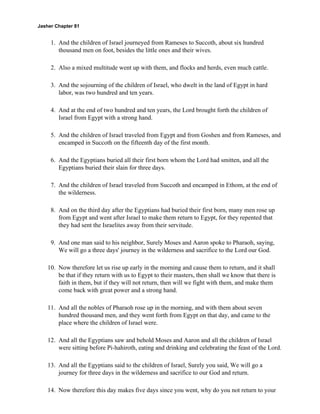
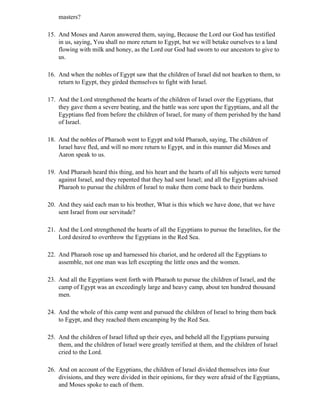
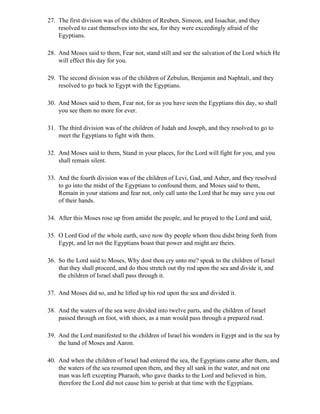
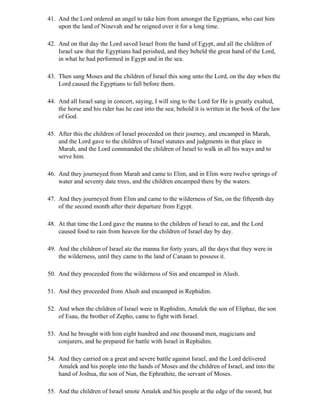
![the battle was very sore upon the children of Israel.
56. And the Lord said to Moses, Write this thing as a memorial for thee in a book, and place
it in the hand of Joshua, the son of Nun, thy servant, and thou shalt command the
children of Israel, saying, When thou shalt come to the land of Canaan, thou shalt
utterly efface the remembrance of Amalek from under heaven.
57. And Moses did so, and he took the book and wrote upon it these words, saying,
58. Remember what Amalek has done to thee in the road when thou wentest forth from
Egypt.
59. Who met thee in the road and smote thy rear, even those that were feeble behind thee
when thou wast faint and weary.
60. Therefore it shall be when the Lord thy God shall have given thee rest from all thine
enemies round about in the land which the Lord thy God giveth thee for an inheritance,
to possess it, that thou shalt blot out the remembrance of Amalek from under heaven,
thou shalt not forget it.
61. And the king who shall have pity on Amalek, or upon his memory or upon his seed,
behold I will require it of him, and I will cut him off from amongst his people.
62. And Moses wrote all these things in a book, and he enjoined the children of Israel
respecting all these matters.
Faithfully translated (1840) from the Original Hebrew into English. A Reprint of Photo
Lithographic Reprint of Exact Edition Published by J.H. Parry & Co., Salt Lake City: 1887]](https://image.slidesharecdn.com/jasher-101002213610-phpapp02/85/Jasher-371-320.jpg)
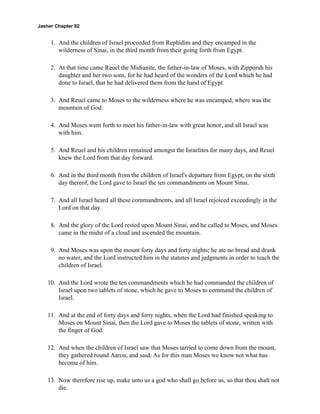
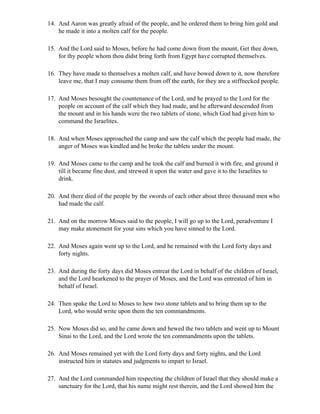
![likeness of the sanctuary and the likeness of all its vessels.
28. And at the end of the forty days, Moses came down from the mount and the two tablets
were in his hand.
29. And Moses came to the children of Israel and spoke to them all the words of the Lord,
and he taught them laws, statutes and judgments which the Lord had taught him.
30. And Moses told the children of Israel the word of the Lord, that a sanctuary should be
made for him, to dwell amongst the children of Israel.
31. And the people rejoiced greatly at all the good which the Lord had spoken to them,
through Moses, and they said, We will do all that the Lord has spoken to thee.
32. And the people rose up like one man and they made generous offerings to the sanctuary
of the Lord, and each man brought the offering of the Lord for the work of the
sanctuary, and for all its service.
33. And all the children of Israel brought each man of all that was found in his possession
for the work of the sanctuary of the Lord, gold, silver and brass, and every thing that
was serviceable for the sanctuary.
34. And all the wise men who were practiced in work came and made the sanctuary of the
Lord, according to all that the Lord had commanded, every man in the work in which he
had been practiced; and all the wise men in heart made the sanctuary, and its furniture
and all the vessels for the holy service, as the Lord had commanded Moses.
35. And the work of the sanctuary of the tabernacle was completed at the end of five
months, and the children of Israel did all that the Lord had commanded Moses.
36. And they brought the sanctuary and all its furniture to Moses; like unto the
representation which the Lord had shown to Moses, so did the children of Israel.
37. And Moses saw the work, and behold they did it as the Lord had commanded him, so
Moses blessed them.
Faithfully translated (1840) from the Original Hebrew into English. A Reprint of Photo
Lithographic Reprint of Exact Edition Published by J.H. Parry & Co., Salt Lake City: 1887]](https://image.slidesharecdn.com/jasher-101002213610-phpapp02/85/Jasher-374-320.jpg)
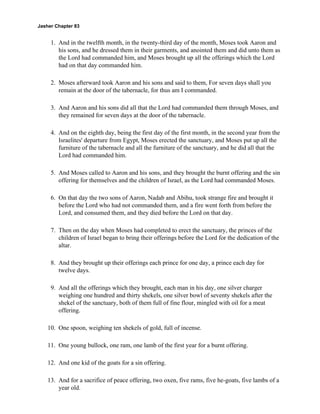
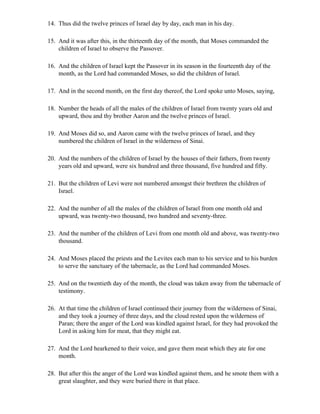
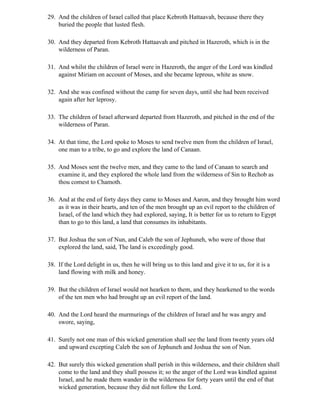
![43. And the people dwelt in the wilderness of Paran a long time, and they afterward
proceeded to the wilderness by the way of the Red Sea.
Faithfully translated (1840) from the Original Hebrew into English. A Reprint of Photo
Lithographic Reprint of Exact Edition Published by J.H. Parry & Co., Salt Lake City: 1887]](https://image.slidesharecdn.com/jasher-101002213610-phpapp02/85/Jasher-378-320.jpg)
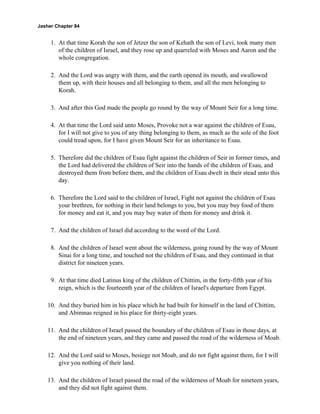
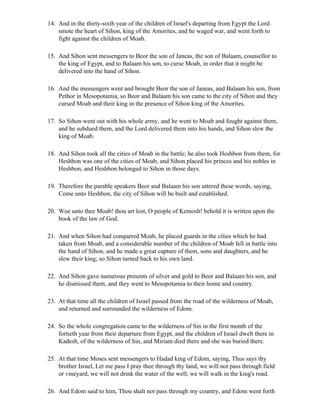
![to meet the children of Israel with a mighty people.
27. And the children of Esau refused to let the children of Israel pass through their land, so
the Israelites removed from them and fought not against them.
28. For before this the Lord had commanded the children of Israel, saying, You shall not
fight against the children of Esau, therefore the Israelites removed from them and did
not fight against them.
29. So the children of Israel departed from Kadesh, and all the people came to Mount Hor.
30. At that time the Lord said to Moses, Tell thy brother Aaron that he shall die there, for he
shall not come to the land which I have given to the children of Israel.
31. And Aaron went up, at the command of the Lord, to Mount Hor, in the fortieth year, in
the fifth month, in the first day of the month.
32. And Aaron was one hundred and twenty-three years old when he died in Mount Hor
Faithfully translated (1840) from the Original Hebrew into English. A Reprint of Photo
Lithographic Reprint of Exact Edition Published by J.H. Parry & Co., Salt Lake City: 1887]](https://image.slidesharecdn.com/jasher-101002213610-phpapp02/85/Jasher-381-320.jpg)
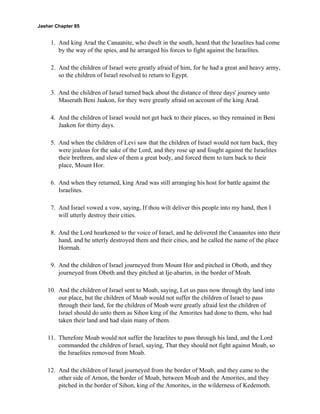
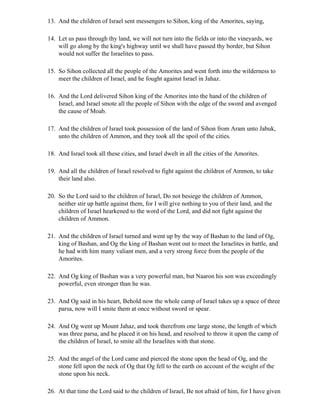
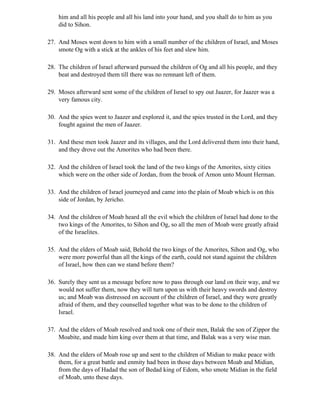
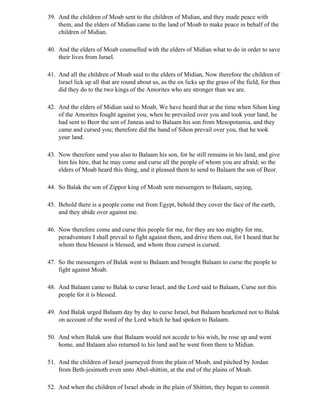
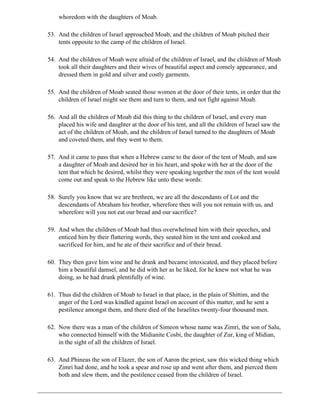
![Faithfully translated (1840) from the Original Hebrew into English. A Reprint of Photo
Lithographic Reprint of Exact Edition Published by J.H. Parry & Co., Salt Lake City: 1887]](https://image.slidesharecdn.com/jasher-101002213610-phpapp02/85/Jasher-387-320.jpg)
![Jasher Chapter 86
1. At that time after the pestilence, the Lord said to Moses, and to Elazer the son of Aaron
the priest, saying,
2. Number the heads of the whole community of the children of Israel, from twenty years
old and upward, all that went forth in the army.
3. And Moses and Elazer numbered the children of Israel after their families, and the
number of all Israel was seven hundred thousand, seven hundred and thirty.
4. And the number of the children of Levi, from one month old and upward, was twenty-
three thousand, and amongst these there was not a man of those numbered by Moses
and Aaron in the wilderness of Sinai.
5. For the Lord had told them that they would die in the wilderness, so they all died, and
not one had been left of them excepting Caleb the son of Jephuneh, and Joshua the son
of Nun.
6. And it was after this that the Lord said to Moses, Say unto the children of Israel to
avenge upon Midian the cause of their brethren the children of Israel.
7. And Moses did so, and the children of Israel chose from amongst them twelve thousand
men, being one thousand to a tribe, and they went to Midian.
8. And the children of Israel warred against Midian, and they slew every male, also the
five princes of Midian, and Balaam the son of Beor did they slay with the sword.
9. And the children of Israel took the wives of Midian captive, with their little ones and
their cattle, and all belonging to them.
10. And they took all the spoil and all the prey, and they brought it to Moses and to Elazer
to the plains of Moab.
11. And Moses and Elazer and all the princes of the congregation went forth to meet them
with joy.
12. And they divided all the spoil of Midian, and the children of Israel had been revenged
upon Midian for the cause of their brethren the children of Israel.
Faithfully translated (1840) from the Original Hebrew into English. A Reprint of Photo
Lithographic Reprint of Exact Edition Published by J.H. Parry & Co., Salt Lake City: 1887]](https://image.slidesharecdn.com/jasher-101002213610-phpapp02/85/Jasher-388-320.jpg)
![Jasher Chapter 87
1. At that time the Lord said to Moses, Behold thy days are approaching to an end, take
now Joshua the son of Nun thy servant and place him in the tabernacle, and I will
command him, and Moses did so.
2. And the Lord appeared in the tabernacle in a pillar of cloud, and the pillar of cloud
stood at the entrance of the tabernacle.
3. And the Lord commanded Joshua the son of Nun and said unto him, Be strong and
courageous, for thou shalt bring the children of Israel to the land which I swore to give
them, and I will be with thee.
4. And Moses said to Joshua, Be strong and courageous, for thou wilt make the children of
Israel inherit the land, and the Lord will be with thee, he will not leave thee nor forsake
thee, be not afraid nor disheartened.
5. And Moses called to all the children of Israel and said to them, You have seen all the
good which the Lord your God has done for you in the wilderness.
6. Now therefore observe all the words of this law, and walk in the way of the Lord your
God, turn not from the way which the Lord has commanded you, either to the right or to
the left.
7. And Moses taught the children of Israel statutes and judgments and laws to do in the
land as the Lord had commanded him.
8. And he taught them the way of the Lord and his laws; behold they are written upon the
book of the law of God which he gave to the children of Israel by the hand of Moses.
9. And Moses finished commanding the children of Israel, and the Lord said to him,
saying, Go up to the Mount Abarim and die there, and be gathered unto thy people as
Aaron thy brother was gathered.
10. And Moses went up as the Lord had commanded him, and he died there in the land of
Moab by the order of the Lord, in the fortieth year from the Israelites going forth from
the land of Egypt.
11. And the children of Israel wept for Moses in the plains of Moab for thirty days, and the
days of weeping and mourning for Moses were completed.
Faithfully translated (1840) from the Original Hebrew into English. A Reprint of Photo
Lithographic Reprint of Exact Edition Published by J.H. Parry & Co., Salt Lake City: 1887]](https://image.slidesharecdn.com/jasher-101002213610-phpapp02/85/Jasher-389-320.jpg)
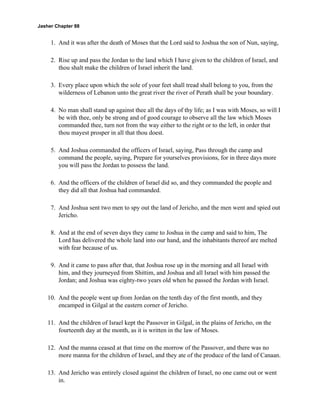
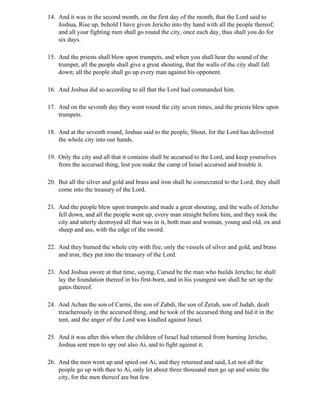
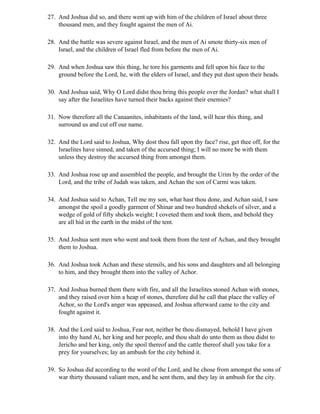
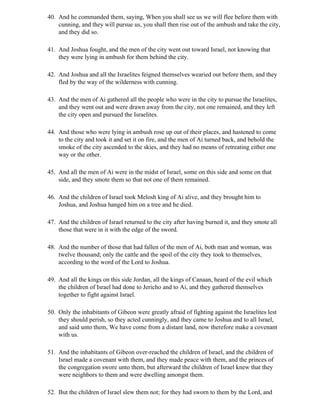
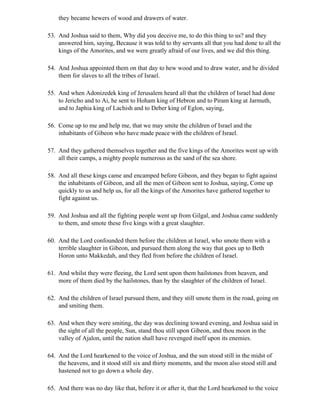
![of a man, for the Lord fought for Israel.
Faithfully translated (1840) from the Original Hebrew into English. A Reprint of Photo
Lithographic Reprint of Exact Edition Published by J.H. Parry & Co., Salt Lake City: 1887]](https://image.slidesharecdn.com/jasher-101002213610-phpapp02/85/Jasher-395-320.jpg)
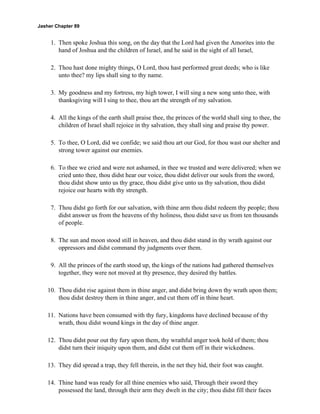
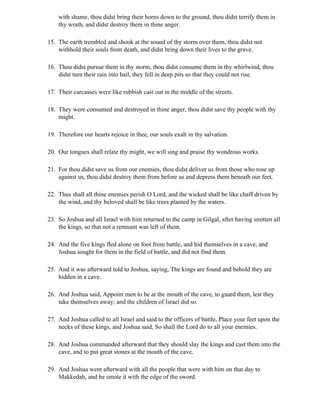
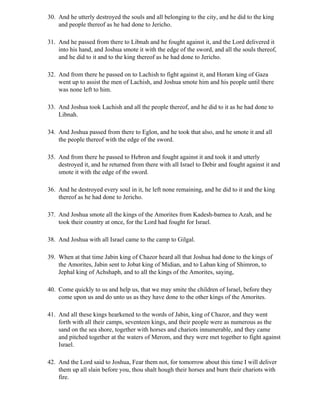
![43. And Joshua with all the men of war came suddenly upon them and smote them, and
they fell into their hands, for the Lord had delivered them into the hands of the children
of Israel.
44. So the children of Israel pursued all these kings with their camps, and smote them until
there was none left of them, and Joshua did to them as the Lord had spoken to him.
45. And Joshua returned at that time to Chazor and smote it with the sword and destroyed
every soul in it and burned it with fire, and from Chazor, Joshua passed to Shimron and
smote it and utterly destroyed it.
46. From there he passed to Achshaph and he did to it as he had done to Shimron.
47. From there he passed to Adulam and he smote all the people in it, and he did to Adulam
as he had done to Achshaph and to Shimron.
48. And he passed from them to all the cities of the kings which he had smitten, and he
smote all the people that were left of them and he utterly destroyed them.
49. Only their booty and cattle the Israelites took to themselves as a prey, but every human
being they smote, they suffered not a soul to live.
50. As the Lord had commanded Moses so did Joshua and all Israel, they failed not in
anything.
51. So Joshua and all the children of Israel smote the whole land of Canaan as the Lord had
commanded them, and smote all their kings, being thirty and one kings, and the children
of Israel took their whole country.
52. Besides the kingdoms of Sihon and Og which are on the other side Jordan, of which
Moses had smitten many cities, and Moses gave them to the Reubenites and the Gadites
and to half the tribe of Manasseh.
53. And Joshua smote all the kings that were on this side Jordan to the west, and gave them
for an inheritance to the nine tribes and to the half tribe of Israel.
54. For five years did Joshua carry on the war with these kings, and he gave their cities to
the Israelites, and the land became tranquil from battle throughout the cities of the
Amorites and the Canaanites.
Faithfully translated (1840) from the Original Hebrew into English. A Reprint of Photo
Lithographic Reprint of Exact Edition Published by J.H. Parry & Co., Salt Lake City: 1887]](https://image.slidesharecdn.com/jasher-101002213610-phpapp02/85/Jasher-399-320.jpg)
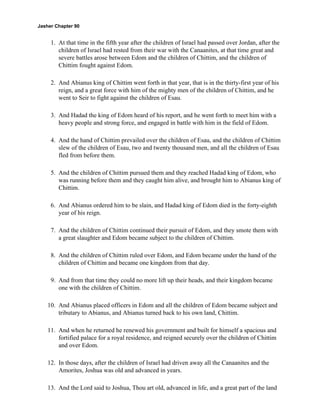
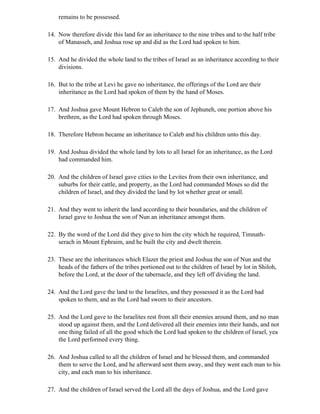
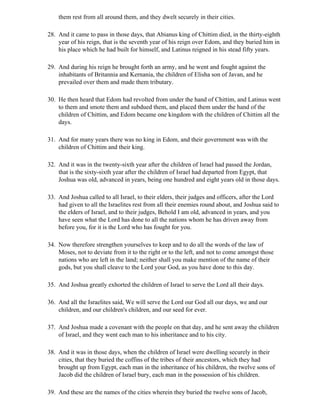
![whom the children of Israel had brought up from Egypt.
40. And they buried Reuben and Gad on this side Jordan, in Romia, which Moses had given
to their children.
41. And Simeon and Levi they buried in the city Mauda, which he had given to the children
of Simeon, and the suburb of the city was for the children of Levi.
42. And Judah they buried in the city of Benjamin opposite Bethlehem.
43. And the bones of Issachar and Zebulun they buried in Zidon, in the portion which fell to
their children.
44. And Dan was buried in the city of his children in Eshtael, and Naphtali and Asher they
buried in Kadesh-naphtali, each man in his place which he had given to his children.
45. And the bones of Joseph they buried in Shechem, in the part of the field which Jacob
had purchased from Hamor, and which became to Joseph for an inheritance.
46. And they buried Benjamin in Jerusalem opposite the Jebusite, which was given to the
children of Benjamin; the children of Israel buried their fathers each man in the city of
his children.
47. And at the end of two years, Joshua the son of Nun died, one hundred and ten years old,
and the time which Joshua judged Israel was twenty-eight years, and Israel served the
Lord all the days of his life.
48. And the other affairs of Joshua and his battles and his reproofs with which he reproved
Israel, and all which he had commanded them, and the names of the cities which the
children of Israel possessed in his days, behold they are written in the book of the words
of Joshua to the children of Israel, and in the book of the wars of the Lord, which Moses
and Joshua and the children of Israel had written.
49. And the children of Israel buried Joshua in the border of his inheritance, in Timnath-
serach, which was given to him in Mount Ephraim.
50. And Elazer the son of Aaron died in those days, and they buried him in a hill belonging
to Phineas his son, which was given him in Mount Ephraim.
Faithfully translated (1840) from the Original Hebrew into English. A Reprint of Photo
Lithographic Reprint of Exact Edition Published by J.H. Parry & Co., Salt Lake City: 1887]](https://image.slidesharecdn.com/jasher-101002213610-phpapp02/85/Jasher-403-320.jpg)
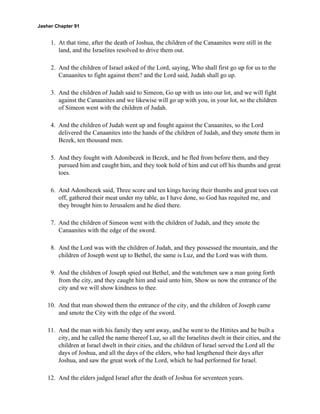
![13. And all the elders also fought the battles of Israel against the Canaanites and the Lord
drove the Canaanites from before the children of Israel, in order to place the Israelites in
their land.
14. And he accomplished all the words which he had spoken to Abraham, Isaac, and Jacob,
and the oath which he had sworn, to give to them and to their children, the land of the
Canaanites.
15. And the Lord gave to the children of Israel the whole land of Canaan, as he had sworn
to their ancestors, and the Lord gave them rest from those around them, and the children
of Israel dwelt securely in their cities.
16. Blessed be the Lord for ever, amen, and amen.
17. Strengthen yourselves, and let the hearts of all you that trust in the Lord be of good
courage.
THE END
Faithfully translated (1840) from the Original Hebrew into English. A Reprint of Photo
Lithographic Reprint of Exact Edition Published by J.H. Parry & Co., Salt Lake City: 1887]](https://image.slidesharecdn.com/jasher-101002213610-phpapp02/85/Jasher-405-320.jpg)